- java.lang.Object
-
- io.reactivex.Maybe<T>
-
- Type Parameters:
T- the value type
- All Implemented Interfaces:
- MaybeSource<T>
- Direct Known Subclasses:
- MaybeSubject
public abstract class Maybe<T> extends Object implements MaybeSource<T>
TheMaybeclass represents a deferred computation and emission of a single value, no value at all or an exception.The
Maybeclass implements theMaybeSourcebase interface and the default consumer type it interacts with is theMaybeObservervia thesubscribe(MaybeObserver)method.The
Maybeoperates with the following sequential protocol:onSubscribe (onSuccess | onError | onComplete)?Note that
onSuccess,onErrorandonCompleteare mutually exclusive events; unlikeObservable,onSuccessis never followed byonErrororonComplete.Like
Observable, a runningMaybecan be stopped through theDisposableinstance provided to consumers throughMaybeObserver.onSubscribe(io.reactivex.disposables.Disposable).Like an
Observable, aMaybeis lazy, can be either "hot" or "cold", synchronous or asynchronous.Maybeinstances returned by the methods of this class are cold and there is a standard hot implementation in the form of a subject:MaybeSubject.The documentation for this class makes use of marble diagrams. The following legend explains these diagrams:
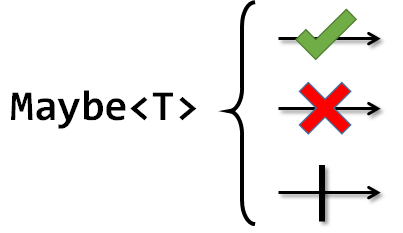
See
FlowableorObservablefor the implementation of the Reactive Pattern for a stream or vector of values.Example:
Disposable d = Maybe.just("Hello World") .delay(10, TimeUnit.SECONDS, Schedulers.io()) .subscribeWith(new DisposableMaybeObserver<String>() { @Override public void onStart() { System.out.println("Started"); } @Override public void onSuccess(String value) { System.out.println("Success: " + value); } @Override public void onError(Throwable error) { error.printStackTrace(); } @Override public void onComplete() { System.out.println("Done!"); } }); Thread.sleep(5000); d.dispose();Note that by design, subscriptions via
subscribe(MaybeObserver)can't be disposed from the outside (hence thevoidreturn of thesubscribe(MaybeObserver)method) and it is the responsibility of the implementor of theMaybeObserverto allow this to happen. RxJava supports such usage with the standardDisposableMaybeObserverinstance. For convenience, thesubscribeWith(MaybeObserver)method is provided as well to allow working with aMaybeObserver(or subclass) instance to be applied with in a fluent manner (such as in the example above).- Since:
- 2.0
- See Also:
DisposableMaybeObserver
-
-
Constructor Summary
Constructors Constructor and Description Maybe()
-
Method Summary
All Methods Static Methods Instance Methods Abstract Methods Concrete Methods Modifier and Type Method and Description static <T> Maybe<T>amb(Iterable<? extends MaybeSource<? extends T>> sources)Runs multiple MaybeSources and signals the events of the first one that signals (disposing the rest).static <T> Maybe<T>ambArray(MaybeSource<? extends T>... sources)Runs multiple MaybeSources and signals the events of the first one that signals (disposing the rest).Maybe<T>ambWith(MaybeSource<? extends T> other)Mirrors the MaybeSource (current or provided) that first signals an event.<R> Ras(MaybeConverter<T,? extends R> converter)Calls the specified converter function during assembly time and returns its resulting value.TblockingGet()Waits in a blocking fashion until the current Maybe signals a success value (which is returned), null if completed or an exception (which is propagated).TblockingGet(T defaultValue)Waits in a blocking fashion until the current Maybe signals a success value (which is returned), defaultValue if completed or an exception (which is propagated).Maybe<T>cache()Returns a Maybe that subscribes to this Maybe lazily, caches its event and replays it, to all the downstream subscribers.<U> Maybe<U>cast(Class<? extends U> clazz)Casts the success value of the current Maybe into the target type or signals a ClassCastException if not compatible.<R> Maybe<R>compose(MaybeTransformer<? super T,? extends R> transformer)Transform a Maybe by applying a particular Transformer function to it.static <T> Flowable<T>concat(Iterable<? extends MaybeSource<? extends T>> sources)Concatenate the single values, in a non-overlapping fashion, of the MaybeSource sources provided by an Iterable sequence.static <T> Flowable<T>concat(MaybeSource<? extends T> source1, MaybeSource<? extends T> source2)Returns a Flowable that emits the items emitted by two MaybeSources, one after the other.static <T> Flowable<T>concat(MaybeSource<? extends T> source1, MaybeSource<? extends T> source2, MaybeSource<? extends T> source3)Returns a Flowable that emits the items emitted by three MaybeSources, one after the other.static <T> Flowable<T>concat(MaybeSource<? extends T> source1, MaybeSource<? extends T> source2, MaybeSource<? extends T> source3, MaybeSource<? extends T> source4)Returns a Flowable that emits the items emitted by four MaybeSources, one after the other.static <T> Flowable<T>concat(Publisher<? extends MaybeSource<? extends T>> sources)Concatenate the single values, in a non-overlapping fashion, of the MaybeSource sources provided by a Publisher sequence.static <T> Flowable<T>concat(Publisher<? extends MaybeSource<? extends T>> sources, int prefetch)Concatenate the single values, in a non-overlapping fashion, of the MaybeSource sources provided by a Publisher sequence.static <T> Flowable<T>concatArray(MaybeSource<? extends T>... sources)Concatenate the single values, in a non-overlapping fashion, of the MaybeSource sources in the array.static <T> Flowable<T>concatArrayDelayError(MaybeSource<? extends T>... sources)Concatenates a variable number of MaybeSource sources and delays errors from any of them till all terminate.static <T> Flowable<T>concatArrayEager(MaybeSource<? extends T>... sources)Concatenates a sequence of MaybeSource eagerly into a single stream of values.static <T> Flowable<T>concatDelayError(Iterable<? extends MaybeSource<? extends T>> sources)Concatenates the Iterable sequence of MaybeSources into a single sequence by subscribing to each MaybeSource, one after the other, one at a time and delays any errors till the all inner MaybeSources terminate.static <T> Flowable<T>concatDelayError(Publisher<? extends MaybeSource<? extends T>> sources)Concatenates the Publisher sequence of Publishers into a single sequence by subscribing to each inner Publisher, one after the other, one at a time and delays any errors till the all inner and the outer Publishers terminate.static <T> Flowable<T>concatEager(Iterable<? extends MaybeSource<? extends T>> sources)Concatenates a sequence of MaybeSources eagerly into a single stream of values.static <T> Flowable<T>concatEager(Publisher<? extends MaybeSource<? extends T>> sources)Concatenates a Publisher sequence of MaybeSources eagerly into a single stream of values.<R> Maybe<R>concatMap(Function<? super T,? extends MaybeSource<? extends R>> mapper)Returns a Maybe that is based on applying a specified function to the item emitted by the source Maybe, where that function returns a MaybeSource.Flowable<T>concatWith(MaybeSource<? extends T> other)Returns a Flowable that emits the items emitted from the current MaybeSource, then the next, one after the other, without interleaving them.Single<Boolean>contains(Object item)Returns a Single that emits a Boolean that indicates whether the source Maybe emitted a specified item.Single<Long>count()Returns a Single that counts the total number of items emitted (0 or 1) by the source Maybe and emits this count as a 64-bit Long.static <T> Maybe<T>create(MaybeOnSubscribe<T> onSubscribe)Provides an API (via a cold Maybe) that bridges the reactive world with the callback-style world.Maybe<T>defaultIfEmpty(T defaultItem)Returns a Maybe that emits the item emitted by the source Maybe or a specified default item if the source Maybe is empty.static <T> Maybe<T>defer(Callable<? extends MaybeSource<? extends T>> maybeSupplier)Calls a Callable for each individual MaybeObserver to return the actual MaybeSource source to be subscribed to.Maybe<T>delay(long delay, TimeUnit unit)Returns a Maybe that signals the events emitted by the source Maybe shifted forward in time by a specified delay.Maybe<T>delay(long delay, TimeUnit unit, Scheduler scheduler)Returns a Maybe that signals the events emitted by the source Maybe shifted forward in time by a specified delay running on the specified Scheduler.<U,V> Maybe<T>delay(Publisher<U> delayIndicator)Delays the emission of this Maybe until the given Publisher signals an item or completes.Maybe<T>delaySubscription(long delay, TimeUnit unit)Returns a Maybe that delays the subscription to the source Maybe by a given amount of time.Maybe<T>delaySubscription(long delay, TimeUnit unit, Scheduler scheduler)Returns a Maybe that delays the subscription to the source Maybe by a given amount of time, both waiting and subscribing on a given Scheduler.<U> Maybe<T>delaySubscription(Publisher<U> subscriptionIndicator)Returns a Maybe that delays the subscription to this Maybe until the other Publisher emits an element or completes normally.Maybe<T>doAfterSuccess(Consumer<? super T> onAfterSuccess)Calls the specified consumer with the success item after this item has been emitted to the downstream.Maybe<T>doAfterTerminate(Action onAfterTerminate)Maybe<T>doFinally(Action onFinally)Calls the specified action after this Maybe signals onSuccess, onError or onComplete or gets disposed by the downstream.Maybe<T>doOnComplete(Action onComplete)Modifies the source Maybe so that it invokes an action when it callsonComplete.Maybe<T>doOnDispose(Action onDispose)Calls the sharedActionif a MaybeObserver subscribed to the current Maybe disposes the common Disposable it received via onSubscribe.Maybe<T>doOnError(Consumer<? super Throwable> onError)Calls the shared consumer with the error sent via onError for each MaybeObserver that subscribes to the current Maybe.Maybe<T>doOnEvent(BiConsumer<? super T,? super Throwable> onEvent)Calls the given onEvent callback with the (success value, null) for an onSuccess, (null, throwable) for an onError or (null, null) for an onComplete signal from this Maybe before delivering said signal to the downstream.Maybe<T>doOnSubscribe(Consumer<? super Disposable> onSubscribe)Calls the shared consumer with the Disposable sent through the onSubscribe for each MaybeObserver that subscribes to the current Maybe.Maybe<T>doOnSuccess(Consumer<? super T> onSuccess)Calls the shared consumer with the success value sent via onSuccess for each MaybeObserver that subscribes to the current Maybe.Maybe<T>doOnTerminate(Action onTerminate)Returns a Maybe instance that calls the given onTerminate callback just before this Maybe completes normally or with an exception.static <T> Maybe<T>empty()Returns a (singleton) Maybe instance that callsonCompleteimmediately.static <T> Maybe<T>error(Callable<? extends Throwable> supplier)Returns a Maybe that invokes aMaybeObserver'sonErrormethod when the MaybeObserver subscribes to it.static <T> Maybe<T>error(Throwable exception)Returns a Maybe that invokes a subscriber'sonErrormethod when the subscriber subscribes to it.Maybe<T>filter(Predicate<? super T> predicate)Filters the success item of the Maybe via a predicate function and emitting it if the predicate returns true, completing otherwise.<R> Maybe<R>flatMap(Function<? super T,? extends MaybeSource<? extends R>> mapper)Returns a Maybe that is based on applying a specified function to the item emitted by the source Maybe, where that function returns a MaybeSource.<R> Maybe<R>flatMap(Function<? super T,? extends MaybeSource<? extends R>> onSuccessMapper, Function<? super Throwable,? extends MaybeSource<? extends R>> onErrorMapper, Callable<? extends MaybeSource<? extends R>> onCompleteSupplier)Maps the onSuccess, onError or onComplete signals of this Maybe into MaybeSource and emits that MaybeSource's signals.<U,R> Maybe<R>flatMap(Function<? super T,? extends MaybeSource<? extends U>> mapper, BiFunction<? super T,? super U,? extends R> resultSelector)Returns a Maybe that emits the results of a specified function to the pair of values emitted by the source Maybe and a specified mapped MaybeSource.CompletableflatMapCompletable(Function<? super T,? extends CompletableSource> mapper)Returns aCompletablethat completes based on applying a specified function to the item emitted by the sourceMaybe, where that function returns aCompletable.<R> Observable<R>flatMapObservable(Function<? super T,? extends ObservableSource<? extends R>> mapper)Returns an Observable that is based on applying a specified function to the item emitted by the source Maybe, where that function returns an ObservableSource.<R> Flowable<R>flatMapPublisher(Function<? super T,? extends Publisher<? extends R>> mapper)Returns a Flowable that emits items based on applying a specified function to the item emitted by the source Maybe, where that function returns a Publisher.<R> Single<R>flatMapSingle(Function<? super T,? extends SingleSource<? extends R>> mapper)<R> Maybe<R>flatMapSingleElement(Function<? super T,? extends SingleSource<? extends R>> mapper)<U> Flowable<U>flattenAsFlowable(Function<? super T,? extends Iterable<? extends U>> mapper)<U> Observable<U>flattenAsObservable(Function<? super T,? extends Iterable<? extends U>> mapper)Maps the success value of the upstreamMaybeinto anIterableand emits its items as anObservablesequence.static <T> Maybe<T>fromAction(Action run)Returns a Maybe instance that runs the given Action for each subscriber and emits either its exception or simply completes.static <T> Maybe<T>fromCallable(Callable<? extends T> callable)Returns aMaybethat invokes the givenCallablefor each individualMaybeObserverthat subscribes and emits the resulting non-null item viaonSuccesswhile considering anullresult from theCallableas indication for valueless completion viaonComplete.static <T> Maybe<T>fromCompletable(CompletableSource completableSource)Wraps a CompletableSource into a Maybe.static <T> Maybe<T>fromFuture(Future<? extends T> future)Converts aFutureinto a Maybe, treating a null result as an indication of emptiness.static <T> Maybe<T>fromFuture(Future<? extends T> future, long timeout, TimeUnit unit)Converts aFutureinto a Maybe, with a timeout on the Future.static <T> Maybe<T>fromRunnable(Runnable run)Returns a Maybe instance that runs the given Action for each subscriber and emits either its exception or simply completes.static <T> Maybe<T>fromSingle(SingleSource<T> singleSource)Wraps a SingleSource into a Maybe.Maybe<T>hide()Hides the identity of this Maybe and its Disposable.CompletableignoreElement()Ignores the item emitted by the source Maybe and only callsonCompleteoronError.Single<Boolean>isEmpty()Returns a Single that emitstrueif the source Maybe is empty, otherwisefalse.static <T> Maybe<T>just(T item)Returns aMaybethat emits a specified item.<R> Maybe<R>lift(MaybeOperator<? extends R,? super T> lift)This method requires advanced knowledge about building operators, please consider other standard composition methods first; Returns aMaybewhich, when subscribed to, invokes theapply(MaybeObserver)method of the providedMaybeOperatorfor each individual downstreamMaybeand allows the insertion of a custom operator by accessing the downstream'sMaybeObserverduring this subscription phase and providing a newMaybeObserver, containing the custom operator's intended business logic, that will be used in the subscription process going further upstream.<R> Maybe<R>map(Function<? super T,? extends R> mapper)Returns a Maybe that applies a specified function to the item emitted by the source Maybe and emits the result of this function application.Single<Notification<T>>materialize()Maps the signal types of this Maybe into aNotificationof the same kind and emits it as a single success value to downstream.static <T> Flowable<T>merge(Iterable<? extends MaybeSource<? extends T>> sources)Merges an Iterable sequence of MaybeSource instances into a single Flowable sequence, running all MaybeSources at once.static <T> Maybe<T>merge(MaybeSource<? extends MaybeSource<? extends T>> source)Flattens aMaybeSourcethat emits aMaybeSourceinto a singleMaybeSourcethat emits the item emitted by the nestedMaybeSource, without any transformation.static <T> Flowable<T>merge(MaybeSource<? extends T> source1, MaybeSource<? extends T> source2)Flattens two MaybeSources into a single Flowable, without any transformation.static <T> Flowable<T>merge(MaybeSource<? extends T> source1, MaybeSource<? extends T> source2, MaybeSource<? extends T> source3)Flattens three MaybeSources into a single Flowable, without any transformation.static <T> Flowable<T>merge(MaybeSource<? extends T> source1, MaybeSource<? extends T> source2, MaybeSource<? extends T> source3, MaybeSource<? extends T> source4)Flattens four MaybeSources into a single Flowable, without any transformation.static <T> Flowable<T>merge(Publisher<? extends MaybeSource<? extends T>> sources)Merges a Flowable sequence of MaybeSource instances into a single Flowable sequence, running all MaybeSources at once.static <T> Flowable<T>merge(Publisher<? extends MaybeSource<? extends T>> sources, int maxConcurrency)Merges a Flowable sequence of MaybeSource instances into a single Flowable sequence, running at most maxConcurrency MaybeSources at once.static <T> Flowable<T>mergeArray(MaybeSource<? extends T>... sources)Merges an array sequence of MaybeSource instances into a single Flowable sequence, running all MaybeSources at once.static <T> Flowable<T>mergeArrayDelayError(MaybeSource<? extends T>... sources)Flattens an array of MaybeSources into one Flowable, in a way that allows a Subscriber to receive all successfully emitted items from each of the source MaybeSources without being interrupted by an error notification from one of them.static <T> Flowable<T>mergeDelayError(Iterable<? extends MaybeSource<? extends T>> sources)Flattens an Iterable of MaybeSources into one Flowable, in a way that allows a Subscriber to receive all successfully emitted items from each of the source MaybeSources without being interrupted by an error notification from one of them.static <T> Flowable<T>mergeDelayError(MaybeSource<? extends T> source1, MaybeSource<? extends T> source2)Flattens two MaybeSources into one Flowable, in a way that allows a Subscriber to receive all successfully emitted items from each of the source MaybeSources without being interrupted by an error notification from one of them.static <T> Flowable<T>mergeDelayError(MaybeSource<? extends T> source1, MaybeSource<? extends T> source2, MaybeSource<? extends T> source3)Flattens three MaybeSource into one Flowable, in a way that allows a Subscriber to receive all successfully emitted items from all of the source MaybeSources without being interrupted by an error notification from one of them.static <T> Flowable<T>mergeDelayError(MaybeSource<? extends T> source1, MaybeSource<? extends T> source2, MaybeSource<? extends T> source3, MaybeSource<? extends T> source4)Flattens four MaybeSources into one Flowable, in a way that allows a Subscriber to receive all successfully emitted items from all of the source MaybeSources without being interrupted by an error notification from one of them.static <T> Flowable<T>mergeDelayError(Publisher<? extends MaybeSource<? extends T>> sources)Flattens a Publisher that emits MaybeSources into one Publisher, in a way that allows a Subscriber to receive all successfully emitted items from all of the source MaybeSources without being interrupted by an error notification from one of them or even the main Publisher.static <T> Flowable<T>mergeDelayError(Publisher<? extends MaybeSource<? extends T>> sources, int maxConcurrency)Flattens a Publisher that emits MaybeSources into one Publisher, in a way that allows a Subscriber to receive all successfully emitted items from all of the source MaybeSources without being interrupted by an error notification from one of them or even the main Publisher as well as limiting the total number of active MaybeSources.Flowable<T>mergeWith(MaybeSource<? extends T> other)Flattens this and another Maybe into a single Flowable, without any transformation.static <T> Maybe<T>never()Returns a Maybe that never sends any items or notifications to aMaybeObserver.Maybe<T>observeOn(Scheduler scheduler)Wraps a Maybe to emit its item (or notify of its error) on a specifiedScheduler, asynchronously.<U> Maybe<U>ofType(Class<U> clazz)Filters the items emitted by a Maybe, only emitting its success value if that is an instance of the supplied Class.Maybe<T>onErrorComplete()Returns a Maybe instance that if this Maybe emits an error, it will emit an onComplete and swallow the throwable.Maybe<T>onErrorComplete(Predicate<? super Throwable> predicate)Returns a Maybe instance that if this Maybe emits an error and the predicate returns true, it will emit an onComplete and swallow the throwable.Maybe<T>onErrorResumeNext(Function<? super Throwable,? extends MaybeSource<? extends T>> resumeFunction)Instructs a Maybe to pass control to another Maybe rather than invokingonErrorif it encounters an error.Maybe<T>onErrorResumeNext(MaybeSource<? extends T> next)Instructs a Maybe to pass control to anotherMaybeSourcerather than invokingonErrorif it encounters an error.Maybe<T>onErrorReturn(Function<? super Throwable,? extends T> valueSupplier)Instructs a Maybe to emit an item (returned by a specified function) rather than invokingonErrorif it encounters an error.Maybe<T>onErrorReturnItem(T item)Instructs a Maybe to emit an item (returned by a specified function) rather than invokingonErrorif it encounters an error.Maybe<T>onExceptionResumeNext(MaybeSource<? extends T> next)Maybe<T>onTerminateDetach()Nulls out references to the upstream producer and downstream MaybeObserver if the sequence is terminated or downstream calls dispose().Flowable<T>repeat()Returns a Flowable that repeats the sequence of items emitted by the source Maybe indefinitely.Flowable<T>repeat(long times)Returns a Flowable that repeats the sequence of items emitted by the source Maybe at mostcounttimes.Flowable<T>repeatUntil(BooleanSupplier stop)Returns a Flowable that repeats the sequence of items emitted by the source Maybe until the provided stop function returns true.Flowable<T>repeatWhen(Function<? super Flowable<Object>,? extends Publisher<?>> handler)Returns a Flowable that emits the same values as the source Publisher with the exception of anonComplete.Maybe<T>retry()Returns a Maybe that mirrors the source Maybe, resubscribing to it if it callsonError(infinite retry count).Maybe<T>retry(BiPredicate<? super Integer,? super Throwable> predicate)Returns a Maybe that mirrors the source Maybe, resubscribing to it if it callsonErrorand the predicate returns true for that specific exception and retry count.Maybe<T>retry(long count)Returns a Maybe that mirrors the source Maybe, resubscribing to it if it callsonErrorup to a specified number of retries.Maybe<T>retry(long times, Predicate<? super Throwable> predicate)Retries at most times or until the predicate returns false, whichever happens first.Maybe<T>retry(Predicate<? super Throwable> predicate)Retries the current Maybe if it fails and the predicate returns true.Maybe<T>retryUntil(BooleanSupplier stop)Retries until the given stop function returns true.Maybe<T>retryWhen(Function<? super Flowable<Throwable>,? extends Publisher<?>> handler)Returns a Maybe that emits the same values as the source Maybe with the exception of anonError.static <T> Single<Boolean>sequenceEqual(MaybeSource<? extends T> source1, MaybeSource<? extends T> source2)Returns a Single that emits a Boolean value that indicates whether two MaybeSource sequences are the same by comparing the items emitted by each MaybeSource pairwise.static <T> Single<Boolean>sequenceEqual(MaybeSource<? extends T> source1, MaybeSource<? extends T> source2, BiPredicate<? super T,? super T> isEqual)Returns a Single that emits a Boolean value that indicates whether two MaybeSources are the same by comparing the items emitted by each MaybeSource pairwise based on the results of a specified equality function.Disposablesubscribe()Subscribes to a Maybe and ignoresonSuccessandonCompleteemissions.Disposablesubscribe(Consumer<? super T> onSuccess)Subscribes to a Maybe and provides a callback to handle the items it emits.Disposablesubscribe(Consumer<? super T> onSuccess, Consumer<? super Throwable> onError)Subscribes to a Maybe and provides callbacks to handle the items it emits and any error notification it issues.Disposablesubscribe(Consumer<? super T> onSuccess, Consumer<? super Throwable> onError, Action onComplete)Subscribes to a Maybe and provides callbacks to handle the items it emits and any error or completion notification it issues.voidsubscribe(MaybeObserver<? super T> observer)Subscribes the given MaybeObserver to this MaybeSource instance.protected abstract voidsubscribeActual(MaybeObserver<? super T> observer)Implement this method in subclasses to handle the incomingMaybeObservers.Maybe<T>subscribeOn(Scheduler scheduler)Asynchronously subscribes subscribers to this Maybe on the specifiedScheduler.<E extends MaybeObserver<? super T>>
EsubscribeWith(E observer)Subscribes a given MaybeObserver (subclass) to this Maybe and returns the given MaybeObserver as is.Maybe<T>switchIfEmpty(MaybeSource<? extends T> other)Returns a Maybe that emits the items emitted by the source Maybe or the items of an alternate MaybeSource if the current Maybe is empty.Single<T>switchIfEmpty(SingleSource<? extends T> other)Returns a Single that emits the items emitted by the source Maybe or the item of an alternate SingleSource if the current Maybe is empty.<U> Maybe<T>takeUntil(MaybeSource<U> other)Returns a Maybe that emits the items emitted by the source Maybe until a second MaybeSource emits an item.<U> Maybe<T>takeUntil(Publisher<U> other)Returns a Maybe that emits the item emitted by the source Maybe until a second Publisher emits an item.TestObserver<T>test()Creates a TestObserver and subscribes it to this Maybe.TestObserver<T>test(boolean cancelled)Creates a TestObserver optionally in cancelled state, then subscribes it to this Maybe.Maybe<T>timeout(long timeout, TimeUnit timeUnit)Returns a Maybe that mirrors the source Maybe but applies a timeout policy for each emitted item.Maybe<T>timeout(long timeout, TimeUnit timeUnit, MaybeSource<? extends T> fallback)Returns a Maybe that mirrors the source Maybe but applies a timeout policy for each emitted item.Maybe<T>timeout(long timeout, TimeUnit timeUnit, Scheduler scheduler)Returns a Maybe that mirrors the source Maybe but applies a timeout policy for each emitted item, where this policy is governed on a specified Scheduler.Maybe<T>timeout(long timeout, TimeUnit timeUnit, Scheduler scheduler, MaybeSource<? extends T> fallback)Returns a Maybe that mirrors the source Maybe but applies a timeout policy for each emitted item using a specified Scheduler.<U> Maybe<T>timeout(MaybeSource<U> timeoutIndicator)If the currentMaybedidn't signal an event before thetimeoutIndicatorMaybeSourcesignals, aTimeoutExceptionis signaled instead.<U> Maybe<T>timeout(MaybeSource<U> timeoutIndicator, MaybeSource<? extends T> fallback)If the currentMaybedidn't signal an event before thetimeoutIndicatorMaybeSourcesignals, the currentMaybeis disposed and thefallbackMaybeSourcesubscribed to as a continuation.<U> Maybe<T>timeout(Publisher<U> timeoutIndicator)If the currentMaybesource didn't signal an event before thetimeoutIndicatorPublishersignals, aTimeoutExceptionis signaled instead.<U> Maybe<T>timeout(Publisher<U> timeoutIndicator, MaybeSource<? extends T> fallback)If the currentMaybedidn't signal an event before thetimeoutIndicatorPublishersignals, the currentMaybeis disposed and thefallbackMaybeSourcesubscribed to as a continuation.static Maybe<Long>timer(long delay, TimeUnit unit)Returns a Maybe that emits0Lafter a specified delay.static Maybe<Long>timer(long delay, TimeUnit unit, Scheduler scheduler)Returns a Maybe that emits0Lafter a specified delay on a specified Scheduler.<R> Rto(Function<? super Maybe<T>,R> convert)Calls the specified converter function with the current Maybe instance during assembly time and returns its result.Flowable<T>toFlowable()Converts this Maybe into a backpressure-aware Flowable instance composing cancellation through.Observable<T>toObservable()Converts this Maybe into an Observable instance composing disposal through.Single<T>toSingle()Converts this Maybe into a Single instance composing disposal through and turning an empty Maybe into a signal of NoSuchElementException.Single<T>toSingle(T defaultValue)Converts this Maybe into a Single instance composing disposal through and turning an empty Maybe into a Single that emits the given value through onSuccess.static <T> Maybe<T>unsafeCreate(MaybeSource<T> onSubscribe)Advanced use only: creates a Maybe instance without any safeguards by using a callback that is called with a MaybeObserver.Maybe<T>unsubscribeOn(Scheduler scheduler)Returns a Maybe which makes sure when a MaybeObserver disposes the Disposable, that call is propagated up on the specified scheduler.static <T,D> Maybe<T>using(Callable<? extends D> resourceSupplier, Function<? super D,? extends MaybeSource<? extends T>> sourceSupplier, Consumer<? super D> resourceDisposer)Constructs a Maybe that creates a dependent resource object which is disposed of when the upstream terminates or the downstream calls dispose().static <T,D> Maybe<T>using(Callable<? extends D> resourceSupplier, Function<? super D,? extends MaybeSource<? extends T>> sourceSupplier, Consumer<? super D> resourceDisposer, boolean eager)Constructs a Maybe that creates a dependent resource object which is disposed of just before termination if you have setdisposeEagerlytotrueand a downstream dispose() does not occur before termination.static <T> Maybe<T>wrap(MaybeSource<T> source)Wraps a MaybeSource instance into a new Maybe instance if not already a Maybe instance.static <T,R> Maybe<R>zip(Iterable<? extends MaybeSource<? extends T>> sources, Function<? super Object[],? extends R> zipper)Returns a Maybe that emits the results of a specified combiner function applied to combinations of items emitted, in sequence, by an Iterable of other MaybeSources.static <T1,T2,R> Maybe<R>zip(MaybeSource<? extends T1> source1, MaybeSource<? extends T2> source2, BiFunction<? super T1,? super T2,? extends R> zipper)Returns a Maybe that emits the results of a specified combiner function applied to combinations of two items emitted, in sequence, by two other MaybeSources.static <T1,T2,T3,R>
Maybe<R>zip(MaybeSource<? extends T1> source1, MaybeSource<? extends T2> source2, MaybeSource<? extends T3> source3, Function3<? super T1,? super T2,? super T3,? extends R> zipper)Returns a Maybe that emits the results of a specified combiner function applied to combinations of three items emitted, in sequence, by three other MaybeSources.static <T1,T2,T3,T4,R>
Maybe<R>zip(MaybeSource<? extends T1> source1, MaybeSource<? extends T2> source2, MaybeSource<? extends T3> source3, MaybeSource<? extends T4> source4, Function4<? super T1,? super T2,? super T3,? super T4,? extends R> zipper)Returns a Maybe that emits the results of a specified combiner function applied to combinations of four items emitted, in sequence, by four other MaybeSources.static <T1,T2,T3,T4,T5,R>
Maybe<R>zip(MaybeSource<? extends T1> source1, MaybeSource<? extends T2> source2, MaybeSource<? extends T3> source3, MaybeSource<? extends T4> source4, MaybeSource<? extends T5> source5, Function5<? super T1,? super T2,? super T3,? super T4,? super T5,? extends R> zipper)Returns a Maybe that emits the results of a specified combiner function applied to combinations of five items emitted, in sequence, by five other MaybeSources.static <T1,T2,T3,T4,T5,T6,R>
Maybe<R>zip(MaybeSource<? extends T1> source1, MaybeSource<? extends T2> source2, MaybeSource<? extends T3> source3, MaybeSource<? extends T4> source4, MaybeSource<? extends T5> source5, MaybeSource<? extends T6> source6, Function6<? super T1,? super T2,? super T3,? super T4,? super T5,? super T6,? extends R> zipper)Returns a Maybe that emits the results of a specified combiner function applied to combinations of six items emitted, in sequence, by six other MaybeSources.static <T1,T2,T3,T4,T5,T6,T7,R>
Maybe<R>zip(MaybeSource<? extends T1> source1, MaybeSource<? extends T2> source2, MaybeSource<? extends T3> source3, MaybeSource<? extends T4> source4, MaybeSource<? extends T5> source5, MaybeSource<? extends T6> source6, MaybeSource<? extends T7> source7, Function7<? super T1,? super T2,? super T3,? super T4,? super T5,? super T6,? super T7,? extends R> zipper)Returns a Maybe that emits the results of a specified combiner function applied to combinations of seven items emitted, in sequence, by seven other MaybeSources.static <T1,T2,T3,T4,T5,T6,T7,T8,R>
Maybe<R>zip(MaybeSource<? extends T1> source1, MaybeSource<? extends T2> source2, MaybeSource<? extends T3> source3, MaybeSource<? extends T4> source4, MaybeSource<? extends T5> source5, MaybeSource<? extends T6> source6, MaybeSource<? extends T7> source7, MaybeSource<? extends T8> source8, Function8<? super T1,? super T2,? super T3,? super T4,? super T5,? super T6,? super T7,? super T8,? extends R> zipper)Returns a Maybe that emits the results of a specified combiner function applied to combinations of eight items emitted, in sequence, by eight other MaybeSources.static <T1,T2,T3,T4,T5,T6,T7,T8,T9,R>
Maybe<R>zip(MaybeSource<? extends T1> source1, MaybeSource<? extends T2> source2, MaybeSource<? extends T3> source3, MaybeSource<? extends T4> source4, MaybeSource<? extends T5> source5, MaybeSource<? extends T6> source6, MaybeSource<? extends T7> source7, MaybeSource<? extends T8> source8, MaybeSource<? extends T9> source9, Function9<? super T1,? super T2,? super T3,? super T4,? super T5,? super T6,? super T7,? super T8,? super T9,? extends R> zipper)Returns a Maybe that emits the results of a specified combiner function applied to combinations of nine items emitted, in sequence, by nine other MaybeSources.static <T,R> Maybe<R>zipArray(Function<? super Object[],? extends R> zipper, MaybeSource<? extends T>... sources)Returns a Maybe that emits the results of a specified combiner function applied to combinations of items emitted, in sequence, by an array of other MaybeSources.<U,R> Maybe<R>zipWith(MaybeSource<? extends U> other, BiFunction<? super T,? super U,? extends R> zipper)Waits until this and the other MaybeSource signal a success value then applies the given BiFunction to those values and emits the BiFunction's resulting value to downstream.
-
-
-
Method Detail
-
amb
@CheckReturnValue @NonNull @SchedulerSupport(value="none") public static <T> Maybe<T> amb(Iterable<? extends MaybeSource<? extends T>> sources)
Runs multiple MaybeSources and signals the events of the first one that signals (disposing the rest).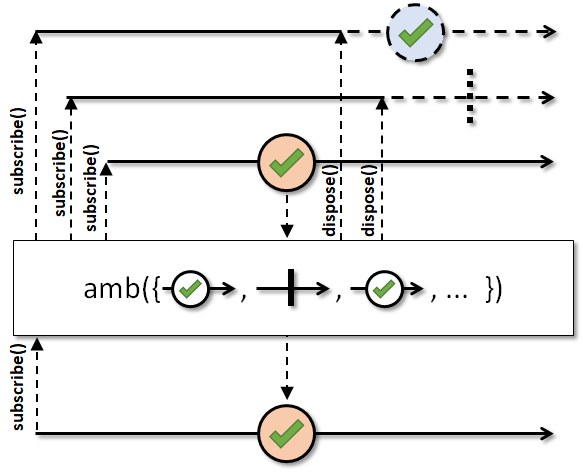
- Scheduler:
ambdoes not operate by default on a particularScheduler.
- Type Parameters:
T- the value type- Parameters:
sources- the Iterable sequence of sources. A subscription to each source will occur in the same order as in the Iterable.- Returns:
- the new Maybe instance
-
ambArray
@CheckReturnValue @SchedulerSupport(value="none") public static <T> Maybe<T> ambArray(MaybeSource<? extends T>... sources)
Runs multiple MaybeSources and signals the events of the first one that signals (disposing the rest).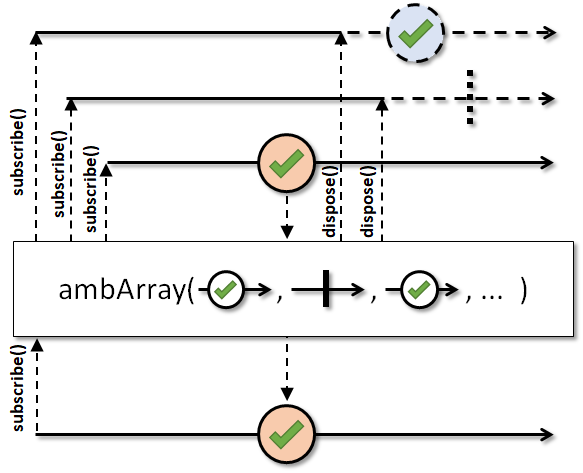
- Scheduler:
ambArraydoes not operate by default on a particularScheduler.
- Type Parameters:
T- the value type- Parameters:
sources- the array of sources. A subscription to each source will occur in the same order as in the array.- Returns:
- the new Maybe instance
-
concat
@BackpressureSupport(value=FULL) @CheckReturnValue @NonNull @SchedulerSupport(value="none") public static <T> Flowable<T> concat(Iterable<? extends MaybeSource<? extends T>> sources)
Concatenate the single values, in a non-overlapping fashion, of the MaybeSource sources provided by an Iterable sequence.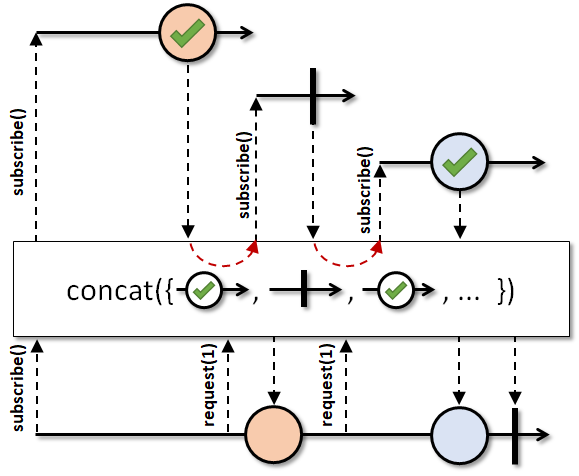
- Backpressure:
- The returned
Flowablehonors the backpressure of the downstream consumer. - Scheduler:
concatdoes not operate by default on a particularScheduler.
- Type Parameters:
T- the value type- Parameters:
sources- the Iterable sequence of MaybeSource instances- Returns:
- the new Flowable instance
-
concat
@BackpressureSupport(value=FULL) @CheckReturnValue @NonNull @SchedulerSupport(value="none") public static <T> Flowable<T> concat(MaybeSource<? extends T> source1, MaybeSource<? extends T> source2)
Returns a Flowable that emits the items emitted by two MaybeSources, one after the other.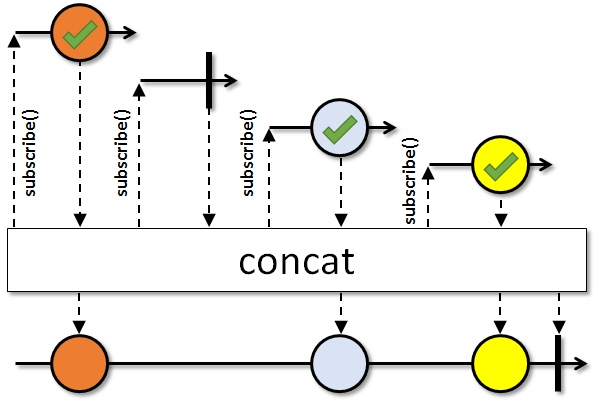
- Backpressure:
- The returned
Flowablehonors the backpressure of the downstream consumer. - Scheduler:
concatdoes not operate by default on a particularScheduler.
- Type Parameters:
T- the common value type- Parameters:
source1- a MaybeSource to be concatenatedsource2- a MaybeSource to be concatenated- Returns:
- a Flowable that emits items emitted by the two source MaybeSources, one after the other.
- See Also:
- ReactiveX operators documentation: Concat
-
concat
@BackpressureSupport(value=FULL) @CheckReturnValue @NonNull @SchedulerSupport(value="none") public static <T> Flowable<T> concat(MaybeSource<? extends T> source1, MaybeSource<? extends T> source2, MaybeSource<? extends T> source3)
Returns a Flowable that emits the items emitted by three MaybeSources, one after the other.
- Backpressure:
- The returned
Flowablehonors the backpressure of the downstream consumer. - Scheduler:
concatdoes not operate by default on a particularScheduler.
- Type Parameters:
T- the common value type- Parameters:
source1- a MaybeSource to be concatenatedsource2- a MaybeSource to be concatenatedsource3- a MaybeSource to be concatenated- Returns:
- a Flowable that emits items emitted by the three source MaybeSources, one after the other.
- See Also:
- ReactiveX operators documentation: Concat
-
concat
@BackpressureSupport(value=FULL) @CheckReturnValue @NonNull @SchedulerSupport(value="none") public static <T> Flowable<T> concat(MaybeSource<? extends T> source1, MaybeSource<? extends T> source2, MaybeSource<? extends T> source3, MaybeSource<? extends T> source4)
Returns a Flowable that emits the items emitted by four MaybeSources, one after the other.
- Backpressure:
- The returned
Flowablehonors the backpressure of the downstream consumer. - Scheduler:
concatdoes not operate by default on a particularScheduler.
- Type Parameters:
T- the common value type- Parameters:
source1- a MaybeSource to be concatenatedsource2- a MaybeSource to be concatenatedsource3- a MaybeSource to be concatenatedsource4- a MaybeSource to be concatenated- Returns:
- a Flowable that emits items emitted by the four source MaybeSources, one after the other.
- See Also:
- ReactiveX operators documentation: Concat
-
concat
@BackpressureSupport(value=FULL) @CheckReturnValue @SchedulerSupport(value="none") public static <T> Flowable<T> concat(Publisher<? extends MaybeSource<? extends T>> sources)
Concatenate the single values, in a non-overlapping fashion, of the MaybeSource sources provided by a Publisher sequence.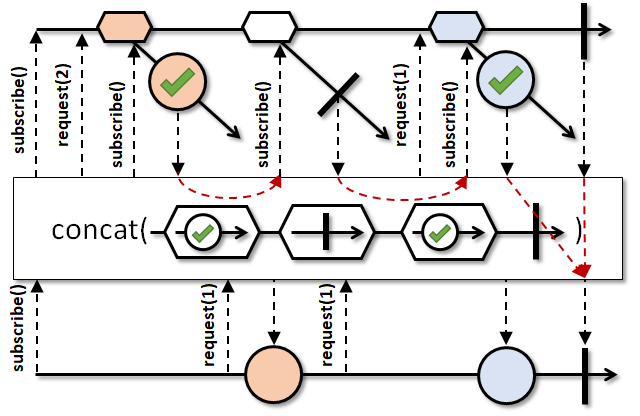
- Backpressure:
- The returned
Flowablehonors the backpressure of the downstream consumer and expects thePublisherto honor backpressure as well. If the sourcesPublisherviolates this, aMissingBackpressureExceptionis signalled. - Scheduler:
concatdoes not operate by default on a particularScheduler.
- Type Parameters:
T- the value type- Parameters:
sources- the Publisher of MaybeSource instances- Returns:
- the new Flowable instance
-
concat
@BackpressureSupport(value=FULL) @CheckReturnValue @NonNull @SchedulerSupport(value="none") public static <T> Flowable<T> concat(Publisher<? extends MaybeSource<? extends T>> sources, int prefetch)
Concatenate the single values, in a non-overlapping fashion, of the MaybeSource sources provided by a Publisher sequence.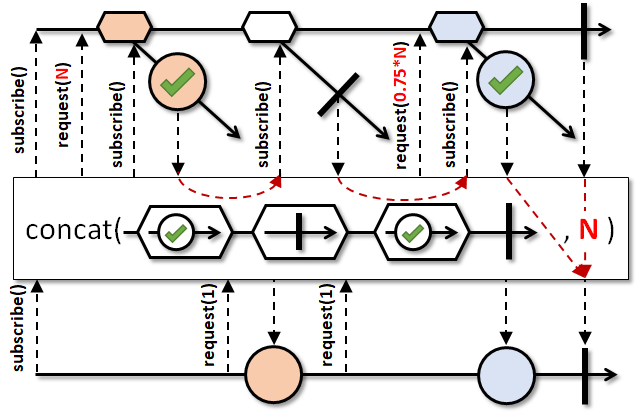
- Backpressure:
- The returned
Flowablehonors the backpressure of the downstream consumer and expects thePublisherto honor backpressure as well. If the sourcesPublisherviolates this, aMissingBackpressureExceptionis signalled. - Scheduler:
concatdoes not operate by default on a particularScheduler.
- Type Parameters:
T- the value type- Parameters:
sources- the Publisher of MaybeSource instancesprefetch- the number of MaybeSources to prefetch from the Publisher- Returns:
- the new Flowable instance
-
concatArray
@BackpressureSupport(value=FULL) @CheckReturnValue @NonNull @SchedulerSupport(value="none") public static <T> Flowable<T> concatArray(MaybeSource<? extends T>... sources)
Concatenate the single values, in a non-overlapping fashion, of the MaybeSource sources in the array.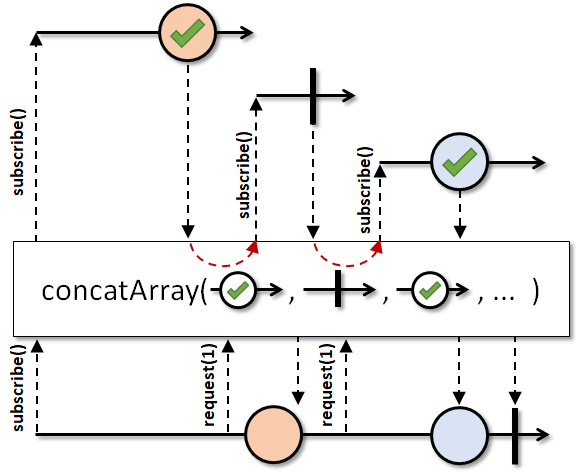
- Backpressure:
- The returned
Flowablehonors the backpressure of the downstream consumer. - Scheduler:
concatArraydoes not operate by default on a particularScheduler.
- Type Parameters:
T- the value type- Parameters:
sources- the array of MaybeSource instances- Returns:
- the new Flowable instance
-
concatArrayDelayError
@BackpressureSupport(value=FULL) @CheckReturnValue @SchedulerSupport(value="none") public static <T> Flowable<T> concatArrayDelayError(MaybeSource<? extends T>... sources)
Concatenates a variable number of MaybeSource sources and delays errors from any of them till all terminate.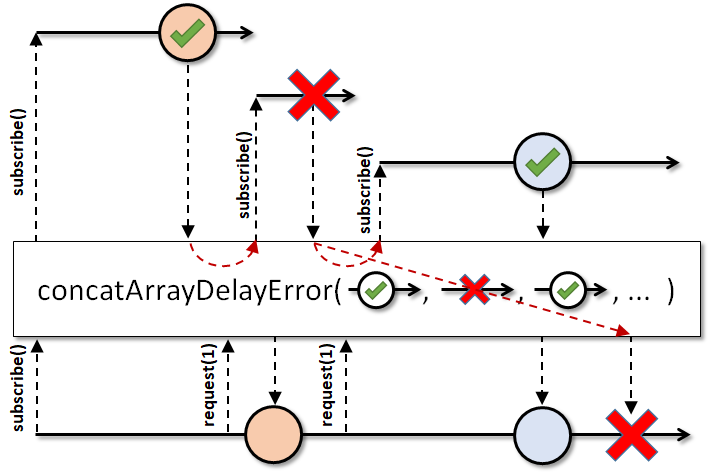
- Backpressure:
- The operator honors backpressure from downstream.
- Scheduler:
concatArrayDelayErrordoes not operate by default on a particularScheduler.
- Type Parameters:
T- the common base value type- Parameters:
sources- the array of sources- Returns:
- the new Flowable instance
- Throws:
NullPointerException- if sources is null
-
concatArrayEager
@BackpressureSupport(value=FULL) @CheckReturnValue @SchedulerSupport(value="none") public static <T> Flowable<T> concatArrayEager(MaybeSource<? extends T>... sources)
Concatenates a sequence of MaybeSource eagerly into a single stream of values.Eager concatenation means that once a subscriber subscribes, this operator subscribes to all of the source MaybeSources. The operator buffers the value emitted by these MaybeSources and then drains them in order, each one after the previous one completes.
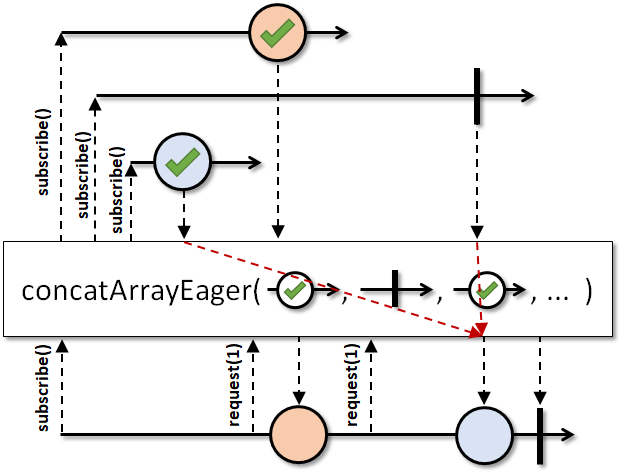
- Backpressure:
- The operator honors backpressure from downstream.
- Scheduler:
- This method does not operate by default on a particular
Scheduler.
- Type Parameters:
T- the value type- Parameters:
sources- a sequence of MaybeSources that need to be eagerly concatenated- Returns:
- the new Flowable instance with the specified concatenation behavior
-
concatDelayError
@BackpressureSupport(value=FULL) @CheckReturnValue @NonNull @SchedulerSupport(value="none") public static <T> Flowable<T> concatDelayError(Iterable<? extends MaybeSource<? extends T>> sources)
Concatenates the Iterable sequence of MaybeSources into a single sequence by subscribing to each MaybeSource, one after the other, one at a time and delays any errors till the all inner MaybeSources terminate.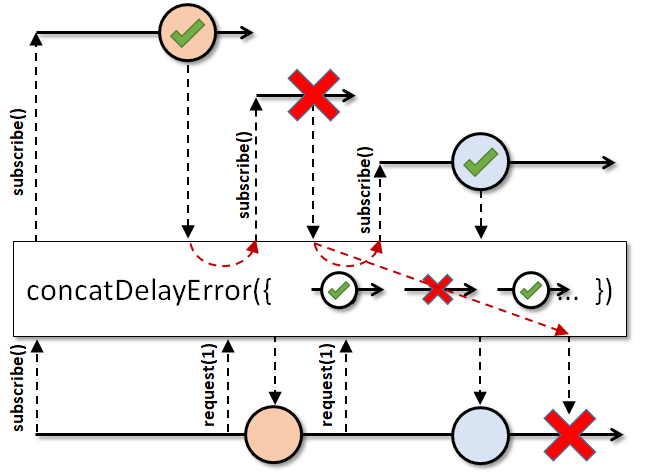
- Backpressure:
- The operator honors backpressure from downstream.
- Scheduler:
concatDelayErrordoes not operate by default on a particularScheduler.
- Type Parameters:
T- the common element base type- Parameters:
sources- the Iterable sequence of MaybeSources- Returns:
- the new Flowable with the concatenating behavior
-
concatDelayError
@BackpressureSupport(value=FULL) @CheckReturnValue @SchedulerSupport(value="none") public static <T> Flowable<T> concatDelayError(Publisher<? extends MaybeSource<? extends T>> sources)
Concatenates the Publisher sequence of Publishers into a single sequence by subscribing to each inner Publisher, one after the other, one at a time and delays any errors till the all inner and the outer Publishers terminate.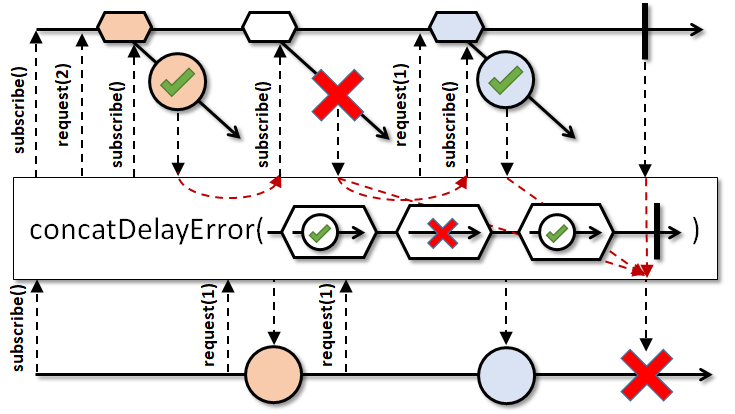
- Backpressure:
concatDelayErrorfully supports backpressure.- Scheduler:
concatDelayErrordoes not operate by default on a particularScheduler.
- Type Parameters:
T- the common element base type- Parameters:
sources- the Publisher sequence of Publishers- Returns:
- the new Publisher with the concatenating behavior
-
concatEager
@BackpressureSupport(value=FULL) @CheckReturnValue @SchedulerSupport(value="none") public static <T> Flowable<T> concatEager(Iterable<? extends MaybeSource<? extends T>> sources)
Concatenates a sequence of MaybeSources eagerly into a single stream of values.Eager concatenation means that once a subscriber subscribes, this operator subscribes to all of the source MaybeSources. The operator buffers the values emitted by these MaybeSources and then drains them in order, each one after the previous one completes.
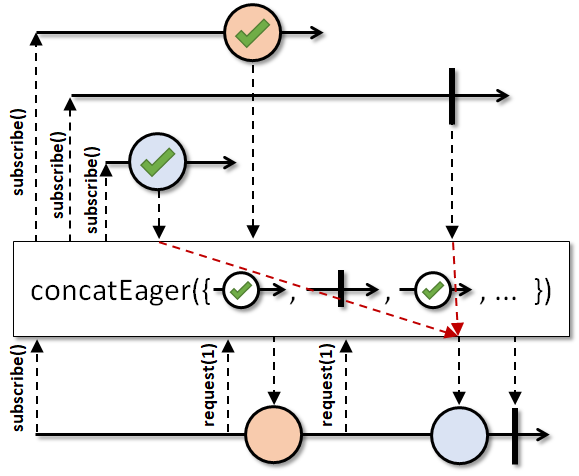
- Backpressure:
- Backpressure is honored towards the downstream.
- Scheduler:
- This method does not operate by default on a particular
Scheduler.
- Type Parameters:
T- the value type- Parameters:
sources- a sequence of MaybeSource that need to be eagerly concatenated- Returns:
- the new Flowable instance with the specified concatenation behavior
-
concatEager
@BackpressureSupport(value=FULL) @CheckReturnValue @SchedulerSupport(value="none") public static <T> Flowable<T> concatEager(Publisher<? extends MaybeSource<? extends T>> sources)
Concatenates a Publisher sequence of MaybeSources eagerly into a single stream of values.Eager concatenation means that once a subscriber subscribes, this operator subscribes to all of the emitted source Publishers as they are observed. The operator buffers the values emitted by these Publishers and then drains them in order, each one after the previous one completes.
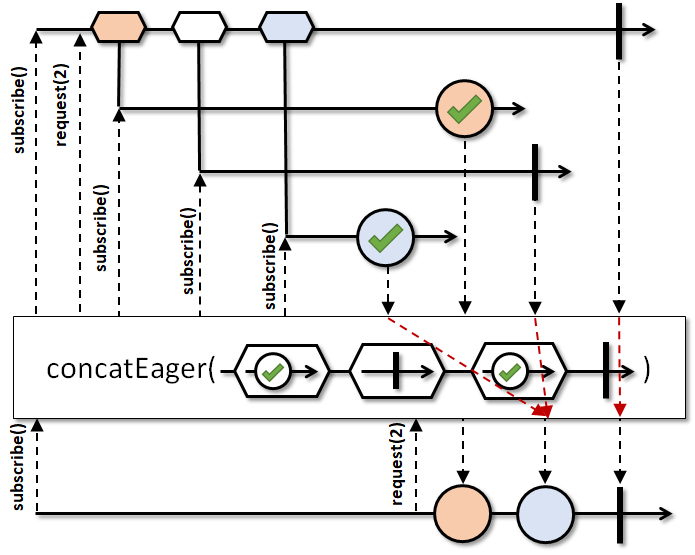
- Backpressure:
- Backpressure is honored towards the downstream and the outer Publisher is
expected to support backpressure. Violating this assumption, the operator will
signal
MissingBackpressureException. - Scheduler:
- This method does not operate by default on a particular
Scheduler.
- Type Parameters:
T- the value type- Parameters:
sources- a sequence of Publishers that need to be eagerly concatenated- Returns:
- the new Publisher instance with the specified concatenation behavior
-
create
@CheckReturnValue @NonNull @SchedulerSupport(value="none") public static <T> Maybe<T> create(MaybeOnSubscribe<T> onSubscribe)
Provides an API (via a cold Maybe) that bridges the reactive world with the callback-style world.Example:
Maybe.<Event>create(emitter -> { Callback listener = new Callback() { @Override public void onEvent(Event e) { if (e.isNothing()) { emitter.onComplete(); } else { emitter.onSuccess(e); } } @Override public void onFailure(Exception e) { emitter.onError(e); } }; AutoCloseable c = api.someMethod(listener); emitter.setCancellable(c::close); });- Scheduler:
createdoes not operate by default on a particularScheduler.
- Type Parameters:
T- the value type- Parameters:
onSubscribe- the emitter that is called when a MaybeObserver subscribes to the returnedMaybe- Returns:
- the new Maybe instance
- See Also:
MaybeOnSubscribe,Cancellable
-
defer
@CheckReturnValue @NonNull @SchedulerSupport(value="none") public static <T> Maybe<T> defer(Callable<? extends MaybeSource<? extends T>> maybeSupplier)
Calls a Callable for each individual MaybeObserver to return the actual MaybeSource source to be subscribed to.- Scheduler:
deferdoes not operate by default on a particularScheduler.
- Type Parameters:
T- the value type- Parameters:
maybeSupplier- the Callable that is called for each individual MaybeObserver and returns a MaybeSource instance to subscribe to- Returns:
- the new Maybe instance
-
empty
@CheckReturnValue @SchedulerSupport(value="none") public static <T> Maybe<T> empty()
Returns a (singleton) Maybe instance that callsonCompleteimmediately.
- Scheduler:
emptydoes not operate by default on a particularScheduler.
- Type Parameters:
T- the value type- Returns:
- the new Maybe instance
-
error
@CheckReturnValue @NonNull @SchedulerSupport(value="none") public static <T> Maybe<T> error(Throwable exception)
Returns a Maybe that invokes a subscriber'sonErrormethod when the subscriber subscribes to it.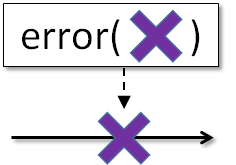
- Scheduler:
errordoes not operate by default on a particularScheduler.
- Type Parameters:
T- the type of the item (ostensibly) emitted by the Maybe- Parameters:
exception- the particular Throwable to pass toonError- Returns:
- a Maybe that invokes the subscriber's
onErrormethod when the subscriber subscribes to it - See Also:
- ReactiveX operators documentation: Throw
-
error
@CheckReturnValue @NonNull @SchedulerSupport(value="none") public static <T> Maybe<T> error(Callable<? extends Throwable> supplier)
Returns a Maybe that invokes aMaybeObserver'sonErrormethod when the MaybeObserver subscribes to it.
- Scheduler:
errordoes not operate by default on a particularScheduler.
- Type Parameters:
T- the type of the items (ostensibly) emitted by the Maybe- Parameters:
supplier- a Callable factory to return a Throwable for each individual MaybeObserver- Returns:
- a Maybe that invokes the
MaybeObserver'sonErrormethod when the MaybeObserver subscribes to it - See Also:
- ReactiveX operators documentation: Throw
-
fromAction
@CheckReturnValue @NonNull @SchedulerSupport(value="none") public static <T> Maybe<T> fromAction(Action run)
Returns a Maybe instance that runs the given Action for each subscriber and emits either its exception or simply completes.- Scheduler:
fromActiondoes not operate by default on a particularScheduler.- Error handling:
- If the
Actionthrows an exception, the respectiveThrowableis delivered to the downstream viaMaybeObserver.onError(Throwable), except when the downstream has disposed thisMaybesource. In this latter case, theThrowableis delivered to the global error handler viaRxJavaPlugins.onError(Throwable)as anUndeliverableException.
- Type Parameters:
T- the target type- Parameters:
run- the runnable to run for each subscriber- Returns:
- the new Maybe instance
- Throws:
NullPointerException- if run is null
-
fromCompletable
@CheckReturnValue @NonNull @SchedulerSupport(value="none") public static <T> Maybe<T> fromCompletable(CompletableSource completableSource)
Wraps a CompletableSource into a Maybe.- Scheduler:
fromCompletabledoes not operate by default on a particularScheduler.
- Type Parameters:
T- the target type- Parameters:
completableSource- the CompletableSource to convert from- Returns:
- the new Maybe instance
- Throws:
NullPointerException- if completable is null
-
fromSingle
@CheckReturnValue @NonNull @SchedulerSupport(value="none") public static <T> Maybe<T> fromSingle(SingleSource<T> singleSource)
Wraps a SingleSource into a Maybe.- Scheduler:
fromSingledoes not operate by default on a particularScheduler.
- Type Parameters:
T- the target type- Parameters:
singleSource- the SingleSource to convert from- Returns:
- the new Maybe instance
- Throws:
NullPointerException- if single is null
-
fromCallable
@CheckReturnValue @NonNull @SchedulerSupport(value="none") public static <T> Maybe<T> fromCallable(@NonNull Callable<? extends T> callable)
Returns aMaybethat invokes the givenCallablefor each individualMaybeObserverthat subscribes and emits the resulting non-null item viaonSuccesswhile considering anullresult from theCallableas indication for valueless completion viaonComplete.This operator allows you to defer the execution of the given
Callableuntil aMaybeObserversubscribes to the returnedMaybe. In other terms, this source operator evaluates the givenCallable"lazily".Note that the
nullhandling of this operator differs from the similar source operators in the otherbase reactive classes. Those operators signal aNullPointerExceptionif the value returned by theirCallableisnullwhile thisfromCallableconsiders it to indicate the returnedMaybeis empty.- Scheduler:
fromCallabledoes not operate by default on a particularScheduler.- Error handling:
- Any non-fatal exception thrown by
Callable.call()will be forwarded toonError, except if theMaybeObserverdisposed the subscription in the meantime. In this latter case, the exception is forwarded to the global error handler viaRxJavaPlugins.onError(Throwable)wrapped into aUndeliverableException. Fatal exceptions are rethrown and usually will end up in the executing thread'sThread.UncaughtExceptionHandler.uncaughtException(Thread, Throwable)handler.
-
fromFuture
@CheckReturnValue @NonNull @SchedulerSupport(value="none") public static <T> Maybe<T> fromFuture(Future<? extends T> future)
Converts aFutureinto a Maybe, treating a null result as an indication of emptiness.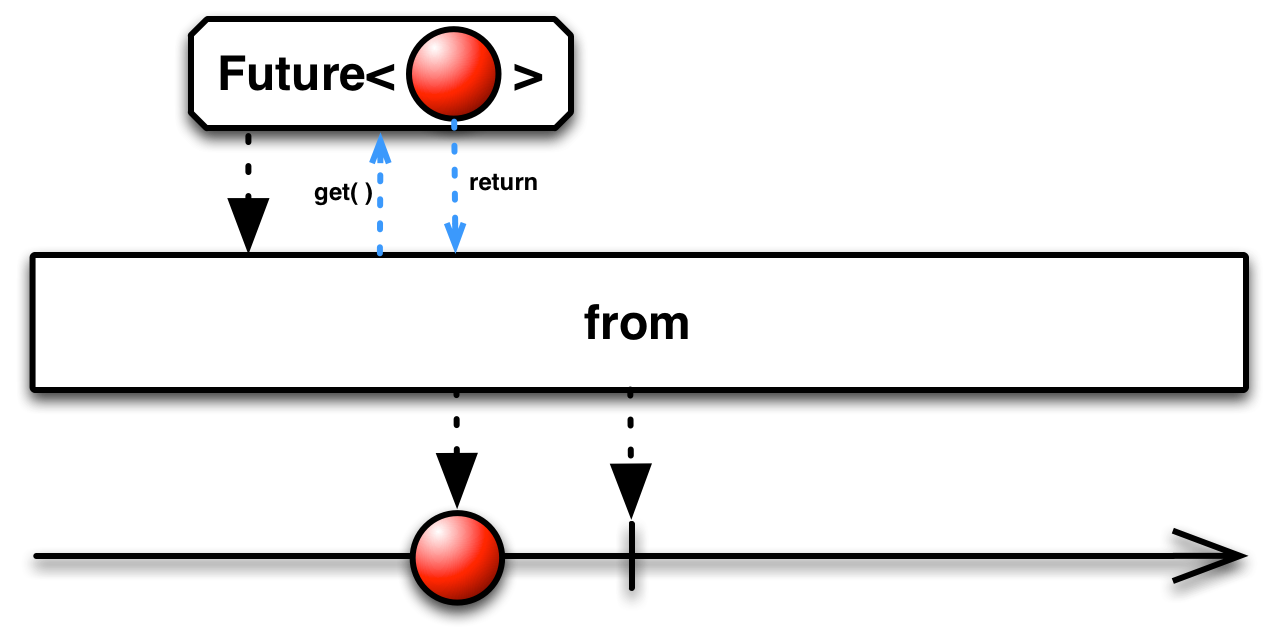
You can convert any object that supports the
Futureinterface into a Maybe that emits the return value of theFuture.get()method of that object, by passing the object into thefrommethod.Important note: This Maybe is blocking; you cannot dispose it.
Unlike 1.x, disposing the Maybe won't cancel the future. If necessary, one can use composition to achieve the cancellation effect:
futureMaybe.doOnDispose(() -> future.cancel(true));.- Scheduler:
fromFuturedoes not operate by default on a particularScheduler.
- Type Parameters:
T- the type of object that theFuturereturns, and also the type of item to be emitted by the resulting Maybe- Parameters:
future- the sourceFuture- Returns:
- a Maybe that emits the item from the source
Future - See Also:
- ReactiveX operators documentation: From
-
fromFuture
@CheckReturnValue @NonNull @SchedulerSupport(value="none") public static <T> Maybe<T> fromFuture(Future<? extends T> future, long timeout, TimeUnit unit)
Converts aFutureinto a Maybe, with a timeout on the Future.
You can convert any object that supports the
Futureinterface into a Maybe that emits the return value of theFuture.get()method of that object, by passing the object into thefromFuturemethod.Unlike 1.x, disposing the Maybe won't cancel the future. If necessary, one can use composition to achieve the cancellation effect:
futureMaybe.doOnCancel(() -> future.cancel(true));.Important note: This Maybe is blocking on the thread it gets subscribed on; you cannot dispose it.
- Scheduler:
fromFuturedoes not operate by default on a particularScheduler.
- Type Parameters:
T- the type of object that theFuturereturns, and also the type of item to be emitted by the resulting Maybe- Parameters:
future- the sourceFuturetimeout- the maximum time to wait before callinggetunit- theTimeUnitof thetimeoutargument- Returns:
- a Maybe that emits the item from the source
Future - See Also:
- ReactiveX operators documentation: From
-
fromRunnable
@CheckReturnValue @NonNull @SchedulerSupport(value="none") public static <T> Maybe<T> fromRunnable(Runnable run)
Returns a Maybe instance that runs the given Action for each subscriber and emits either its exception or simply completes.- Scheduler:
fromRunnabledoes not operate by default on a particularScheduler.
- Type Parameters:
T- the target type- Parameters:
run- the runnable to run for each subscriber- Returns:
- the new Maybe instance
- Throws:
NullPointerException- if run is null
-
just
@CheckReturnValue @NonNull @SchedulerSupport(value="none") public static <T> Maybe<T> just(T item)
Returns aMaybethat emits a specified item.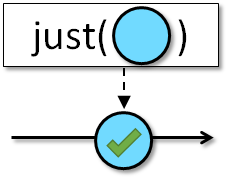
To convert any object into a
Maybethat emits that object, pass that object into thejustmethod.- Scheduler:
justdoes not operate by default on a particularScheduler.
- Type Parameters:
T- the type of that item- Parameters:
item- the item to emit- Returns:
- a
Maybethat emitsitem - See Also:
- ReactiveX operators documentation: Just
-
merge
@BackpressureSupport(value=FULL) @CheckReturnValue @SchedulerSupport(value="none") public static <T> Flowable<T> merge(Iterable<? extends MaybeSource<? extends T>> sources)
Merges an Iterable sequence of MaybeSource instances into a single Flowable sequence, running all MaybeSources at once.- Backpressure:
- The operator honors backpressure from downstream.
- Scheduler:
mergedoes not operate by default on a particularScheduler.- Error handling:
- If any of the source
MaybeSources signal aThrowableviaonError, the resultingFlowableterminates with thatThrowableand all other sourceMaybeSources are disposed. If more than oneMaybeSourcesignals an error, the resultingFlowablemay terminate with the first one's error or, depending on the concurrency of the sources, may terminate with aCompositeExceptioncontaining two or more of the various error signals.Throwables that didn't make into the composite will be sent (individually) to the global error handler viaRxJavaPlugins.onError(Throwable)method asUndeliverableExceptionerrors. Similarly,Throwables signaled by source(s) after the returnedFlowablehas been cancelled or terminated with a (composite) error will be sent to the same global error handler. UsemergeDelayError(Iterable)to merge sources and terminate only when all sourceMaybeSources have completed or failed with an error.
- Type Parameters:
T- the common and resulting value type- Parameters:
sources- the Iterable sequence of MaybeSource sources- Returns:
- the new Flowable instance
- See Also:
mergeDelayError(Iterable)
-
merge
@BackpressureSupport(value=FULL) @CheckReturnValue @SchedulerSupport(value="none") public static <T> Flowable<T> merge(Publisher<? extends MaybeSource<? extends T>> sources)
Merges a Flowable sequence of MaybeSource instances into a single Flowable sequence, running all MaybeSources at once.- Backpressure:
- The operator honors backpressure from downstream.
- Scheduler:
mergedoes not operate by default on a particularScheduler.- Error handling:
- If any of the source
MaybeSources signal aThrowableviaonError, the resultingFlowableterminates with thatThrowableand all other sourceMaybeSources are disposed. If more than oneMaybeSourcesignals an error, the resultingFlowablemay terminate with the first one's error or, depending on the concurrency of the sources, may terminate with aCompositeExceptioncontaining two or more of the various error signals.Throwables that didn't make into the composite will be sent (individually) to the global error handler viaRxJavaPlugins.onError(Throwable)method asUndeliverableExceptionerrors. Similarly,Throwables signaled by source(s) after the returnedFlowablehas been cancelled or terminated with a (composite) error will be sent to the same global error handler. UsemergeDelayError(Publisher)to merge sources and terminate only when all sourceMaybeSources have completed or failed with an error.
- Type Parameters:
T- the common and resulting value type- Parameters:
sources- the Flowable sequence of MaybeSource sources- Returns:
- the new Flowable instance
- See Also:
mergeDelayError(Publisher)
-
merge
@BackpressureSupport(value=FULL) @CheckReturnValue @NonNull @SchedulerSupport(value="none") public static <T> Flowable<T> merge(Publisher<? extends MaybeSource<? extends T>> sources, int maxConcurrency)
Merges a Flowable sequence of MaybeSource instances into a single Flowable sequence, running at most maxConcurrency MaybeSources at once.- Backpressure:
- The operator honors backpressure from downstream.
- Scheduler:
mergedoes not operate by default on a particularScheduler.- Error handling:
- If any of the source
MaybeSources signal aThrowableviaonError, the resultingFlowableterminates with thatThrowableand all other sourceMaybeSources are disposed. If more than oneMaybeSourcesignals an error, the resultingFlowablemay terminate with the first one's error or, depending on the concurrency of the sources, may terminate with aCompositeExceptioncontaining two or more of the various error signals.Throwables that didn't make into the composite will be sent (individually) to the global error handler viaRxJavaPlugins.onError(Throwable)method asUndeliverableExceptionerrors. Similarly,Throwables signaled by source(s) after the returnedFlowablehas been cancelled or terminated with a (composite) error will be sent to the same global error handler. UsemergeDelayError(Publisher, int)to merge sources and terminate only when all sourceMaybeSources have completed or failed with an error.
- Type Parameters:
T- the common and resulting value type- Parameters:
sources- the Flowable sequence of MaybeSource sourcesmaxConcurrency- the maximum number of concurrently running MaybeSources- Returns:
- the new Flowable instance
- See Also:
mergeDelayError(Publisher, int)
-
merge
@CheckReturnValue @NonNull @SchedulerSupport(value="none") public static <T> Maybe<T> merge(MaybeSource<? extends MaybeSource<? extends T>> source)
Flattens aMaybeSourcethat emits aMaybeSourceinto a singleMaybeSourcethat emits the item emitted by the nestedMaybeSource, without any transformation.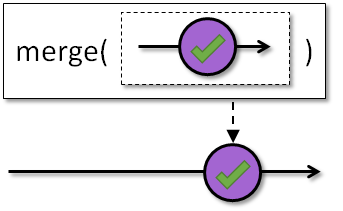
- Scheduler:
mergedoes not operate by default on a particularScheduler.- Error handling:
- The resulting
Maybeemits the outer source's or the innerMaybeSource'sThrowableas is. Unlike the othermerge()operators, this operator won't and can't produce aCompositeExceptionbecause there is only one possibility for the outer or the innerMaybeSourceto emit anonErrorsignal. Therefore, there is no need for amergeDelayError(MaybeSource<MaybeSource<T>>)operator.
- Type Parameters:
T- the value type of the sources and the output- Parameters:
source- aMaybeSourcethat emits aMaybeSource- Returns:
- a
Maybethat emits the item that is the result of flattening theMaybeSourceemitted bysource - See Also:
- ReactiveX operators documentation: Merge
-
merge
@BackpressureSupport(value=FULL) @CheckReturnValue @NonNull @SchedulerSupport(value="none") public static <T> Flowable<T> merge(MaybeSource<? extends T> source1, MaybeSource<? extends T> source2)
Flattens two MaybeSources into a single Flowable, without any transformation.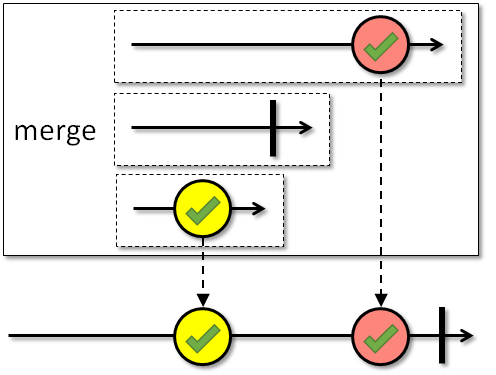
You can combine items emitted by multiple MaybeSources so that they appear as a single Flowable, by using the
mergemethod.- Backpressure:
- The operator honors backpressure from downstream.
- Scheduler:
mergedoes not operate by default on a particularScheduler.- Error handling:
- If any of the source
MaybeSources signal aThrowableviaonError, the resultingFlowableterminates with thatThrowableand all other sourceMaybeSources are disposed. If more than oneMaybeSourcesignals an error, the resultingFlowablemay terminate with the first one's error or, depending on the concurrency of the sources, may terminate with aCompositeExceptioncontaining two or more of the various error signals.Throwables that didn't make into the composite will be sent (individually) to the global error handler viaRxJavaPlugins.onError(Throwable)method asUndeliverableExceptionerrors. Similarly,Throwables signaled by source(s) after the returnedFlowablehas been cancelled or terminated with a (composite) error will be sent to the same global error handler. UsemergeDelayError(MaybeSource, MaybeSource)to merge sources and terminate only when all sourceMaybeSources have completed or failed with an error.
- Type Parameters:
T- the common value type- Parameters:
source1- a MaybeSource to be mergedsource2- a MaybeSource to be merged- Returns:
- a Flowable that emits all of the items emitted by the source MaybeSources
- See Also:
- ReactiveX operators documentation: Merge,
mergeDelayError(MaybeSource, MaybeSource)
-
merge
@BackpressureSupport(value=FULL) @CheckReturnValue @NonNull @SchedulerSupport(value="none") public static <T> Flowable<T> merge(MaybeSource<? extends T> source1, MaybeSource<? extends T> source2, MaybeSource<? extends T> source3)
Flattens three MaybeSources into a single Flowable, without any transformation.
You can combine items emitted by multiple MaybeSources so that they appear as a single Flowable, by using the
mergemethod.- Backpressure:
- The operator honors backpressure from downstream.
- Scheduler:
mergedoes not operate by default on a particularScheduler.- Error handling:
- If any of the source
MaybeSources signal aThrowableviaonError, the resultingFlowableterminates with thatThrowableand all other sourceMaybeSources are disposed. If more than oneMaybeSourcesignals an error, the resultingFlowablemay terminate with the first one's error or, depending on the concurrency of the sources, may terminate with aCompositeExceptioncontaining two or more of the various error signals.Throwables that didn't make into the composite will be sent (individually) to the global error handler viaRxJavaPlugins.onError(Throwable)method asUndeliverableExceptionerrors. Similarly,Throwables signaled by source(s) after the returnedFlowablehas been cancelled or terminated with a (composite) error will be sent to the same global error handler. UsemergeDelayError(MaybeSource, MaybeSource, MaybeSource)to merge sources and terminate only when all sourceMaybeSources have completed or failed with an error.
- Type Parameters:
T- the common value type- Parameters:
source1- a MaybeSource to be mergedsource2- a MaybeSource to be mergedsource3- a MaybeSource to be merged- Returns:
- a Flowable that emits all of the items emitted by the source MaybeSources
- See Also:
- ReactiveX operators documentation: Merge,
mergeDelayError(MaybeSource, MaybeSource, MaybeSource)
-
merge
@BackpressureSupport(value=FULL) @CheckReturnValue @NonNull @SchedulerSupport(value="none") public static <T> Flowable<T> merge(MaybeSource<? extends T> source1, MaybeSource<? extends T> source2, MaybeSource<? extends T> source3, MaybeSource<? extends T> source4)
Flattens four MaybeSources into a single Flowable, without any transformation.
You can combine items emitted by multiple MaybeSources so that they appear as a single Flowable, by using the
mergemethod.- Backpressure:
- The operator honors backpressure from downstream.
- Scheduler:
mergedoes not operate by default on a particularScheduler.- Error handling:
- If any of the source
MaybeSources signal aThrowableviaonError, the resultingFlowableterminates with thatThrowableand all other sourceMaybeSources are disposed. If more than oneMaybeSourcesignals an error, the resultingFlowablemay terminate with the first one's error or, depending on the concurrency of the sources, may terminate with aCompositeExceptioncontaining two or more of the various error signals.Throwables that didn't make into the composite will be sent (individually) to the global error handler viaRxJavaPlugins.onError(Throwable)method asUndeliverableExceptionerrors. Similarly,Throwables signaled by source(s) after the returnedFlowablehas been cancelled or terminated with a (composite) error will be sent to the same global error handler. UsemergeDelayError(MaybeSource, MaybeSource, MaybeSource, MaybeSource)to merge sources and terminate only when all sourceMaybeSources have completed or failed with an error.
- Type Parameters:
T- the common value type- Parameters:
source1- a MaybeSource to be mergedsource2- a MaybeSource to be mergedsource3- a MaybeSource to be mergedsource4- a MaybeSource to be merged- Returns:
- a Flowable that emits all of the items emitted by the source MaybeSources
- See Also:
- ReactiveX operators documentation: Merge,
mergeDelayError(MaybeSource, MaybeSource, MaybeSource, MaybeSource)
-
mergeArray
@BackpressureSupport(value=FULL) @CheckReturnValue @NonNull @SchedulerSupport(value="none") public static <T> Flowable<T> mergeArray(MaybeSource<? extends T>... sources)
Merges an array sequence of MaybeSource instances into a single Flowable sequence, running all MaybeSources at once.- Backpressure:
- The operator honors backpressure from downstream.
- Scheduler:
mergeArraydoes not operate by default on a particularScheduler.- Error handling:
- If any of the source
MaybeSources signal aThrowableviaonError, the resultingFlowableterminates with thatThrowableand all other sourceMaybeSources are disposed. If more than oneMaybeSourcesignals an error, the resultingFlowablemay terminate with the first one's error or, depending on the concurrency of the sources, may terminate with aCompositeExceptioncontaining two or more of the various error signals.Throwables that didn't make into the composite will be sent (individually) to the global error handler viaRxJavaPlugins.onError(Throwable)method asUndeliverableExceptionerrors. Similarly,Throwables signaled by source(s) after the returnedFlowablehas been cancelled or terminated with a (composite) error will be sent to the same global error handler. UsemergeArrayDelayError(MaybeSource...)to merge sources and terminate only when all sourceMaybeSources have completed or failed with an error.
- Type Parameters:
T- the common and resulting value type- Parameters:
sources- the array sequence of MaybeSource sources- Returns:
- the new Flowable instance
- See Also:
mergeArrayDelayError(MaybeSource...)
-
mergeArrayDelayError
@BackpressureSupport(value=FULL) @CheckReturnValue @SchedulerSupport(value="none") public static <T> Flowable<T> mergeArrayDelayError(MaybeSource<? extends T>... sources)
Flattens an array of MaybeSources into one Flowable, in a way that allows a Subscriber to receive all successfully emitted items from each of the source MaybeSources without being interrupted by an error notification from one of them.This behaves like
merge(Publisher)except that if any of the merged MaybeSources notify of an error viaonError,mergeDelayErrorwill refrain from propagating that error notification until all of the merged MaybeSources have finished emitting items.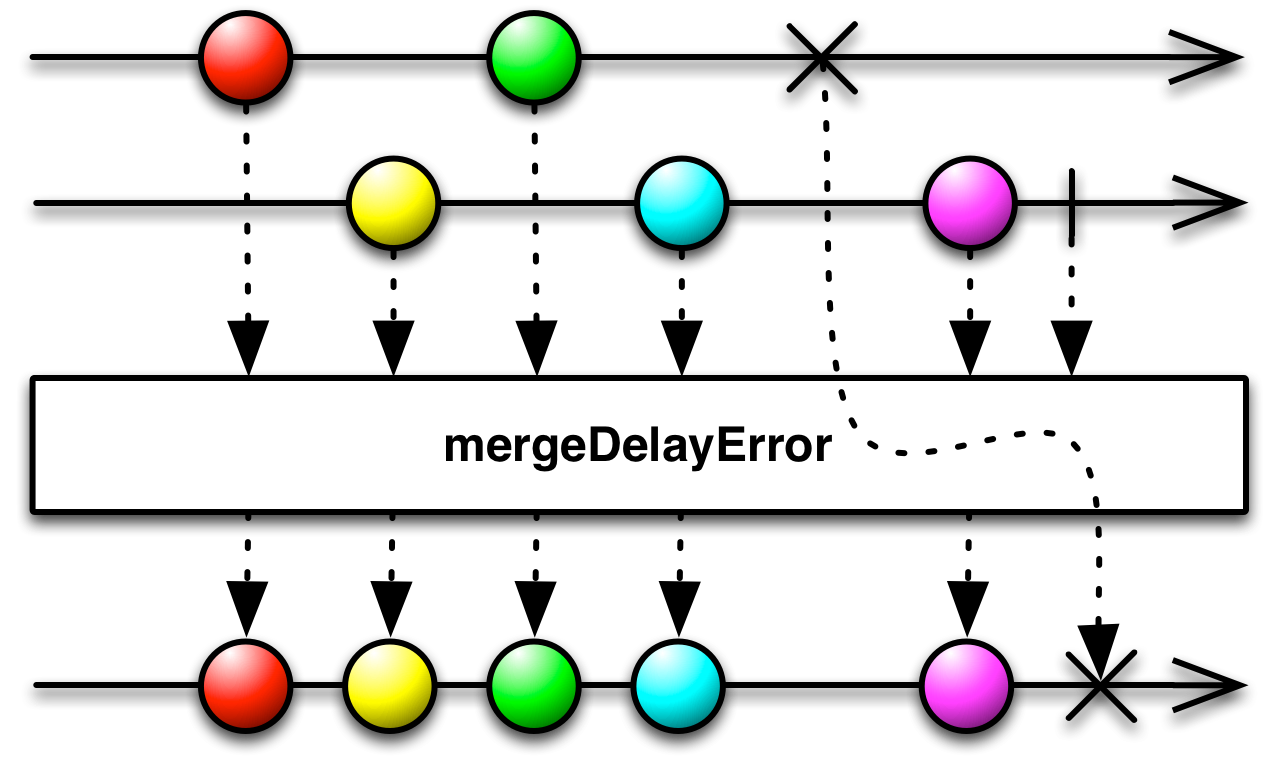
Even if multiple merged MaybeSources send
onErrornotifications,mergeDelayErrorwill only invoke theonErrormethod of its Subscribers once.- Backpressure:
- The operator honors backpressure from downstream.
- Scheduler:
mergeArrayDelayErrordoes not operate by default on a particularScheduler.
- Type Parameters:
T- the common element base type- Parameters:
sources- the Iterable of MaybeSources- Returns:
- a Flowable that emits items that are the result of flattening the items emitted by the MaybeSources in the Iterable
- See Also:
- ReactiveX operators documentation: Merge
-
mergeDelayError
@BackpressureSupport(value=FULL) @CheckReturnValue @SchedulerSupport(value="none") public static <T> Flowable<T> mergeDelayError(Iterable<? extends MaybeSource<? extends T>> sources)
Flattens an Iterable of MaybeSources into one Flowable, in a way that allows a Subscriber to receive all successfully emitted items from each of the source MaybeSources without being interrupted by an error notification from one of them.This behaves like
merge(Publisher)except that if any of the merged MaybeSources notify of an error viaonError,mergeDelayErrorwill refrain from propagating that error notification until all of the merged MaybeSources have finished emitting items.
Even if multiple merged MaybeSources send
onErrornotifications,mergeDelayErrorwill only invoke theonErrormethod of its Subscribers once.- Backpressure:
- The operator honors backpressure from downstream.
- Scheduler:
mergeDelayErrordoes not operate by default on a particularScheduler.
- Type Parameters:
T- the common element base type- Parameters:
sources- the Iterable of MaybeSources- Returns:
- a Flowable that emits items that are the result of flattening the items emitted by the MaybeSources in the Iterable
- See Also:
- ReactiveX operators documentation: Merge
-
mergeDelayError
@BackpressureSupport(value=FULL) @CheckReturnValue @SchedulerSupport(value="none") public static <T> Flowable<T> mergeDelayError(Publisher<? extends MaybeSource<? extends T>> sources)
Flattens a Publisher that emits MaybeSources into one Publisher, in a way that allows a Subscriber to receive all successfully emitted items from all of the source MaybeSources without being interrupted by an error notification from one of them or even the main Publisher.This behaves like
merge(Publisher)except that if any of the merged MaybeSources notify of an error viaonError,mergeDelayErrorwill refrain from propagating that error notification until all of the merged MaybeSources and the main Publisher have finished emitting items.
Even if multiple merged Publishers send
onErrornotifications,mergeDelayErrorwill only invoke theonErrormethod of its Subscribers once.- Backpressure:
- The operator honors backpressure from downstream. The outer
Publisheris consumed in unbounded mode (i.e., no backpressure is applied to it). - Scheduler:
mergeDelayErrordoes not operate by default on a particularScheduler.
- Type Parameters:
T- the common element base type- Parameters:
sources- a Publisher that emits MaybeSources- Returns:
- a Flowable that emits all of the items emitted by the Publishers emitted by the
sourcePublisher - See Also:
- ReactiveX operators documentation: Merge
-
mergeDelayError
@BackpressureSupport(value=FULL) @CheckReturnValue @NonNull @SchedulerSupport(value="none") public static <T> Flowable<T> mergeDelayError(Publisher<? extends MaybeSource<? extends T>> sources, int maxConcurrency)
Flattens a Publisher that emits MaybeSources into one Publisher, in a way that allows a Subscriber to receive all successfully emitted items from all of the source MaybeSources without being interrupted by an error notification from one of them or even the main Publisher as well as limiting the total number of active MaybeSources.This behaves like
merge(Publisher, int)except that if any of the merged MaybeSources notify of an error viaonError,mergeDelayErrorwill refrain from propagating that error notification until all of the merged MaybeSources and the main Publisher have finished emitting items.
Even if multiple merged Publishers send
onErrornotifications,mergeDelayErrorwill only invoke theonErrormethod of its Subscribers once.- Backpressure:
- The operator honors backpressure from downstream. The outer
Publisheris consumed in unbounded mode (i.e., no backpressure is applied to it). - Scheduler:
mergeDelayErrordoes not operate by default on a particularScheduler.
History: 2.1.9 - experimental
- Type Parameters:
T- the common element base type- Parameters:
sources- a Publisher that emits MaybeSourcesmaxConcurrency- the maximum number of active inner MaybeSources to be merged at a time- Returns:
- a Flowable that emits all of the items emitted by the Publishers emitted by the
sourcePublisher - Since:
- 2.2
- See Also:
- ReactiveX operators documentation: Merge
-
mergeDelayError
@BackpressureSupport(value=FULL) @CheckReturnValue @NonNull @SchedulerSupport(value="none") public static <T> Flowable<T> mergeDelayError(MaybeSource<? extends T> source1, MaybeSource<? extends T> source2)
Flattens two MaybeSources into one Flowable, in a way that allows a Subscriber to receive all successfully emitted items from each of the source MaybeSources without being interrupted by an error notification from one of them.This behaves like
merge(MaybeSource, MaybeSource)except that if any of the merged MaybeSources notify of an error viaonError,mergeDelayErrorwill refrain from propagating that error notification until all of the merged MaybeSources have finished emitting items.
Even if both merged MaybeSources send
onErrornotifications,mergeDelayErrorwill only invoke theonErrormethod of its Subscribers once.- Backpressure:
- The operator honors backpressure from downstream.
- Scheduler:
mergeDelayErrordoes not operate by default on a particularScheduler.
- Type Parameters:
T- the common element base type- Parameters:
source1- a MaybeSource to be mergedsource2- a MaybeSource to be merged- Returns:
- a Flowable that emits all of the items that are emitted by the two source MaybeSources
- See Also:
- ReactiveX operators documentation: Merge
-
mergeDelayError
@BackpressureSupport(value=FULL) @CheckReturnValue @NonNull @SchedulerSupport(value="none") public static <T> Flowable<T> mergeDelayError(MaybeSource<? extends T> source1, MaybeSource<? extends T> source2, MaybeSource<? extends T> source3)
Flattens three MaybeSource into one Flowable, in a way that allows a Subscriber to receive all successfully emitted items from all of the source MaybeSources without being interrupted by an error notification from one of them.This behaves like
merge(MaybeSource, MaybeSource, MaybeSource)except that if any of the merged MaybeSources notify of an error viaonError,mergeDelayErrorwill refrain from propagating that error notification until all of the merged MaybeSources have finished emitting items.
Even if multiple merged MaybeSources send
onErrornotifications,mergeDelayErrorwill only invoke theonErrormethod of its Subscribers once.- Backpressure:
- The operator honors backpressure from downstream.
- Scheduler:
mergeDelayErrordoes not operate by default on a particularScheduler.
- Type Parameters:
T- the common element base type- Parameters:
source1- a MaybeSource to be mergedsource2- a MaybeSource to be mergedsource3- a MaybeSource to be merged- Returns:
- a Flowable that emits all of the items that are emitted by the source MaybeSources
- See Also:
- ReactiveX operators documentation: Merge
-
mergeDelayError
@BackpressureSupport(value=FULL) @CheckReturnValue @NonNull @SchedulerSupport(value="none") public static <T> Flowable<T> mergeDelayError(MaybeSource<? extends T> source1, MaybeSource<? extends T> source2, MaybeSource<? extends T> source3, MaybeSource<? extends T> source4)
Flattens four MaybeSources into one Flowable, in a way that allows a Subscriber to receive all successfully emitted items from all of the source MaybeSources without being interrupted by an error notification from one of them.This behaves like
merge(MaybeSource, MaybeSource, MaybeSource, MaybeSource)except that if any of the merged MaybeSources notify of an error viaonError,mergeDelayErrorwill refrain from propagating that error notification until all of the merged MaybeSources have finished emitting items.
Even if multiple merged MaybeSources send
onErrornotifications,mergeDelayErrorwill only invoke theonErrormethod of its Subscribers once.- Backpressure:
- The operator honors backpressure from downstream.
- Scheduler:
mergeDelayErrordoes not operate by default on a particularScheduler.
- Type Parameters:
T- the common element base type- Parameters:
source1- a MaybeSource to be mergedsource2- a MaybeSource to be mergedsource3- a MaybeSource to be mergedsource4- a MaybeSource to be merged- Returns:
- a Flowable that emits all of the items that are emitted by the source MaybeSources
- See Also:
- ReactiveX operators documentation: Merge
-
never
@CheckReturnValue @SchedulerSupport(value="none") public static <T> Maybe<T> never()
Returns a Maybe that never sends any items or notifications to aMaybeObserver.
This Maybe is useful primarily for testing purposes.
- Scheduler:
neverdoes not operate by default on a particularScheduler.
- Type Parameters:
T- the type of items (not) emitted by the Maybe- Returns:
- a Maybe that never emits any items or sends any notifications to a
MaybeObserver - See Also:
- ReactiveX operators documentation: Never
-
sequenceEqual
@CheckReturnValue @SchedulerSupport(value="none") public static <T> Single<Boolean> sequenceEqual(MaybeSource<? extends T> source1, MaybeSource<? extends T> source2)
Returns a Single that emits a Boolean value that indicates whether two MaybeSource sequences are the same by comparing the items emitted by each MaybeSource pairwise.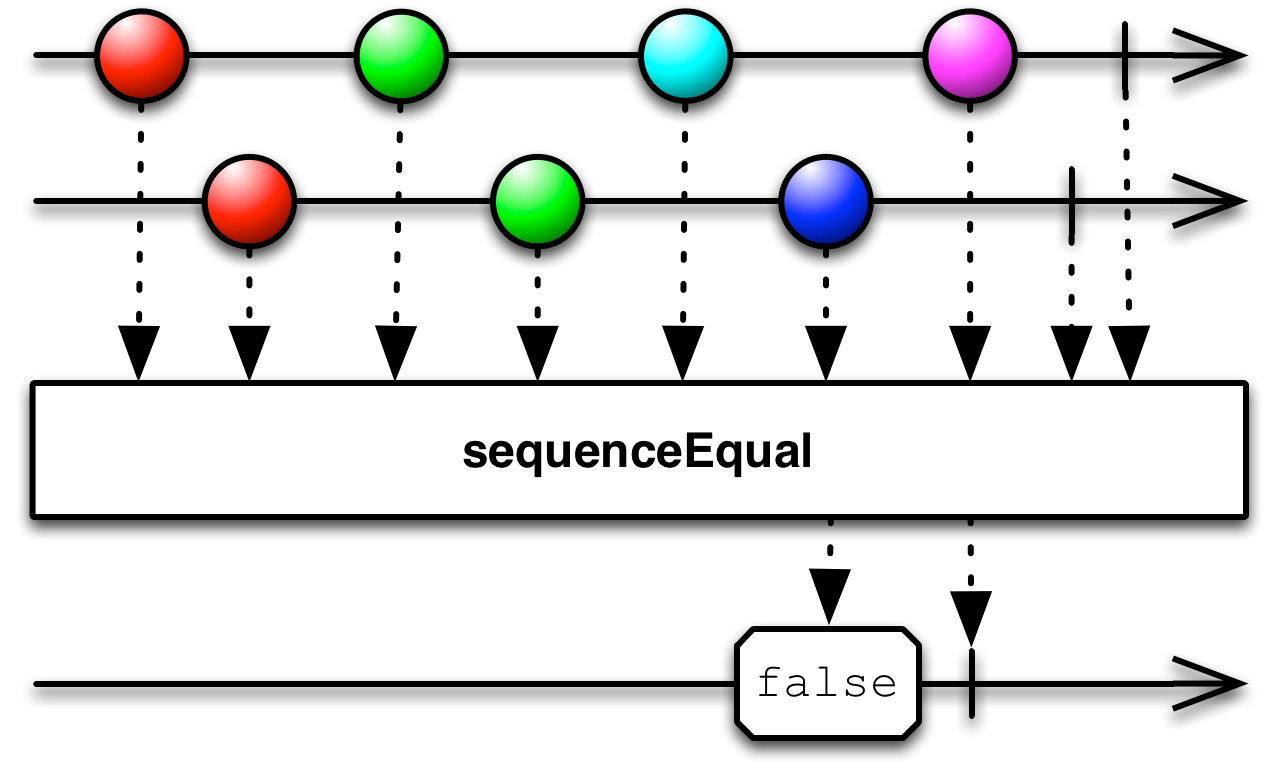
- Scheduler:
sequenceEqualdoes not operate by default on a particularScheduler.
- Type Parameters:
T- the type of items emitted by each MaybeSource- Parameters:
source1- the first MaybeSource to comparesource2- the second MaybeSource to compare- Returns:
- a Single that emits a Boolean value that indicates whether the two sequences are the same
- See Also:
- ReactiveX operators documentation: SequenceEqual
-
sequenceEqual
@CheckReturnValue @NonNull @SchedulerSupport(value="none") public static <T> Single<Boolean> sequenceEqual(MaybeSource<? extends T> source1, MaybeSource<? extends T> source2, BiPredicate<? super T,? super T> isEqual)
Returns a Single that emits a Boolean value that indicates whether two MaybeSources are the same by comparing the items emitted by each MaybeSource pairwise based on the results of a specified equality function.
- Scheduler:
sequenceEqualdoes not operate by default on a particularScheduler.
- Type Parameters:
T- the type of items emitted by each MaybeSource- Parameters:
source1- the first MaybeSource to comparesource2- the second MaybeSource to compareisEqual- a function used to compare items emitted by each MaybeSource- Returns:
- a Single that emits a Boolean value that indicates whether the two MaybeSource sequences are the same according to the specified function
- See Also:
- ReactiveX operators documentation: SequenceEqual
-
timer
@CheckReturnValue @SchedulerSupport(value="io.reactivex:computation") public static Maybe<Long> timer(long delay, TimeUnit unit)
Returns a Maybe that emits0Lafter a specified delay.
- Scheduler:
timeroperates by default on thecomputationScheduler.
- Parameters:
delay- the initial delay before emitting a single0Lunit- time units to use fordelay- Returns:
- a Maybe that emits
0Lafter a specified delay - See Also:
- ReactiveX operators documentation: Timer
-
timer
@CheckReturnValue @NonNull @SchedulerSupport(value="custom") public static Maybe<Long> timer(long delay, TimeUnit unit, Scheduler scheduler)
Returns a Maybe that emits0Lafter a specified delay on a specified Scheduler.
- Scheduler:
- You specify which
Schedulerthis operator will use.
- Parameters:
delay- the initial delay before emitting a single 0Lunit- time units to use fordelayscheduler- theSchedulerto use for scheduling the item- Returns:
- a Maybe that emits
0Lafter a specified delay, on a specified Scheduler - See Also:
- ReactiveX operators documentation: Timer
-
unsafeCreate
@CheckReturnValue @NonNull @SchedulerSupport(value="none") public static <T> Maybe<T> unsafeCreate(MaybeSource<T> onSubscribe)
Advanced use only: creates a Maybe instance without any safeguards by using a callback that is called with a MaybeObserver.- Scheduler:
unsafeCreatedoes not operate by default on a particularScheduler.
- Type Parameters:
T- the value type- Parameters:
onSubscribe- the function that is called with the subscribing MaybeObserver- Returns:
- the new Maybe instance
-
using
@CheckReturnValue @SchedulerSupport(value="none") public static <T,D> Maybe<T> using(Callable<? extends D> resourceSupplier, Function<? super D,? extends MaybeSource<? extends T>> sourceSupplier, Consumer<? super D> resourceDisposer)
Constructs a Maybe that creates a dependent resource object which is disposed of when the upstream terminates or the downstream calls dispose().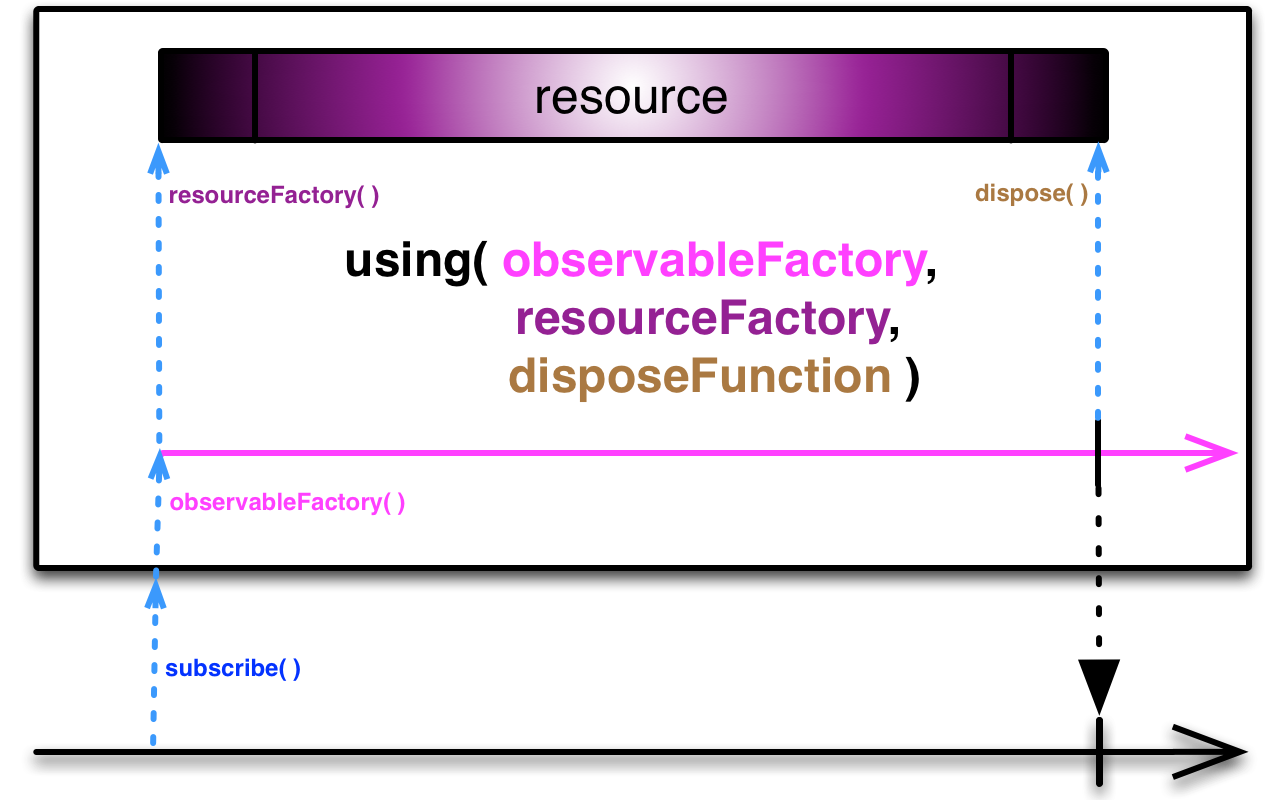
- Scheduler:
usingdoes not operate by default on a particularScheduler.
- Type Parameters:
T- the element type of the generated MaybeSourceD- the type of the resource associated with the output sequence- Parameters:
resourceSupplier- the factory function to create a resource object that depends on the MaybesourceSupplier- the factory function to create a MaybeSourceresourceDisposer- the function that will dispose of the resource- Returns:
- the Maybe whose lifetime controls the lifetime of the dependent resource object
- See Also:
- ReactiveX operators documentation: Using
-
using
@CheckReturnValue @NonNull @SchedulerSupport(value="none") public static <T,D> Maybe<T> using(Callable<? extends D> resourceSupplier, Function<? super D,? extends MaybeSource<? extends T>> sourceSupplier, Consumer<? super D> resourceDisposer, boolean eager)
Constructs a Maybe that creates a dependent resource object which is disposed of just before termination if you have setdisposeEagerlytotrueand a downstream dispose() does not occur before termination. Otherwise resource disposal will occur on call to dispose(). Eager disposal is particularly appropriate for a synchronous Maybe that reuses resources.disposeActionwill only be called once per subscription.
- Scheduler:
usingdoes not operate by default on a particularScheduler.
- Type Parameters:
T- the element type of the generated MaybeSourceD- the type of the resource associated with the output sequence- Parameters:
resourceSupplier- the factory function to create a resource object that depends on the MaybesourceSupplier- the factory function to create a MaybeSourceresourceDisposer- the function that will dispose of the resourceeager- iftruethen disposal will happen either on a dispose() call or just before emission of a terminal event (onCompleteoronError).- Returns:
- the Maybe whose lifetime controls the lifetime of the dependent resource object
- See Also:
- ReactiveX operators documentation: Using
-
wrap
@CheckReturnValue @NonNull @SchedulerSupport(value="none") public static <T> Maybe<T> wrap(MaybeSource<T> source)
Wraps a MaybeSource instance into a new Maybe instance if not already a Maybe instance.- Scheduler:
wrapdoes not operate by default on a particularScheduler.
- Type Parameters:
T- the value type- Parameters:
source- the source to wrap- Returns:
- the Maybe wrapper or the source cast to Maybe (if possible)
-
zip
@CheckReturnValue @NonNull @SchedulerSupport(value="none") public static <T,R> Maybe<R> zip(Iterable<? extends MaybeSource<? extends T>> sources, Function<? super Object[],? extends R> zipper)
Returns a Maybe that emits the results of a specified combiner function applied to combinations of items emitted, in sequence, by an Iterable of other MaybeSources.Note on method signature: since Java doesn't allow creating a generic array with
new T[], the implementation of this operator has to create anObject[]instead. Unfortunately, aFunction<Integer[], R>passed to the method would trigger aClassCastException.
This operator terminates eagerly if any of the source MaybeSources signal an onError or onComplete. This also means it is possible some sources may not get subscribed to at all.
- Scheduler:
zipdoes not operate by default on a particularScheduler.
- Type Parameters:
T- the common value typeR- the zipped result type- Parameters:
sources- an Iterable of source MaybeSourceszipper- a function that, when applied to an item emitted by each of the source MaybeSources, results in an item that will be emitted by the resulting Maybe- Returns:
- a Maybe that emits the zipped results
- See Also:
- ReactiveX operators documentation: Zip
-
zip
@CheckReturnValue @NonNull @SchedulerSupport(value="none") public static <T1,T2,R> Maybe<R> zip(MaybeSource<? extends T1> source1, MaybeSource<? extends T2> source2, BiFunction<? super T1,? super T2,? extends R> zipper)
Returns a Maybe that emits the results of a specified combiner function applied to combinations of two items emitted, in sequence, by two other MaybeSources.
This operator terminates eagerly if any of the source MaybeSources signal an onError or onComplete. This also means it is possible some sources may not get subscribed to at all.
- Scheduler:
zipdoes not operate by default on a particularScheduler.
- Type Parameters:
T1- the value type of the first sourceT2- the value type of the second sourceR- the zipped result type- Parameters:
source1- the first source MaybeSourcesource2- a second source MaybeSourcezipper- a function that, when applied to an item emitted by each of the source MaybeSources, results in an item that will be emitted by the resulting Maybe- Returns:
- a Maybe that emits the zipped results
- See Also:
- ReactiveX operators documentation: Zip
-
zip
@CheckReturnValue @NonNull @SchedulerSupport(value="none") public static <T1,T2,T3,R> Maybe<R> zip(MaybeSource<? extends T1> source1, MaybeSource<? extends T2> source2, MaybeSource<? extends T3> source3, Function3<? super T1,? super T2,? super T3,? extends R> zipper)
Returns a Maybe that emits the results of a specified combiner function applied to combinations of three items emitted, in sequence, by three other MaybeSources.
This operator terminates eagerly if any of the source MaybeSources signal an onError or onComplete. This also means it is possible some sources may not get subscribed to at all.
- Scheduler:
zipdoes not operate by default on a particularScheduler.
- Type Parameters:
T1- the value type of the first sourceT2- the value type of the second sourceT3- the value type of the third sourceR- the zipped result type- Parameters:
source1- the first source MaybeSourcesource2- a second source MaybeSourcesource3- a third source MaybeSourcezipper- a function that, when applied to an item emitted by each of the source MaybeSources, results in an item that will be emitted by the resulting Maybe- Returns:
- a Maybe that emits the zipped results
- See Also:
- ReactiveX operators documentation: Zip
-
zip
@CheckReturnValue @NonNull @SchedulerSupport(value="none") public static <T1,T2,T3,T4,R> Maybe<R> zip(MaybeSource<? extends T1> source1, MaybeSource<? extends T2> source2, MaybeSource<? extends T3> source3, MaybeSource<? extends T4> source4, Function4<? super T1,? super T2,? super T3,? super T4,? extends R> zipper)
Returns a Maybe that emits the results of a specified combiner function applied to combinations of four items emitted, in sequence, by four other MaybeSources.
This operator terminates eagerly if any of the source MaybeSources signal an onError or onComplete. This also means it is possible some sources may not get subscribed to at all.
- Scheduler:
zipdoes not operate by default on a particularScheduler.
- Type Parameters:
T1- the value type of the first sourceT2- the value type of the second sourceT3- the value type of the third sourceT4- the value type of the fourth sourceR- the zipped result type- Parameters:
source1- the first source MaybeSourcesource2- a second source MaybeSourcesource3- a third source MaybeSourcesource4- a fourth source MaybeSourcezipper- a function that, when applied to an item emitted by each of the source MaybeSources, results in an item that will be emitted by the resulting Maybe- Returns:
- a Maybe that emits the zipped results
- See Also:
- ReactiveX operators documentation: Zip
-
zip
@CheckReturnValue @NonNull @SchedulerSupport(value="none") public static <T1,T2,T3,T4,T5,R> Maybe<R> zip(MaybeSource<? extends T1> source1, MaybeSource<? extends T2> source2, MaybeSource<? extends T3> source3, MaybeSource<? extends T4> source4, MaybeSource<? extends T5> source5, Function5<? super T1,? super T2,? super T3,? super T4,? super T5,? extends R> zipper)
Returns a Maybe that emits the results of a specified combiner function applied to combinations of five items emitted, in sequence, by five other MaybeSources.
This operator terminates eagerly if any of the source MaybeSources signal an onError or onComplete. This also means it is possible some sources may not get subscribed to at all.
- Scheduler:
zipdoes not operate by default on a particularScheduler.
- Type Parameters:
T1- the value type of the first sourceT2- the value type of the second sourceT3- the value type of the third sourceT4- the value type of the fourth sourceT5- the value type of the fifth sourceR- the zipped result type- Parameters:
source1- the first source MaybeSourcesource2- a second source MaybeSourcesource3- a third source MaybeSourcesource4- a fourth source MaybeSourcesource5- a fifth source MaybeSourcezipper- a function that, when applied to an item emitted by each of the source MaybeSources, results in an item that will be emitted by the resulting Maybe- Returns:
- a Maybe that emits the zipped results
- See Also:
- ReactiveX operators documentation: Zip
-
zip
@CheckReturnValue @NonNull @SchedulerSupport(value="none") public static <T1,T2,T3,T4,T5,T6,R> Maybe<R> zip(MaybeSource<? extends T1> source1, MaybeSource<? extends T2> source2, MaybeSource<? extends T3> source3, MaybeSource<? extends T4> source4, MaybeSource<? extends T5> source5, MaybeSource<? extends T6> source6, Function6<? super T1,? super T2,? super T3,? super T4,? super T5,? super T6,? extends R> zipper)
Returns a Maybe that emits the results of a specified combiner function applied to combinations of six items emitted, in sequence, by six other MaybeSources.
This operator terminates eagerly if any of the source MaybeSources signal an onError or onComplete. This also means it is possible some sources may not get subscribed to at all.
- Scheduler:
zipdoes not operate by default on a particularScheduler.
- Type Parameters:
T1- the value type of the first sourceT2- the value type of the second sourceT3- the value type of the third sourceT4- the value type of the fourth sourceT5- the value type of the fifth sourceT6- the value type of the sixth sourceR- the zipped result type- Parameters:
source1- the first source MaybeSourcesource2- a second source MaybeSourcesource3- a third source MaybeSourcesource4- a fourth source MaybeSourcesource5- a fifth source MaybeSourcesource6- a sixth source MaybeSourcezipper- a function that, when applied to an item emitted by each of the source MaybeSources, results in an item that will be emitted by the resulting Maybe- Returns:
- a Maybe that emits the zipped results
- See Also:
- ReactiveX operators documentation: Zip
-
zip
@CheckReturnValue @NonNull @SchedulerSupport(value="none") public static <T1,T2,T3,T4,T5,T6,T7,R> Maybe<R> zip(MaybeSource<? extends T1> source1, MaybeSource<? extends T2> source2, MaybeSource<? extends T3> source3, MaybeSource<? extends T4> source4, MaybeSource<? extends T5> source5, MaybeSource<? extends T6> source6, MaybeSource<? extends T7> source7, Function7<? super T1,? super T2,? super T3,? super T4,? super T5,? super T6,? super T7,? extends R> zipper)
Returns a Maybe that emits the results of a specified combiner function applied to combinations of seven items emitted, in sequence, by seven other MaybeSources.
This operator terminates eagerly if any of the source MaybeSources signal an onError or onComplete. This also means it is possible some sources may not get subscribed to at all.
- Scheduler:
zipdoes not operate by default on a particularScheduler.
- Type Parameters:
T1- the value type of the first sourceT2- the value type of the second sourceT3- the value type of the third sourceT4- the value type of the fourth sourceT5- the value type of the fifth sourceT6- the value type of the sixth sourceT7- the value type of the seventh sourceR- the zipped result type- Parameters:
source1- the first source MaybeSourcesource2- a second source MaybeSourcesource3- a third source MaybeSourcesource4- a fourth source MaybeSourcesource5- a fifth source MaybeSourcesource6- a sixth source MaybeSourcesource7- a seventh source MaybeSourcezipper- a function that, when applied to an item emitted by each of the source MaybeSources, results in an item that will be emitted by the resulting Maybe- Returns:
- a Maybe that emits the zipped results
- See Also:
- ReactiveX operators documentation: Zip
-
zip
@CheckReturnValue @NonNull @SchedulerSupport(value="none") public static <T1,T2,T3,T4,T5,T6,T7,T8,R> Maybe<R> zip(MaybeSource<? extends T1> source1, MaybeSource<? extends T2> source2, MaybeSource<? extends T3> source3, MaybeSource<? extends T4> source4, MaybeSource<? extends T5> source5, MaybeSource<? extends T6> source6, MaybeSource<? extends T7> source7, MaybeSource<? extends T8> source8, Function8<? super T1,? super T2,? super T3,? super T4,? super T5,? super T6,? super T7,? super T8,? extends R> zipper)
Returns a Maybe that emits the results of a specified combiner function applied to combinations of eight items emitted, in sequence, by eight other MaybeSources.
This operator terminates eagerly if any of the source MaybeSources signal an onError or onComplete. This also means it is possible some sources may not get subscribed to at all.
- Scheduler:
zipdoes not operate by default on a particularScheduler.
- Type Parameters:
T1- the value type of the first sourceT2- the value type of the second sourceT3- the value type of the third sourceT4- the value type of the fourth sourceT5- the value type of the fifth sourceT6- the value type of the sixth sourceT7- the value type of the seventh sourceT8- the value type of the eighth sourceR- the zipped result type- Parameters:
source1- the first source MaybeSourcesource2- a second source MaybeSourcesource3- a third source MaybeSourcesource4- a fourth source MaybeSourcesource5- a fifth source MaybeSourcesource6- a sixth source MaybeSourcesource7- a seventh source MaybeSourcesource8- an eighth source MaybeSourcezipper- a function that, when applied to an item emitted by each of the source MaybeSources, results in an item that will be emitted by the resulting Maybe- Returns:
- a Maybe that emits the zipped results
- See Also:
- ReactiveX operators documentation: Zip
-
zip
@CheckReturnValue @NonNull @SchedulerSupport(value="none") public static <T1,T2,T3,T4,T5,T6,T7,T8,T9,R> Maybe<R> zip(MaybeSource<? extends T1> source1, MaybeSource<? extends T2> source2, MaybeSource<? extends T3> source3, MaybeSource<? extends T4> source4, MaybeSource<? extends T5> source5, MaybeSource<? extends T6> source6, MaybeSource<? extends T7> source7, MaybeSource<? extends T8> source8, MaybeSource<? extends T9> source9, Function9<? super T1,? super T2,? super T3,? super T4,? super T5,? super T6,? super T7,? super T8,? super T9,? extends R> zipper)
Returns a Maybe that emits the results of a specified combiner function applied to combinations of nine items emitted, in sequence, by nine other MaybeSources.
- Scheduler:
zipdoes not operate by default on a particularScheduler.
This operator terminates eagerly if any of the source MaybeSources signal an onError or onComplete. This also means it is possible some sources may not get subscribed to at all.
- Type Parameters:
T1- the value type of the first sourceT2- the value type of the second sourceT3- the value type of the third sourceT4- the value type of the fourth sourceT5- the value type of the fifth sourceT6- the value type of the sixth sourceT7- the value type of the seventh sourceT8- the value type of the eighth sourceT9- the value type of the ninth sourceR- the zipped result type- Parameters:
source1- the first source MaybeSourcesource2- a second source MaybeSourcesource3- a third source MaybeSourcesource4- a fourth source MaybeSourcesource5- a fifth source MaybeSourcesource6- a sixth source MaybeSourcesource7- a seventh source MaybeSourcesource8- an eighth source MaybeSourcesource9- a ninth source MaybeSourcezipper- a function that, when applied to an item emitted by each of the source MaybeSources, results in an item that will be emitted by the resulting MaybeSource- Returns:
- a Maybe that emits the zipped results
- See Also:
- ReactiveX operators documentation: Zip
-
zipArray
@CheckReturnValue @NonNull @SchedulerSupport(value="none") public static <T,R> Maybe<R> zipArray(Function<? super Object[],? extends R> zipper, MaybeSource<? extends T>... sources)
Returns a Maybe that emits the results of a specified combiner function applied to combinations of items emitted, in sequence, by an array of other MaybeSources.Note on method signature: since Java doesn't allow creating a generic array with
new T[], the implementation of this operator has to create anObject[]instead. Unfortunately, aFunction<Integer[], R>passed to the method would trigger aClassCastException.
This operator terminates eagerly if any of the source MaybeSources signal an onError or onComplete. This also means it is possible some sources may not get subscribed to at all.
- Scheduler:
zipArraydoes not operate by default on a particularScheduler.
- Type Parameters:
T- the common element typeR- the result type- Parameters:
sources- an array of source MaybeSourceszipper- a function that, when applied to an item emitted by each of the source MaybeSources, results in an item that will be emitted by the resulting MaybeSource- Returns:
- a Maybe that emits the zipped results
- See Also:
- ReactiveX operators documentation: Zip
-
ambWith
@CheckReturnValue @NonNull @SchedulerSupport(value="none") public final Maybe<T> ambWith(MaybeSource<? extends T> other)
Mirrors the MaybeSource (current or provided) that first signals an event.
- Scheduler:
ambWithdoes not operate by default on a particularScheduler.
- Parameters:
other- a MaybeSource competing to react first. A subscription to this provided source will occur after subscribing to the current source.- Returns:
- a Maybe that emits the same sequence as whichever of the source MaybeSources first signalled
- See Also:
- ReactiveX operators documentation: Amb
-
as
@CheckReturnValue @SchedulerSupport(value="none") public final <R> R as(@NonNull MaybeConverter<T,? extends R> converter)
Calls the specified converter function during assembly time and returns its resulting value.This allows fluent conversion to any other type.
- Scheduler:
asdoes not operate by default on a particularScheduler.
History: 2.1.7 - experimental
- Type Parameters:
R- the resulting object type- Parameters:
converter- the function that receives the current Maybe instance and returns a value- Returns:
- the converted value
- Throws:
NullPointerException- if converter is null- Since:
- 2.2
-
blockingGet
@CheckReturnValue @SchedulerSupport(value="none") public final T blockingGet()
Waits in a blocking fashion until the current Maybe signals a success value (which is returned), null if completed or an exception (which is propagated).- Scheduler:
blockingGetdoes not operate by default on a particularScheduler.- Error handling:
- If the source signals an error, the operator wraps a checked
ExceptionintoRuntimeExceptionand throws that. Otherwise,RuntimeExceptions andErrors are rethrown as they are.
- Returns:
- the success value
-
blockingGet
@CheckReturnValue @SchedulerSupport(value="none") public final T blockingGet(T defaultValue)
Waits in a blocking fashion until the current Maybe signals a success value (which is returned), defaultValue if completed or an exception (which is propagated).- Scheduler:
blockingGetdoes not operate by default on a particularScheduler.- Error handling:
- If the source signals an error, the operator wraps a checked
ExceptionintoRuntimeExceptionand throws that. Otherwise,RuntimeExceptions andErrors are rethrown as they are.
- Parameters:
defaultValue- the default item to return if this Maybe is empty- Returns:
- the success value
-
cache
@CheckReturnValue @SchedulerSupport(value="none") public final Maybe<T> cache()
Returns a Maybe that subscribes to this Maybe lazily, caches its event and replays it, to all the downstream subscribers.
The operator subscribes only when the first downstream subscriber subscribes and maintains a single subscription towards this Maybe.
Note: You sacrifice the ability to dispose the origin when you use the
cache.- Scheduler:
cachedoes not operate by default on a particularScheduler.
- Returns:
- a Maybe that, when first subscribed to, caches all of its items and notifications for the benefit of subsequent subscribers
- See Also:
- ReactiveX operators documentation: Replay
-
cast
@CheckReturnValue @NonNull @SchedulerSupport(value="none") public final <U> Maybe<U> cast(Class<? extends U> clazz)
Casts the success value of the current Maybe into the target type or signals a ClassCastException if not compatible.- Scheduler:
castdoes not operate by default on a particularScheduler.
- Type Parameters:
U- the target type- Parameters:
clazz- the type token to use for casting the success result from the current Maybe- Returns:
- the new Maybe instance
-
compose
@CheckReturnValue @SchedulerSupport(value="none") public final <R> Maybe<R> compose(MaybeTransformer<? super T,? extends R> transformer)
Transform a Maybe by applying a particular Transformer function to it.This method operates on the Maybe itself whereas
lift(io.reactivex.MaybeOperator<? extends R, ? super T>)operates on the Maybe's MaybeObservers.If the operator you are creating is designed to act on the individual item emitted by a Maybe, use
lift(io.reactivex.MaybeOperator<? extends R, ? super T>). If your operator is designed to transform the source Maybe as a whole (for instance, by applying a particular set of existing RxJava operators to it) usecompose.- Scheduler:
composedoes not operate by default on a particularScheduler.
- Type Parameters:
R- the value type of the Maybe returned by the transformer function- Parameters:
transformer- the transformer function, not null- Returns:
- a Maybe, transformed by the transformer function
- See Also:
- RxJava wiki: Implementing Your Own Operators
-
concatMap
@CheckReturnValue @NonNull @SchedulerSupport(value="none") public final <R> Maybe<R> concatMap(Function<? super T,? extends MaybeSource<? extends R>> mapper)
Returns a Maybe that is based on applying a specified function to the item emitted by the source Maybe, where that function returns a MaybeSource.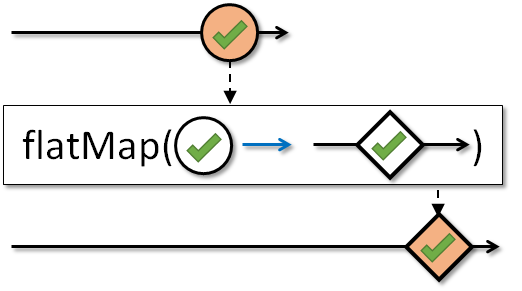
- Scheduler:
concatMapdoes not operate by default on a particularScheduler.
Note that flatMap and concatMap for Maybe is the same operation.
- Type Parameters:
R- the result value type- Parameters:
mapper- a function that, when applied to the item emitted by the source Maybe, returns a MaybeSource- Returns:
- the Maybe returned from
funcwhen applied to the item emitted by the source Maybe - See Also:
- ReactiveX operators documentation: FlatMap
-
concatWith
@BackpressureSupport(value=FULL) @CheckReturnValue @NonNull @SchedulerSupport(value="none") public final Flowable<T> concatWith(MaybeSource<? extends T> other)
Returns a Flowable that emits the items emitted from the current MaybeSource, then the next, one after the other, without interleaving them.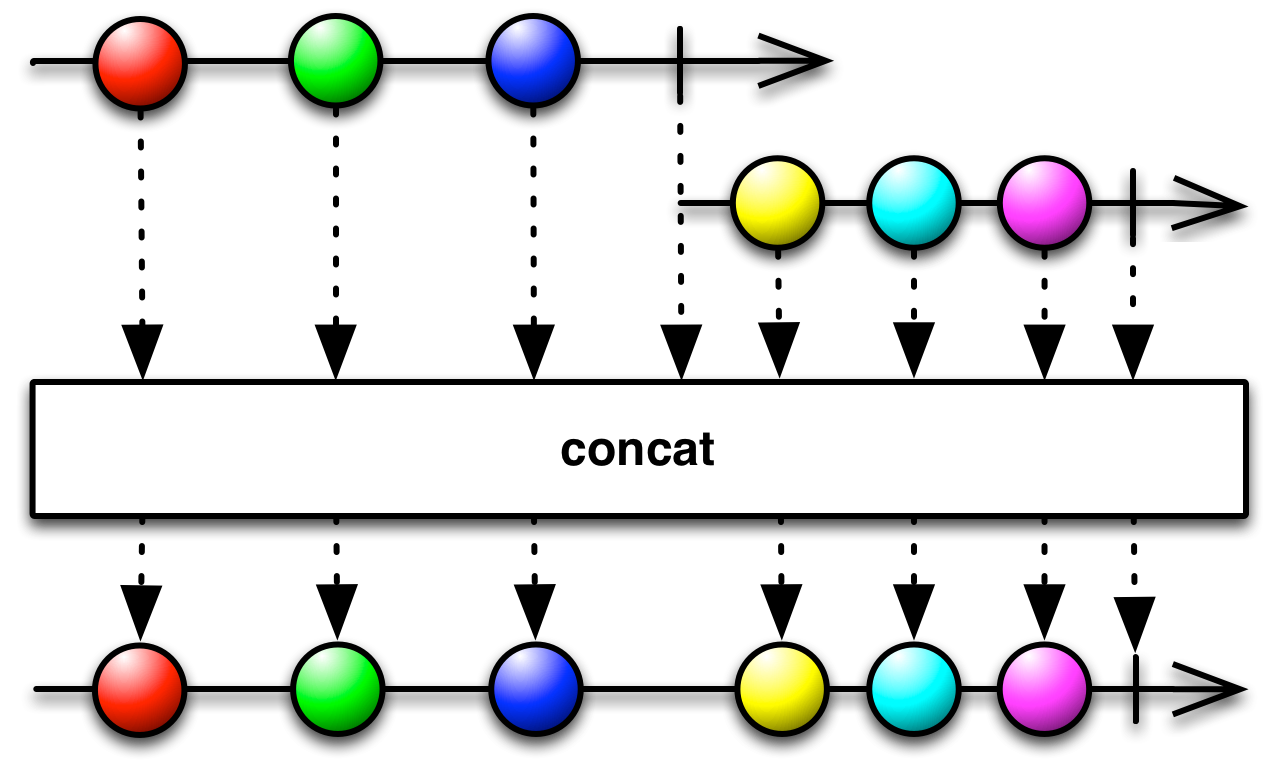
- Backpressure:
- The operator honors backpressure from downstream.
- Scheduler:
concatWithdoes not operate by default on a particularScheduler.
- Parameters:
other- a MaybeSource to be concatenated after the current- Returns:
- a Flowable that emits items emitted by the two source MaybeSources, one after the other, without interleaving them
- See Also:
- ReactiveX operators documentation: Concat
-
contains
@CheckReturnValue @NonNull @SchedulerSupport(value="none") public final Single<Boolean> contains(Object item)
Returns a Single that emits a Boolean that indicates whether the source Maybe emitted a specified item.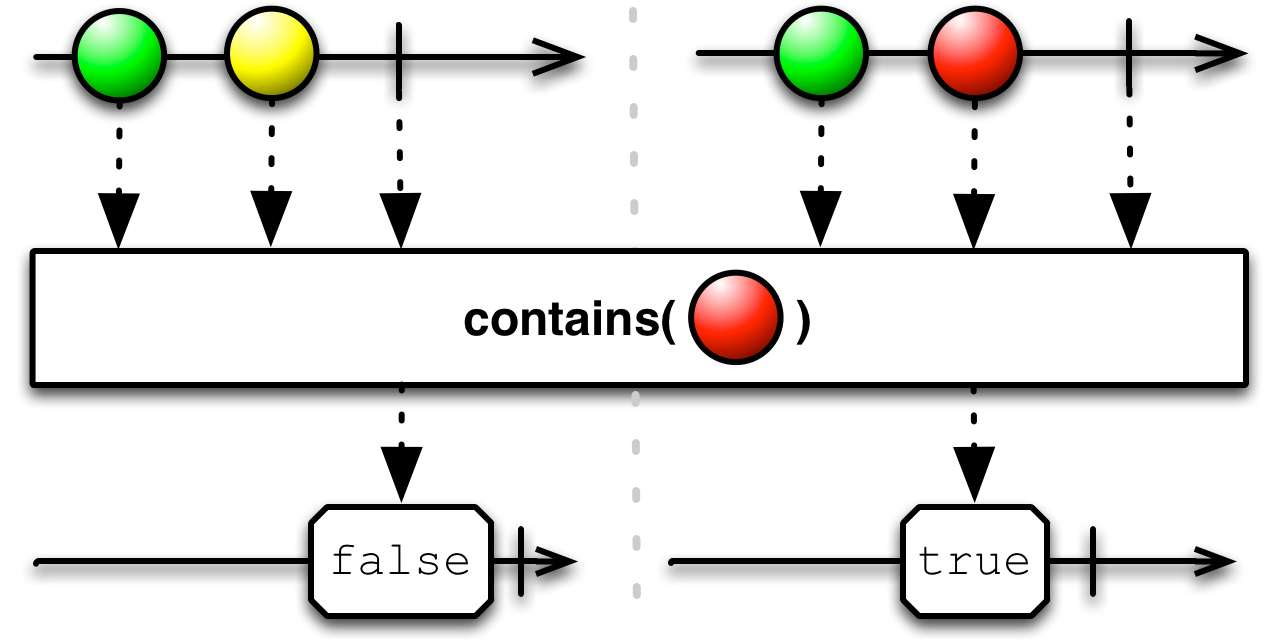
- Scheduler:
containsdoes not operate by default on a particularScheduler.
- Parameters:
item- the item to search for in the emissions from the source Maybe, not null- Returns:
- a Single that emits
trueif the specified item is emitted by the source Maybe, orfalseif the source Maybe completes without emitting that item - See Also:
- ReactiveX operators documentation: Contains
-
count
@CheckReturnValue @SchedulerSupport(value="none") public final Single<Long> count()
Returns a Single that counts the total number of items emitted (0 or 1) by the source Maybe and emits this count as a 64-bit Long.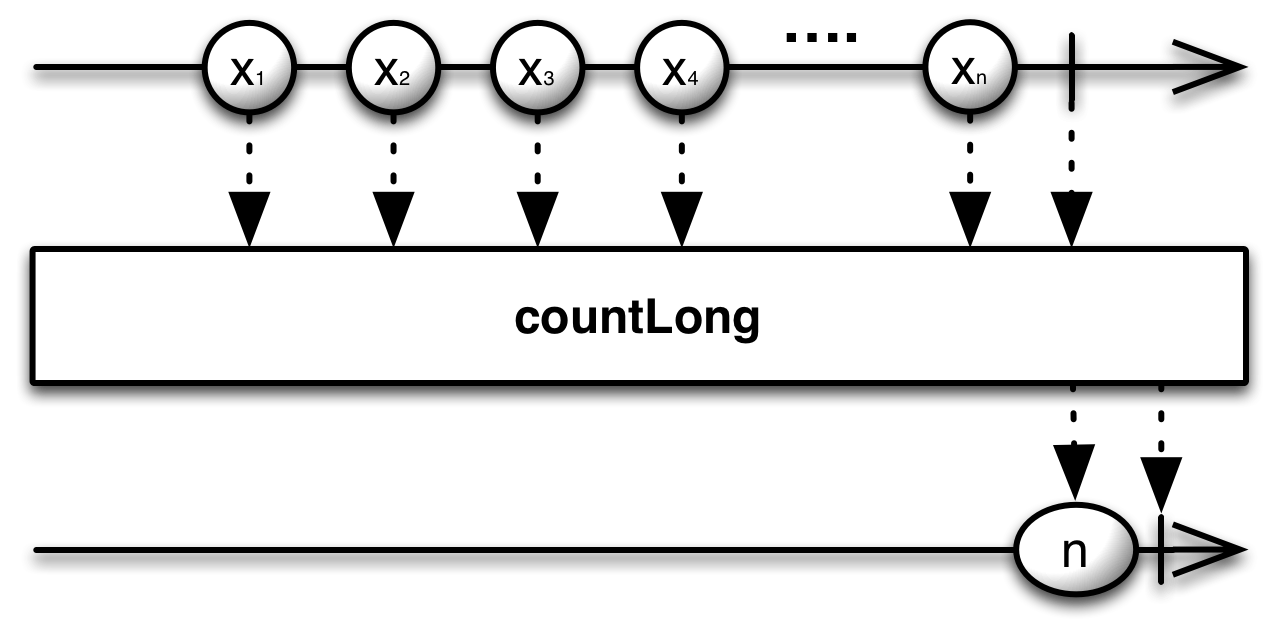
- Scheduler:
countdoes not operate by default on a particularScheduler.
- Returns:
- a Single that emits a single item: the number of items emitted by the source Maybe as a 64-bit Long item
- See Also:
- ReactiveX operators documentation: Count,
count()
-
defaultIfEmpty
@CheckReturnValue @NonNull @SchedulerSupport(value="none") public final Maybe<T> defaultIfEmpty(T defaultItem)
Returns a Maybe that emits the item emitted by the source Maybe or a specified default item if the source Maybe is empty.Note that the result Maybe is semantically equivalent to a
Single, since it's guaranteed to emit exactly one item or an error. SeetoSingle(Object)for a method with equivalent behavior which returns aSingle.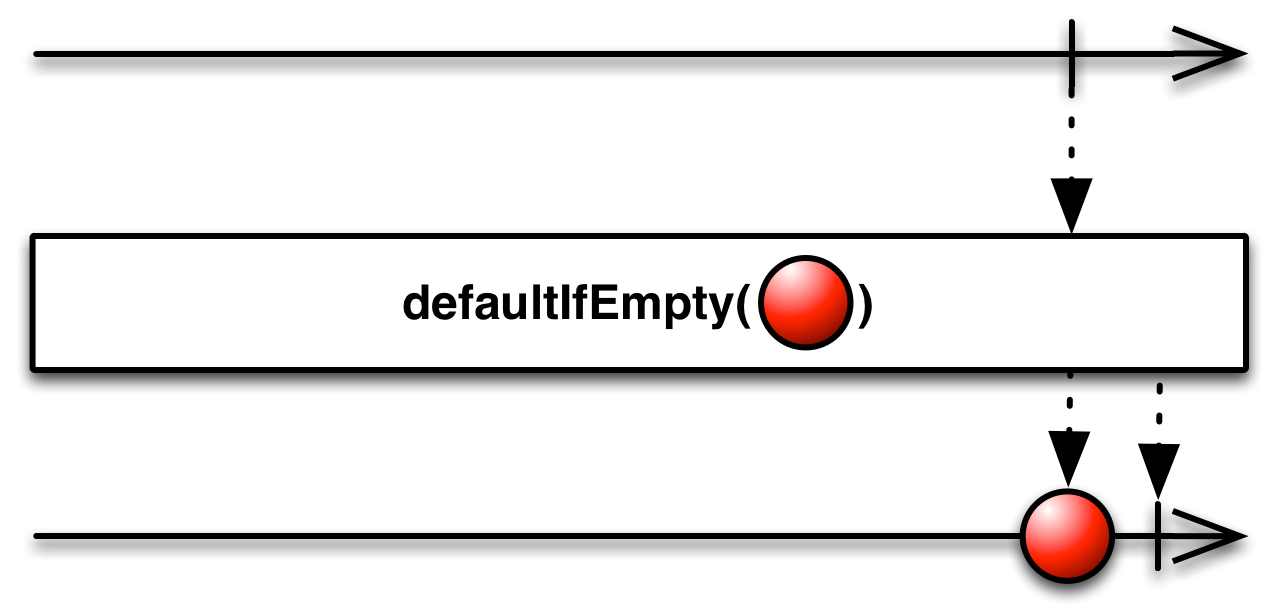
- Scheduler:
defaultIfEmptydoes not operate by default on a particularScheduler.
- Parameters:
defaultItem- the item to emit if the source Maybe emits no items- Returns:
- a Maybe that emits either the specified default item if the source Maybe emits no items, or the items emitted by the source Maybe
- See Also:
- ReactiveX operators documentation: DefaultIfEmpty
-
delay
@CheckReturnValue @SchedulerSupport(value="io.reactivex:computation") public final Maybe<T> delay(long delay, TimeUnit unit)
Returns a Maybe that signals the events emitted by the source Maybe shifted forward in time by a specified delay.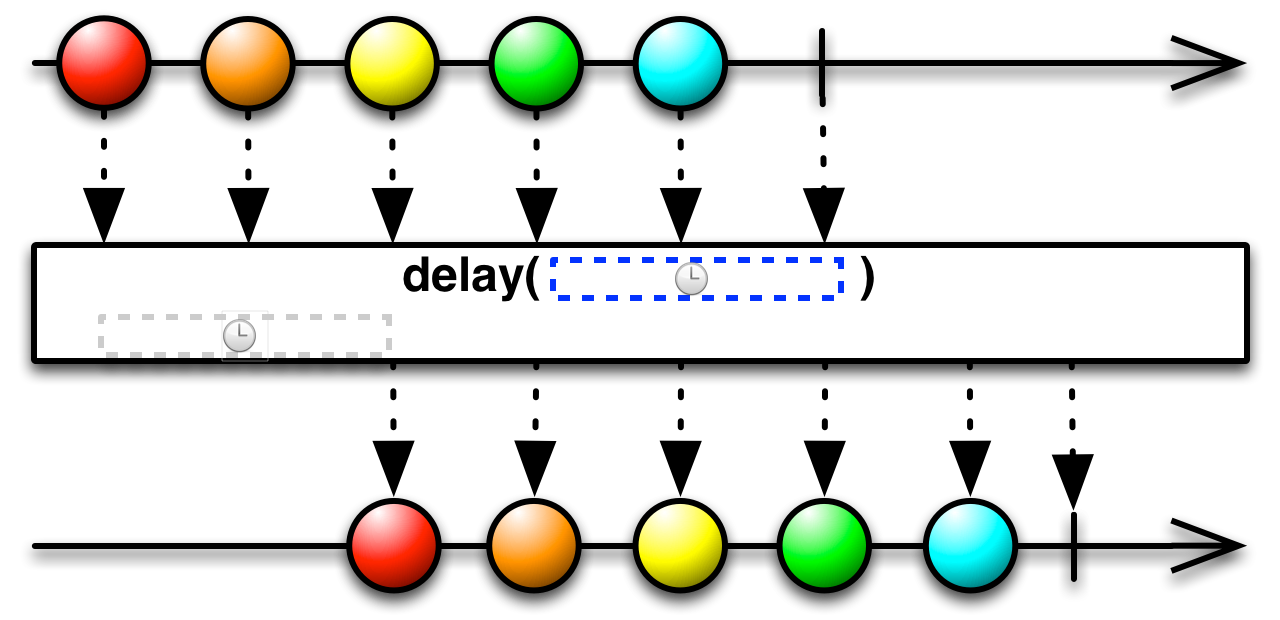
- Scheduler:
- This version of
delayoperates by default on thecomputationScheduler.
- Parameters:
delay- the delay to shift the source byunit- theTimeUnitin whichperiodis defined- Returns:
- the new Maybe instance
- See Also:
- ReactiveX operators documentation: Delay
-
delay
@CheckReturnValue @NonNull @SchedulerSupport(value="custom") public final Maybe<T> delay(long delay, TimeUnit unit, Scheduler scheduler)
Returns a Maybe that signals the events emitted by the source Maybe shifted forward in time by a specified delay running on the specified Scheduler.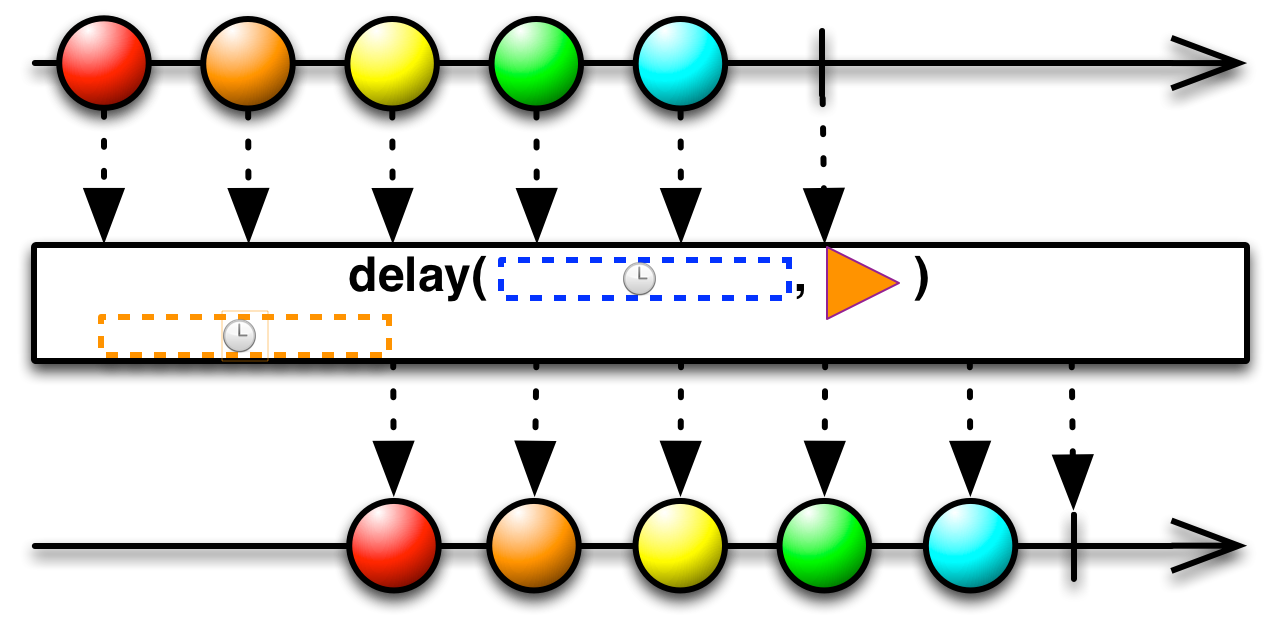
- Scheduler:
- you specify which
Schedulerthis operator will use.
- Parameters:
delay- the delay to shift the source byunit- the time unit ofdelayscheduler- theSchedulerto use for delaying- Returns:
- the new Maybe instance
- See Also:
- ReactiveX operators documentation: Delay
-
delay
@CheckReturnValue @NonNull @SchedulerSupport(value="none") @BackpressureSupport(value=UNBOUNDED_IN) public final <U,V> Maybe<T> delay(Publisher<U> delayIndicator)
Delays the emission of this Maybe until the given Publisher signals an item or completes.
- Backpressure:
- The
delayIndicatoris consumed in an unbounded manner but is cancelled after the first item it produces. - Scheduler:
- This version of
delaydoes not operate by default on a particularScheduler.
- Type Parameters:
U- the subscription delay value type (ignored)V- the item delay value type (ignored)- Parameters:
delayIndicator- the Publisher that gets subscribed to when this Maybe signals an event and that signal is emitted when the Publisher signals an item or completes- Returns:
- the new Maybe instance
- See Also:
- ReactiveX operators documentation: Delay
-
delaySubscription
@BackpressureSupport(value=UNBOUNDED_IN) @CheckReturnValue @NonNull @SchedulerSupport(value="none") public final <U> Maybe<T> delaySubscription(Publisher<U> subscriptionIndicator)
Returns a Maybe that delays the subscription to this Maybe until the other Publisher emits an element or completes normally.- Backpressure:
- The
Publishersource is consumed in an unbounded fashion (without applying backpressure). - Scheduler:
- This method does not operate by default on a particular
Scheduler.
- Type Parameters:
U- the value type of the other Publisher, irrelevant- Parameters:
subscriptionIndicator- the other Publisher that should trigger the subscription to this Publisher.- Returns:
- a Maybe that delays the subscription to this Maybe until the other Publisher emits an element or completes normally.
-
delaySubscription
@CheckReturnValue @SchedulerSupport(value="io.reactivex:computation") public final Maybe<T> delaySubscription(long delay, TimeUnit unit)
Returns a Maybe that delays the subscription to the source Maybe by a given amount of time.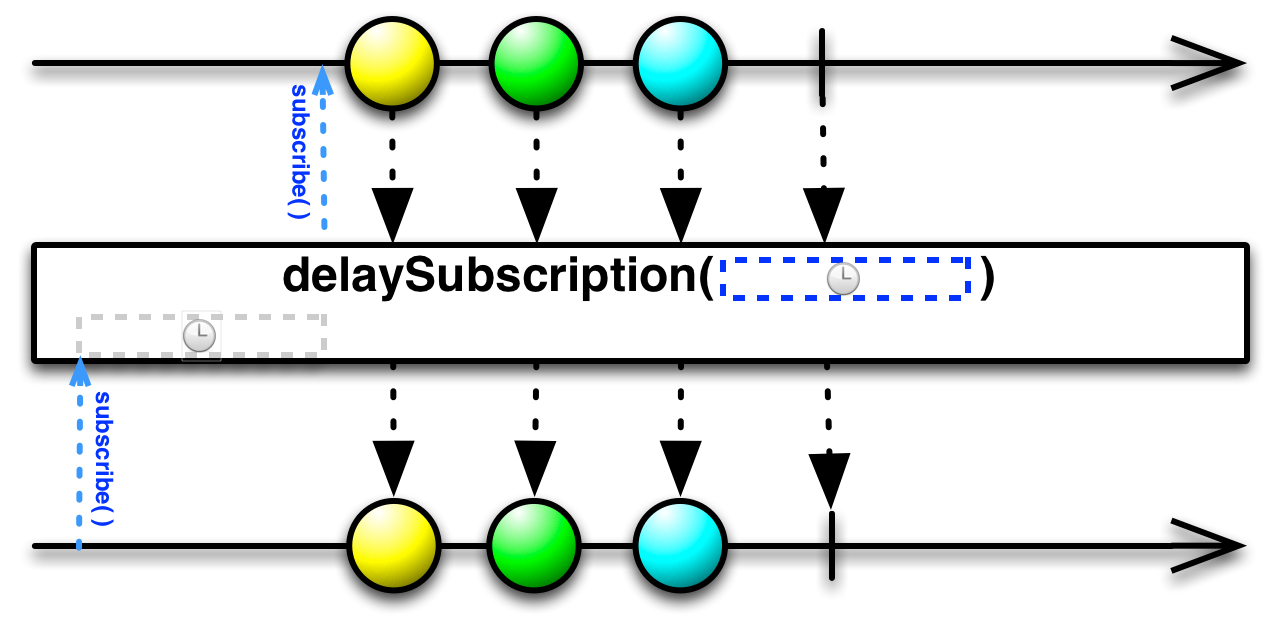
- Scheduler:
- This version of
delaySubscriptionoperates by default on thecomputationScheduler.
- Parameters:
delay- the time to delay the subscriptionunit- the time unit ofdelay- Returns:
- a Maybe that delays the subscription to the source Maybe by the given amount
- See Also:
- ReactiveX operators documentation: Delay
-
delaySubscription
@CheckReturnValue @SchedulerSupport(value="custom") public final Maybe<T> delaySubscription(long delay, TimeUnit unit, Scheduler scheduler)
Returns a Maybe that delays the subscription to the source Maybe by a given amount of time, both waiting and subscribing on a given Scheduler.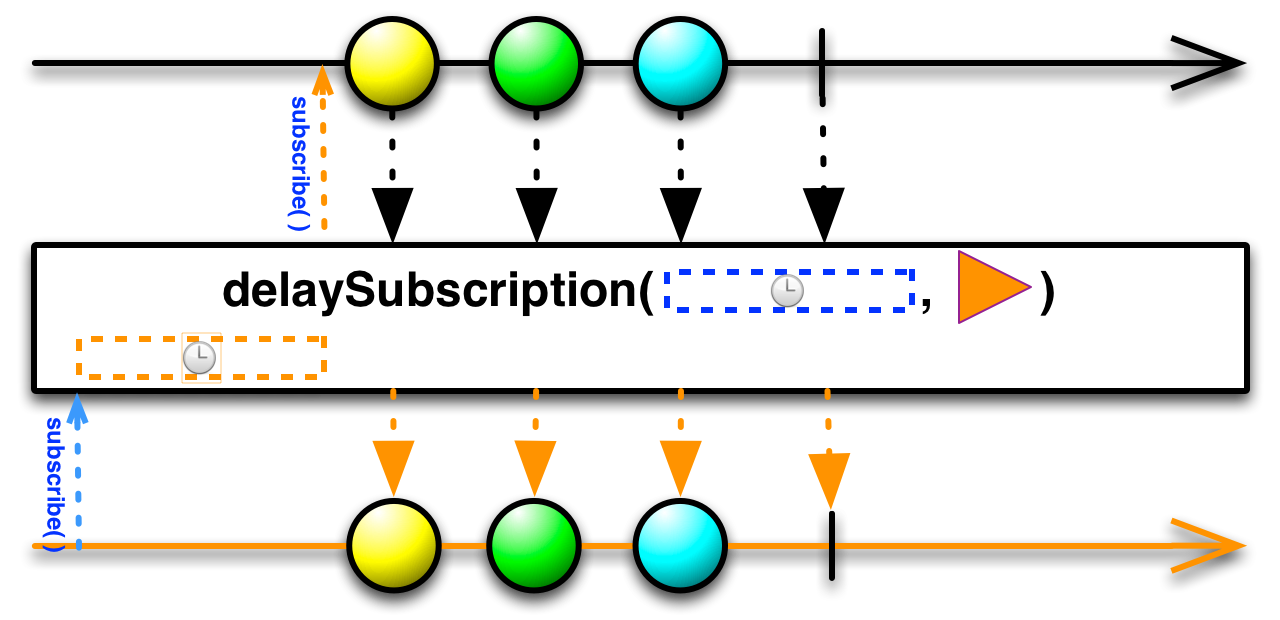
- Scheduler:
- You specify which
Schedulerthis operator will use.
- Parameters:
delay- the time to delay the subscriptionunit- the time unit ofdelayscheduler- the Scheduler on which the waiting and subscription will happen- Returns:
- a Maybe that delays the subscription to the source Maybe by a given amount, waiting and subscribing on the given Scheduler
- See Also:
- ReactiveX operators documentation: Delay
-
doAfterSuccess
@CheckReturnValue @NonNull @SchedulerSupport(value="none") public final Maybe<T> doAfterSuccess(Consumer<? super T> onAfterSuccess)
Calls the specified consumer with the success item after this item has been emitted to the downstream.Note that the
onAfterNextaction is shared between subscriptions and as such should be thread-safe.- Scheduler:
doAfterSuccessdoes not operate by default on a particularScheduler.
History: 2.0.1 - experimental
- Parameters:
onAfterSuccess- the Consumer that will be called after emitting an item from upstream to the downstream- Returns:
- the new Maybe instance
- Since:
- 2.1
-
doAfterTerminate
@CheckReturnValue @NonNull @SchedulerSupport(value="none") public final Maybe<T> doAfterTerminate(Action onAfterTerminate)
Registers anActionto be called when this Maybe invokes eitheronSuccess,onCompleteoronError.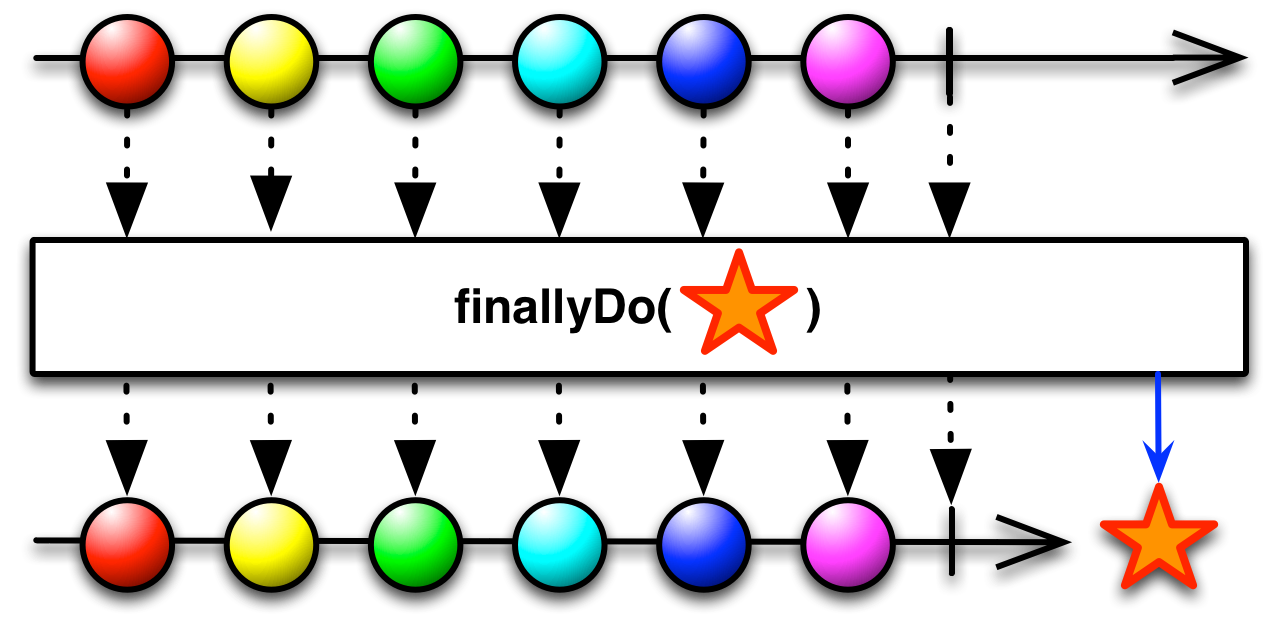
- Scheduler:
doAfterTerminatedoes not operate by default on a particularScheduler.
- Parameters:
onAfterTerminate- anActionto be invoked when the source Maybe finishes- Returns:
- a Maybe that emits the same items as the source Maybe, then invokes the
Action - See Also:
- ReactiveX operators documentation: Do
-
doFinally
@CheckReturnValue @NonNull @SchedulerSupport(value="none") public final Maybe<T> doFinally(Action onFinally)
Calls the specified action after this Maybe signals onSuccess, onError or onComplete or gets disposed by the downstream.In case of a race between a terminal event and a dispose call, the provided
onFinallyaction is executed once per subscription.Note that the
onFinallyaction is shared between subscriptions and as such should be thread-safe.- Scheduler:
doFinallydoes not operate by default on a particularScheduler.
History: 2.0.1 - experimental
- Parameters:
onFinally- the action called when this Maybe terminates or gets disposed- Returns:
- the new Maybe instance
- Since:
- 2.1
-
doOnDispose
@CheckReturnValue @NonNull @SchedulerSupport(value="none") public final Maybe<T> doOnDispose(Action onDispose)
Calls the sharedActionif a MaybeObserver subscribed to the current Maybe disposes the common Disposable it received via onSubscribe.- Scheduler:
doOnDisposedoes not operate by default on a particularScheduler.
- Parameters:
onDispose- the action called when the subscription is disposed- Returns:
- the new Maybe instance
- Throws:
NullPointerException- if onDispose is null
-
doOnComplete
@CheckReturnValue @NonNull @SchedulerSupport(value="none") public final Maybe<T> doOnComplete(Action onComplete)
Modifies the source Maybe so that it invokes an action when it callsonComplete.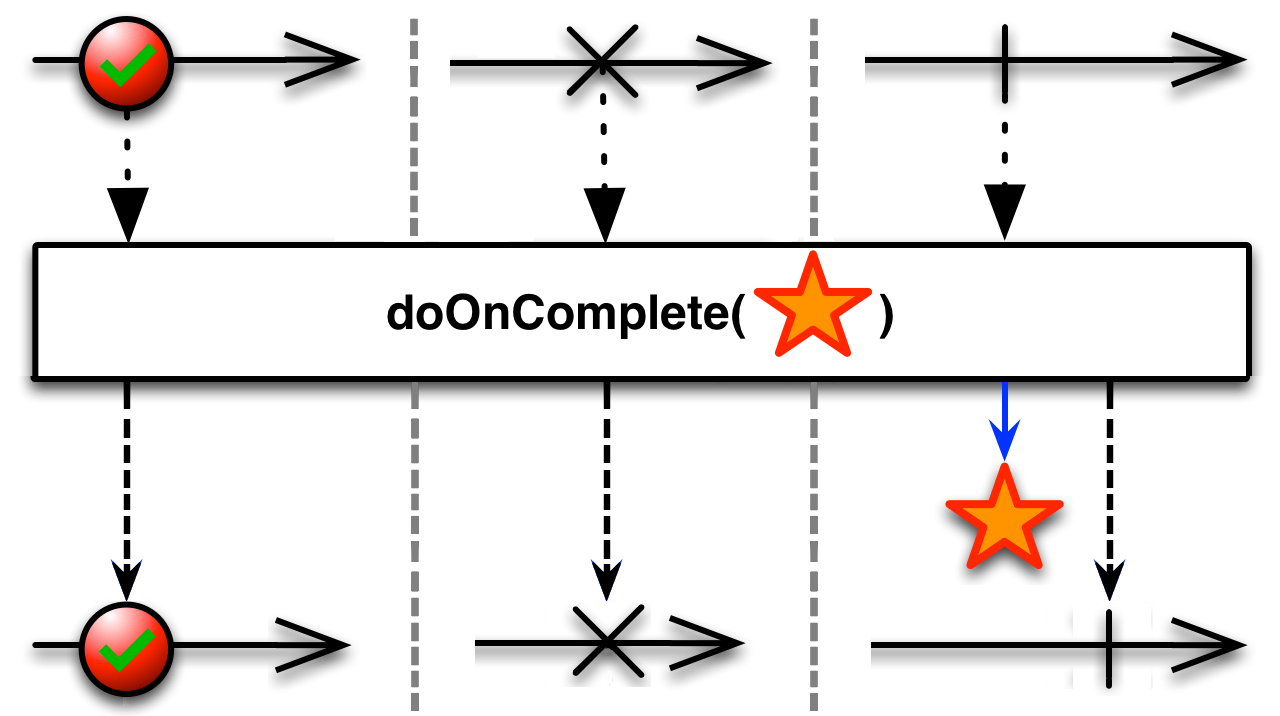
- Scheduler:
doOnCompletedoes not operate by default on a particularScheduler.
- Parameters:
onComplete- the action to invoke when the source Maybe callsonComplete- Returns:
- the new Maybe with the side-effecting behavior applied
- See Also:
- ReactiveX operators documentation: Do
-
doOnError
@CheckReturnValue @NonNull @SchedulerSupport(value="none") public final Maybe<T> doOnError(Consumer<? super Throwable> onError)
Calls the shared consumer with the error sent via onError for each MaybeObserver that subscribes to the current Maybe.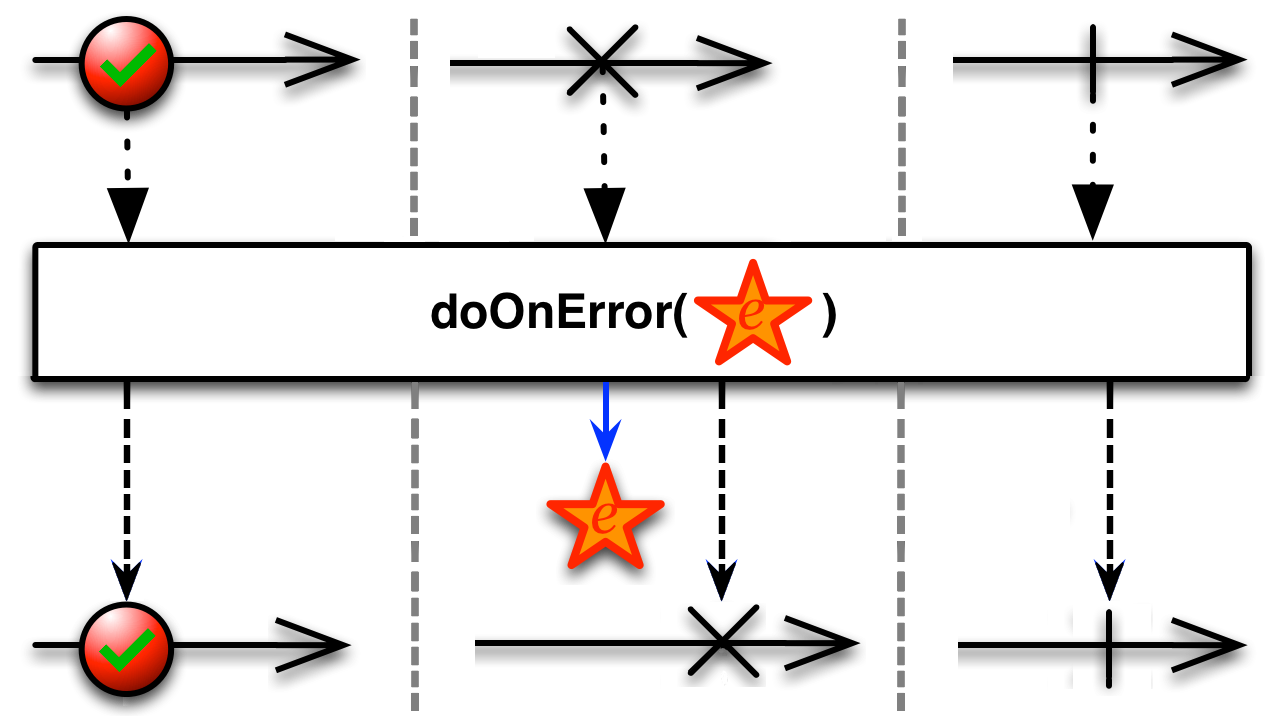
- Scheduler:
doOnErrordoes not operate by default on a particularScheduler.
- Parameters:
onError- the consumer called with the success value of onError- Returns:
- the new Maybe instance
-
doOnEvent
@CheckReturnValue @SchedulerSupport(value="none") public final Maybe<T> doOnEvent(BiConsumer<? super T,? super Throwable> onEvent)
Calls the given onEvent callback with the (success value, null) for an onSuccess, (null, throwable) for an onError or (null, null) for an onComplete signal from this Maybe before delivering said signal to the downstream.Exceptions thrown from the callback will override the event so the downstream receives the error instead of the original signal.
- Scheduler:
doOnEventdoes not operate by default on a particularScheduler.
- Parameters:
onEvent- the callback to call with the terminal event tuple- Returns:
- the new Maybe instance
-
doOnSubscribe
@CheckReturnValue @NonNull @SchedulerSupport(value="none") public final Maybe<T> doOnSubscribe(Consumer<? super Disposable> onSubscribe)
Calls the shared consumer with the Disposable sent through the onSubscribe for each MaybeObserver that subscribes to the current Maybe.- Scheduler:
doOnSubscribedoes not operate by default on a particularScheduler.
- Parameters:
onSubscribe- the consumer called with the Disposable sent via onSubscribe- Returns:
- the new Maybe instance
-
doOnTerminate
@CheckReturnValue @NonNull @SchedulerSupport(value="none") public final Maybe<T> doOnTerminate(Action onTerminate)
Returns a Maybe instance that calls the given onTerminate callback just before this Maybe completes normally or with an exception.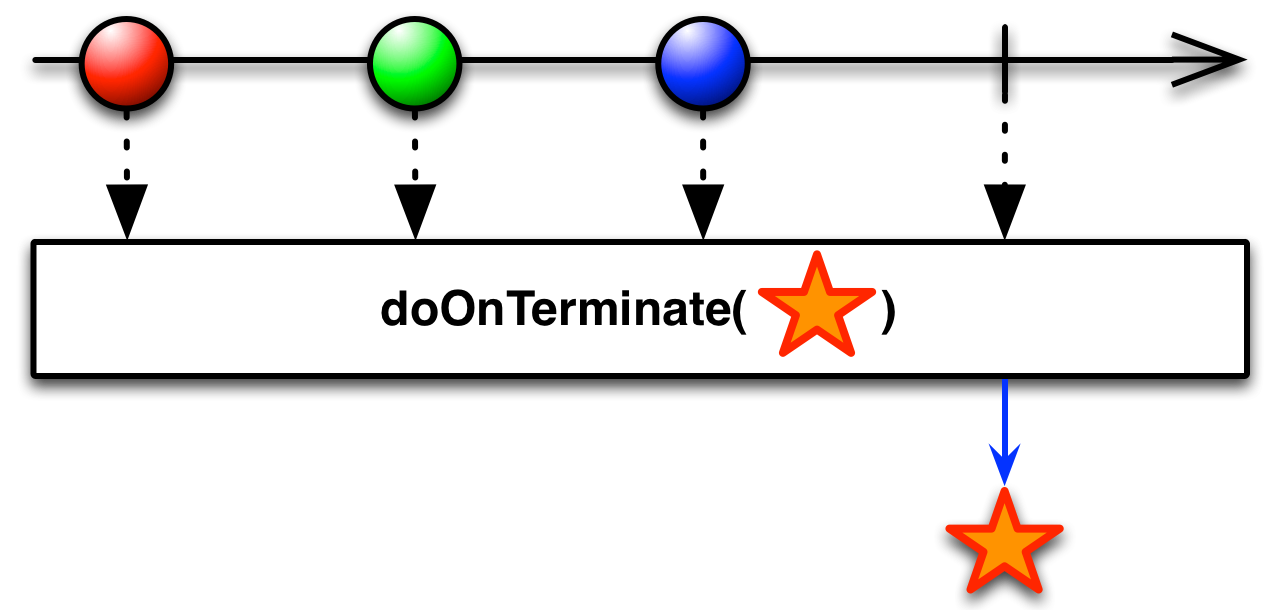
This differs from
doAfterTerminatein that this happens before theonCompleteoronErrornotification.- Scheduler:
doOnTerminatedoes not operate by default on a particularScheduler.
- Parameters:
onTerminate- the action to invoke when the consumer callsonCompleteoronError- Returns:
- the new Maybe instance
- Since:
- 2.2.7 - experimental
- See Also:
- ReactiveX operators documentation: Do,
doOnTerminate(Action)
-
doOnSuccess
@CheckReturnValue @NonNull @SchedulerSupport(value="none") public final Maybe<T> doOnSuccess(Consumer<? super T> onSuccess)
Calls the shared consumer with the success value sent via onSuccess for each MaybeObserver that subscribes to the current Maybe.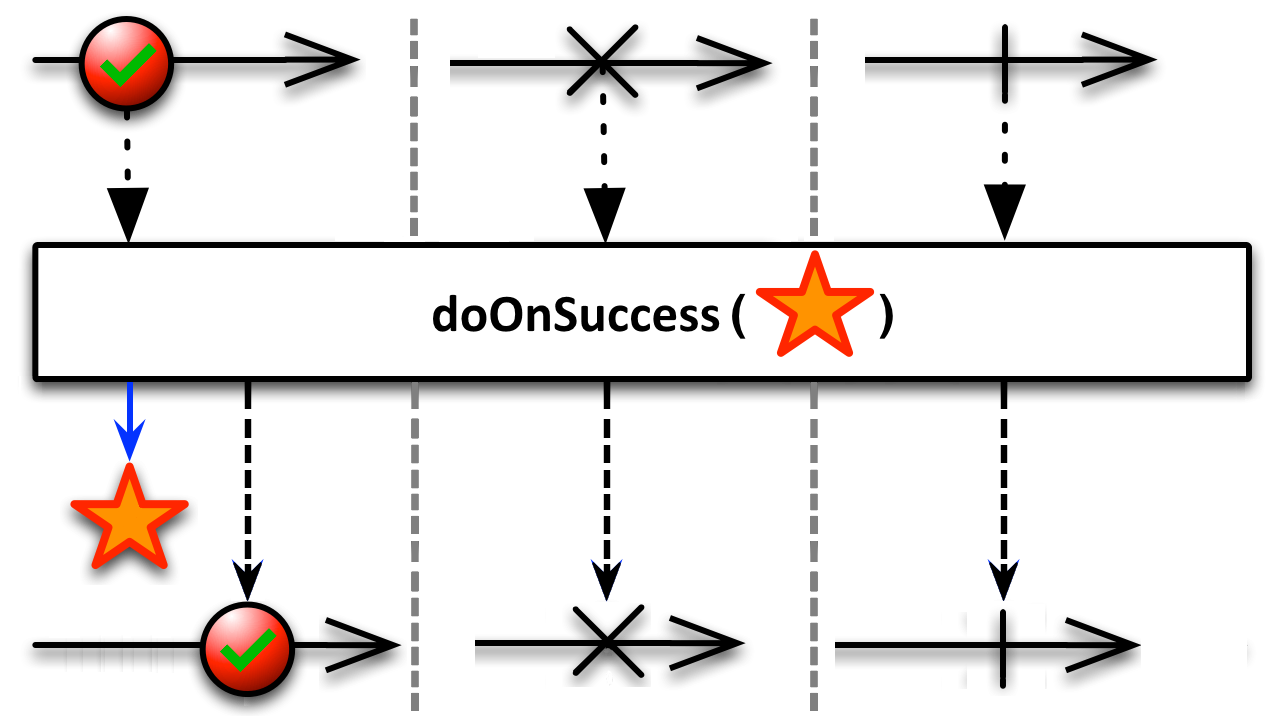
- Scheduler:
doOnSuccessdoes not operate by default on a particularScheduler.
- Parameters:
onSuccess- the consumer called with the success value of onSuccess- Returns:
- the new Maybe instance
-
filter
@CheckReturnValue @NonNull @SchedulerSupport(value="none") public final Maybe<T> filter(Predicate<? super T> predicate)
Filters the success item of the Maybe via a predicate function and emitting it if the predicate returns true, completing otherwise.
- Scheduler:
filterdoes not operate by default on a particularScheduler.
- Parameters:
predicate- a function that evaluates the item emitted by the source Maybe, returningtrueif it passes the filter- Returns:
- a Maybe that emit the item emitted by the source Maybe that the filter
evaluates as
true - See Also:
- ReactiveX operators documentation: Filter
-
flatMap
@CheckReturnValue @NonNull @SchedulerSupport(value="none") public final <R> Maybe<R> flatMap(Function<? super T,? extends MaybeSource<? extends R>> mapper)
Returns a Maybe that is based on applying a specified function to the item emitted by the source Maybe, where that function returns a MaybeSource.
- Scheduler:
flatMapdoes not operate by default on a particularScheduler.
Note that flatMap and concatMap for Maybe is the same operation.
- Type Parameters:
R- the result value type- Parameters:
mapper- a function that, when applied to the item emitted by the source Maybe, returns a MaybeSource- Returns:
- the Maybe returned from
funcwhen applied to the item emitted by the source Maybe - See Also:
- ReactiveX operators documentation: FlatMap
-
flatMap
@CheckReturnValue @NonNull @SchedulerSupport(value="none") public final <R> Maybe<R> flatMap(Function<? super T,? extends MaybeSource<? extends R>> onSuccessMapper, Function<? super Throwable,? extends MaybeSource<? extends R>> onErrorMapper, Callable<? extends MaybeSource<? extends R>> onCompleteSupplier)
Maps the onSuccess, onError or onComplete signals of this Maybe into MaybeSource and emits that MaybeSource's signals.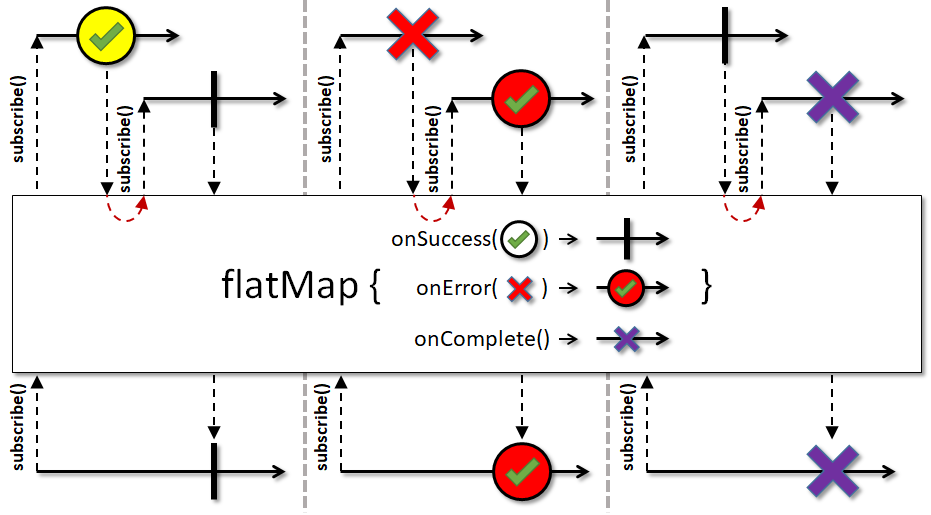
- Scheduler:
flatMapdoes not operate by default on a particularScheduler.
- Type Parameters:
R- the result type- Parameters:
onSuccessMapper- a function that returns a MaybeSource to merge for the onSuccess item emitted by this MaybeonErrorMapper- a function that returns a MaybeSource to merge for an onError notification from this MaybeonCompleteSupplier- a function that returns a MaybeSource to merge for an onComplete notification this Maybe- Returns:
- the new Maybe instance
- See Also:
- ReactiveX operators documentation: FlatMap
-
flatMap
@CheckReturnValue @NonNull @SchedulerSupport(value="none") public final <U,R> Maybe<R> flatMap(Function<? super T,? extends MaybeSource<? extends U>> mapper, BiFunction<? super T,? super U,? extends R> resultSelector)
Returns a Maybe that emits the results of a specified function to the pair of values emitted by the source Maybe and a specified mapped MaybeSource.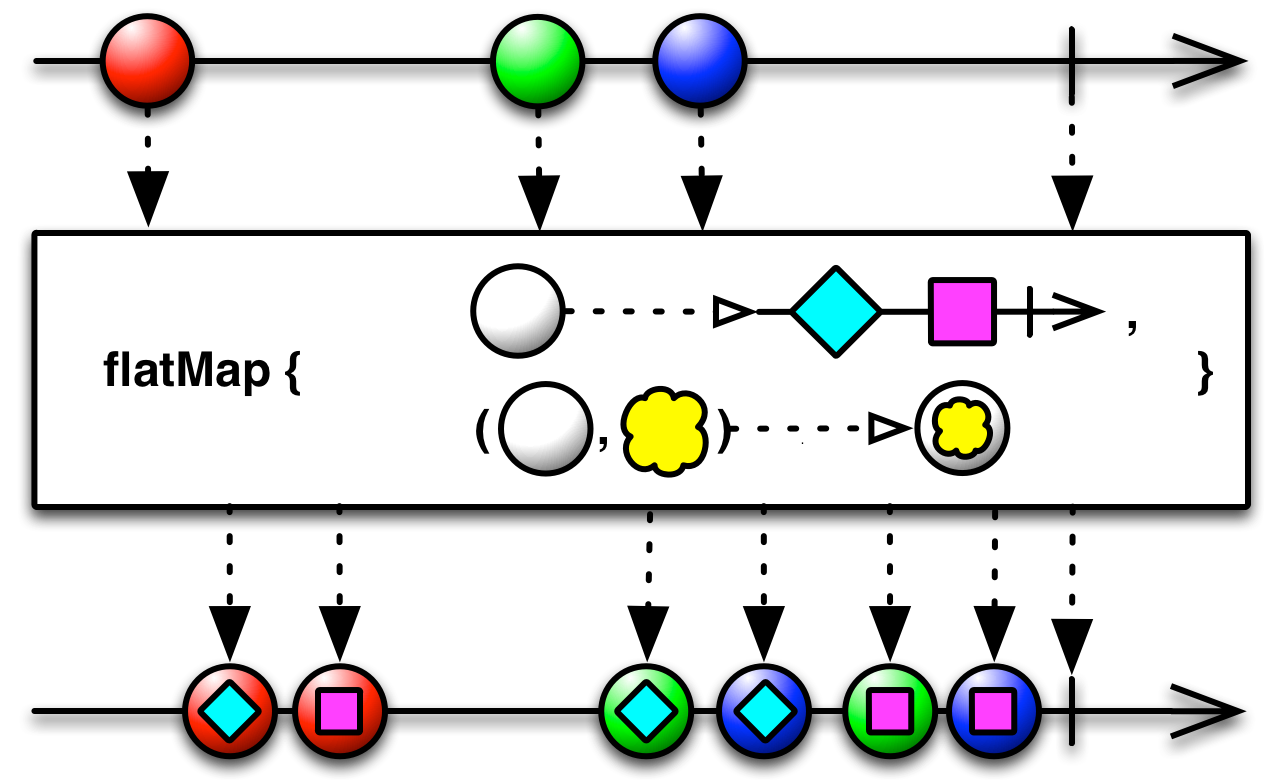
- Scheduler:
flatMapdoes not operate by default on a particularScheduler.
- Type Parameters:
U- the type of items emitted by the MaybeSource returned by themapperfunctionR- the type of items emitted by the resulting Maybe- Parameters:
mapper- a function that returns a MaybeSource for the item emitted by the source MayberesultSelector- a function that combines one item emitted by each of the source and collection MaybeSource and returns an item to be emitted by the resulting MaybeSource- Returns:
- the new Maybe instance
- See Also:
- ReactiveX operators documentation: FlatMap
-
flattenAsFlowable
@BackpressureSupport(value=FULL) @CheckReturnValue @NonNull @SchedulerSupport(value="none") public final <U> Flowable<U> flattenAsFlowable(Function<? super T,? extends Iterable<? extends U>> mapper)
Maps the success value of the upstreamMaybeinto anIterableand emits its items as aFlowablesequence.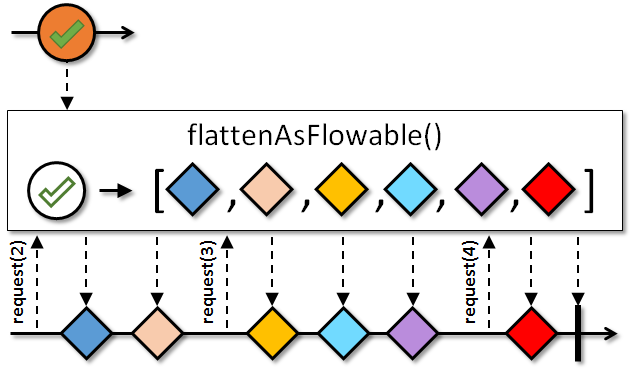
- Backpressure:
- The operator honors backpressure from downstream.
- Scheduler:
flattenAsFlowabledoes not operate by default on a particularScheduler.
- Type Parameters:
U- the type of item emitted by the resulting Iterable- Parameters:
mapper- a function that returns an Iterable sequence of values for when given an item emitted by the source Maybe- Returns:
- the new Flowable instance
- See Also:
- ReactiveX operators documentation: FlatMap
-
flattenAsObservable
@CheckReturnValue @NonNull @SchedulerSupport(value="none") public final <U> Observable<U> flattenAsObservable(Function<? super T,? extends Iterable<? extends U>> mapper)
Maps the success value of the upstreamMaybeinto anIterableand emits its items as anObservablesequence.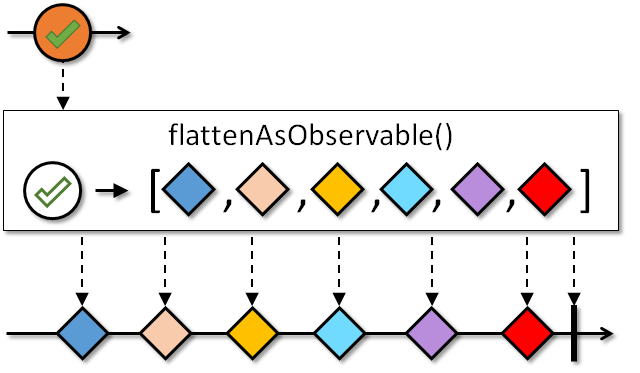
- Scheduler:
flattenAsObservabledoes not operate by default on a particularScheduler.
- Type Parameters:
U- the type of item emitted by the resulting Iterable- Parameters:
mapper- a function that returns an Iterable sequence of values for when given an item emitted by the source Maybe- Returns:
- the new Observable instance
- See Also:
- ReactiveX operators documentation: FlatMap
-
flatMapObservable
@CheckReturnValue @NonNull @SchedulerSupport(value="none") public final <R> Observable<R> flatMapObservable(Function<? super T,? extends ObservableSource<? extends R>> mapper)
Returns an Observable that is based on applying a specified function to the item emitted by the source Maybe, where that function returns an ObservableSource.
- Scheduler:
flatMapObservabledoes not operate by default on a particularScheduler.
- Type Parameters:
R- the result value type- Parameters:
mapper- a function that, when applied to the item emitted by the source Maybe, returns an ObservableSource- Returns:
- the Observable returned from
funcwhen applied to the item emitted by the source Maybe - See Also:
- ReactiveX operators documentation: FlatMap
-
flatMapPublisher
@BackpressureSupport(value=FULL) @CheckReturnValue @NonNull @SchedulerSupport(value="none") public final <R> Flowable<R> flatMapPublisher(Function<? super T,? extends Publisher<? extends R>> mapper)
Returns a Flowable that emits items based on applying a specified function to the item emitted by the source Maybe, where that function returns a Publisher.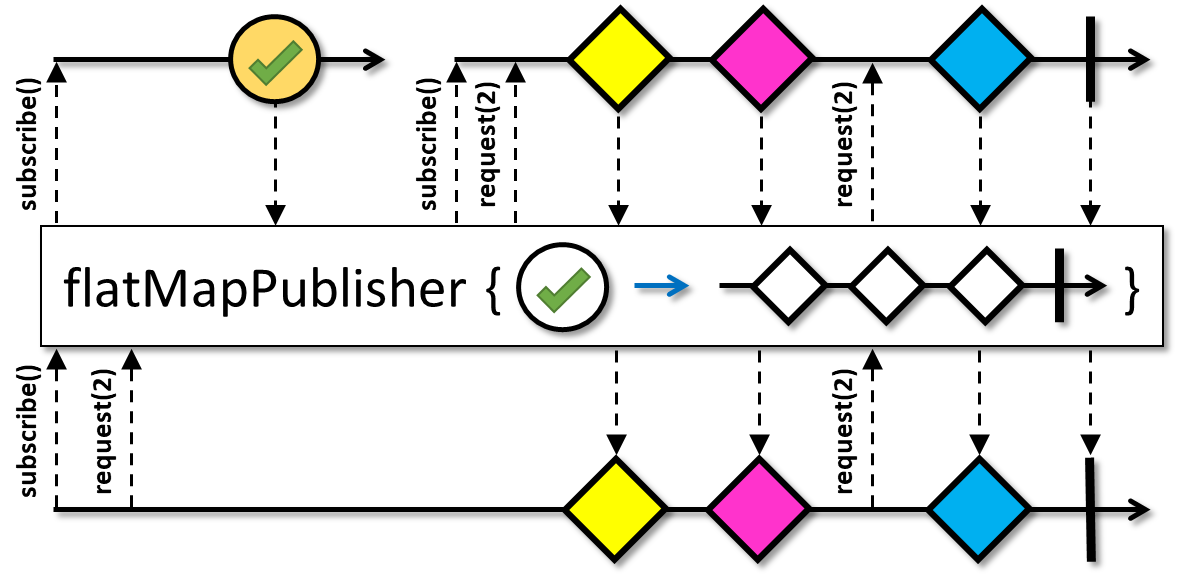
- Backpressure:
- The returned Flowable honors the downstream backpressure.
- Scheduler:
flatMapPublisherdoes not operate by default on a particularScheduler.
- Type Parameters:
R- the result value type- Parameters:
mapper- a function that, when applied to the item emitted by the source Maybe, returns a Flowable- Returns:
- the Flowable returned from
funcwhen applied to the item emitted by the source Maybe - See Also:
- ReactiveX operators documentation: FlatMap
-
flatMapSingle
@CheckReturnValue @NonNull @SchedulerSupport(value="none") public final <R> Single<R> flatMapSingle(Function<? super T,? extends SingleSource<? extends R>> mapper)
Returns aSinglebased on applying a specified function to the item emitted by the sourceMaybe, where that function returns aSingle. When this Maybe completes aNoSuchElementExceptionwill be thrown.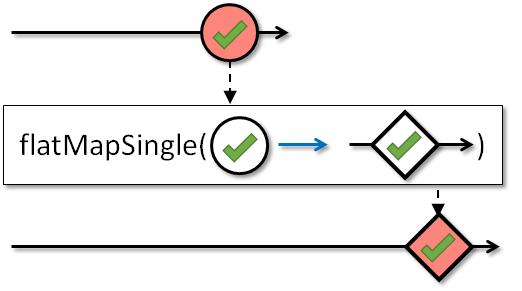
- Scheduler:
flatMapSingledoes not operate by default on a particularScheduler.
- Type Parameters:
R- the result value type- Parameters:
mapper- a function that, when applied to the item emitted by the source Maybe, returns a Single- Returns:
- the Single returned from
mapperwhen applied to the item emitted by the source Maybe - See Also:
- ReactiveX operators documentation: FlatMap
-
flatMapSingleElement
@CheckReturnValue @NonNull @SchedulerSupport(value="none") public final <R> Maybe<R> flatMapSingleElement(Function<? super T,? extends SingleSource<? extends R>> mapper)
Returns aMaybebased on applying a specified function to the item emitted by the sourceMaybe, where that function returns aSingle. When this Maybe just completes the resultingMaybecompletes as well.
- Scheduler:
flatMapSingleElementdoes not operate by default on a particularScheduler.
History: 2.0.2 - experimental
- Type Parameters:
R- the result value type- Parameters:
mapper- a function that, when applied to the item emitted by the source Maybe, returns a Single- Returns:
- the new Maybe instance
- Since:
- 2.1
- See Also:
- ReactiveX operators documentation: FlatMap
-
flatMapCompletable
@CheckReturnValue @NonNull @SchedulerSupport(value="none") public final Completable flatMapCompletable(Function<? super T,? extends CompletableSource> mapper)
Returns aCompletablethat completes based on applying a specified function to the item emitted by the sourceMaybe, where that function returns aCompletable.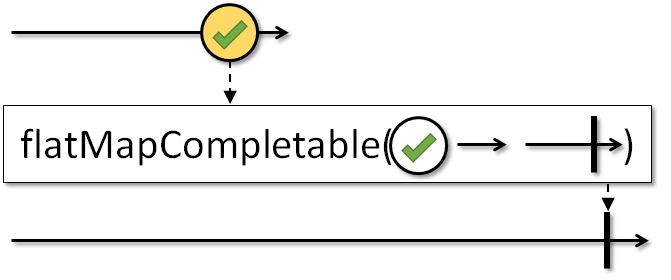
- Scheduler:
flatMapCompletabledoes not operate by default on a particularScheduler.
- Parameters:
mapper- a function that, when applied to the item emitted by the source Maybe, returns a Completable- Returns:
- the Completable returned from
mapperwhen applied to the item emitted by the source Maybe - See Also:
- ReactiveX operators documentation: FlatMap
-
hide
@CheckReturnValue @SchedulerSupport(value="none") public final Maybe<T> hide()
Hides the identity of this Maybe and its Disposable.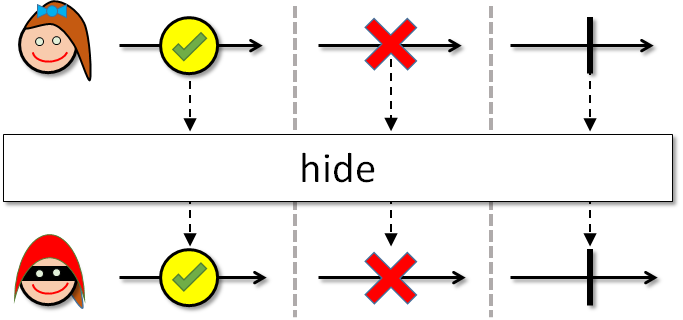
Allows preventing certain identity-based optimizations (fusion).
- Scheduler:
hidedoes not operate by default on a particularScheduler.
- Returns:
- the new Maybe instance
-
ignoreElement
@CheckReturnValue @SchedulerSupport(value="none") public final Completable ignoreElement()
Ignores the item emitted by the source Maybe and only callsonCompleteoronError.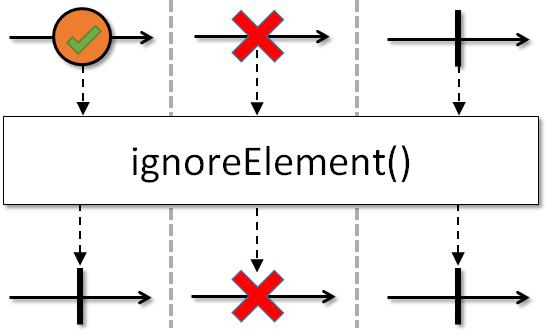
- Scheduler:
ignoreElementdoes not operate by default on a particularScheduler.
- Returns:
- an empty Completable that only calls
onCompleteoronError, based on which one is called by the source Maybe - See Also:
- ReactiveX operators documentation: IgnoreElements
-
isEmpty
@CheckReturnValue @SchedulerSupport(value="none") public final Single<Boolean> isEmpty()
Returns a Single that emitstrueif the source Maybe is empty, otherwisefalse.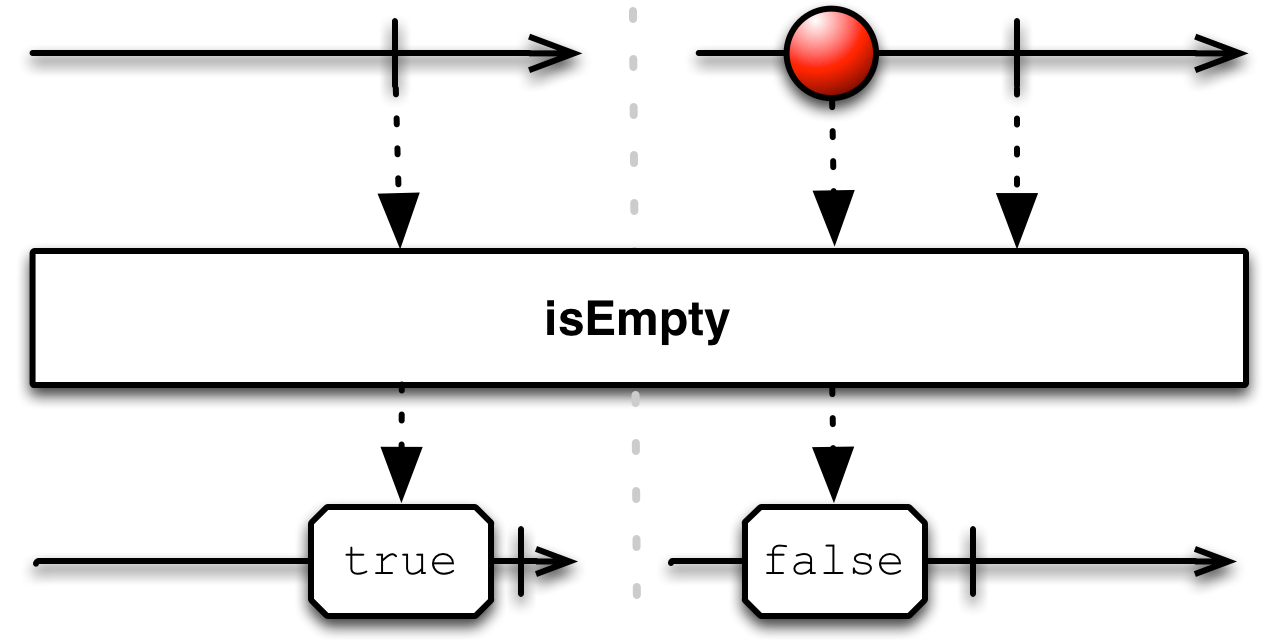
- Scheduler:
isEmptydoes not operate by default on a particularScheduler.
- Returns:
- a Single that emits a Boolean
- See Also:
- ReactiveX operators documentation: Contains
-
lift
@CheckReturnValue @NonNull @SchedulerSupport(value="none") public final <R> Maybe<R> lift(MaybeOperator<? extends R,? super T> lift)
This method requires advanced knowledge about building operators, please consider other standard composition methods first; Returns aMaybewhich, when subscribed to, invokes theapply(MaybeObserver)method of the providedMaybeOperatorfor each individual downstreamMaybeand allows the insertion of a custom operator by accessing the downstream'sMaybeObserverduring this subscription phase and providing a newMaybeObserver, containing the custom operator's intended business logic, that will be used in the subscription process going further upstream.Generally, such a new
MaybeObserverwill wrap the downstream'sMaybeObserverand forwards theonSuccess,onErrorandonCompleteevents from the upstream directly or according to the emission pattern the custom operator's business logic requires. In addition, such operator can intercept the flow control calls ofdisposeandisDisposedthat would have traveled upstream and perform additional actions depending on the same business logic requirements.Example:
// Step 1: Create the consumer type that will be returned by the MaybeOperator.apply(): public final class CustomMaybeObserver<T> implements MaybeObserver<T>, Disposable { // The downstream's MaybeObserver that will receive the onXXX events final MaybeObserver<? super String> downstream; // The connection to the upstream source that will call this class' onXXX methods Disposable upstream; // The constructor takes the downstream subscriber and usually any other parameters public CustomMaybeObserver(MaybeObserver<? super String> downstream) { this.downstream = downstream; } // In the subscription phase, the upstream sends a Disposable to this class // and subsequently this class has to send a Disposable to the downstream. // Note that relaying the upstream's Disposable directly is not allowed in RxJava @Override public void onSubscribe(Disposable d) { if (upstream != null) { d.dispose(); } else { upstream = d; downstream.onSubscribe(this); } } // The upstream calls this with the next item and the implementation's // responsibility is to emit an item to the downstream based on the intended // business logic, or if it can't do so for the particular item, // request more from the upstream @Override public void onSuccess(T item) { String str = item.toString(); if (str.length() < 2) { downstream.onSuccess(str); } else { // Maybe is usually expected to produce one of the onXXX events downstream.onComplete(); } } // Some operators may handle the upstream's error while others // could just forward it to the downstream. @Override public void onError(Throwable throwable) { downstream.onError(throwable); } // When the upstream completes, usually the downstream should complete as well. @Override public void onComplete() { downstream.onComplete(); } // Some operators may use their own resources which should be cleaned up if // the downstream disposes the flow before it completed. Operators without // resources can simply forward the dispose to the upstream. // In some cases, a disposed flag may be set by this method so that other parts // of this class may detect the dispose and stop sending events // to the downstream. @Override public void dispose() { upstream.dispose(); } // Some operators may simply forward the call to the upstream while others // can return the disposed flag set in dispose(). @Override public boolean isDisposed() { return upstream.isDisposed(); } } // Step 2: Create a class that implements the MaybeOperator interface and // returns the custom consumer type from above in its apply() method. // Such class may define additional parameters to be submitted to // the custom consumer type. final class CustomMaybeOperator<T> implements MaybeOperator<String> { @Override public MaybeObserver<? super String> apply(MaybeObserver<? super T> upstream) { return new CustomMaybeObserver<T>(upstream); } } // Step 3: Apply the custom operator via lift() in a flow by creating an instance of it // or reusing an existing one. Maybe.just(5) .lift(new CustomMaybeOperator<Integer>()) .test() .assertResult("5"); Maybe.just(15) .lift(new CustomMaybeOperator<Integer>()) .test() .assertResult();Creating custom operators can be complicated and it is recommended one consults the RxJava wiki: Writing operators page about the tools, requirements, rules, considerations and pitfalls of implementing them.
Note that implementing custom operators via this
lift()method adds slightly more overhead by requiring an additional allocation and indirection per assembled flows. Instead, extending the abstractMaybeclass and creating aMaybeTransformerwith it is recommended.Note also that it is not possible to stop the subscription phase in
lift()as theapply()method requires a non-nullMaybeObserverinstance to be returned, which is then unconditionally subscribed to the upstreamMaybe. For example, if the operator decided there is no reason to subscribe to the upstream source because of some optimization possibility or a failure to prepare the operator, it still has to return aMaybeObserverthat should immediately dispose the upstream'sDisposablein itsonSubscribemethod. Again, using aMaybeTransformerand extending theMaybeis a better option assubscribeActual(io.reactivex.MaybeObserver<? super T>)can decide to not subscribe to its upstream after all.- Scheduler:
liftdoes not operate by default on a particularScheduler, however, theMaybeOperatormay use aSchedulerto support its own asynchronous behavior.
- Type Parameters:
R- the output value type- Parameters:
lift- theMaybeOperatorthat receives the downstream'sMaybeObserverand should return aMaybeObserverwith custom behavior to be used as the consumer for the currentMaybe.- Returns:
- the new Maybe instance
- See Also:
- RxJava wiki: Writing operators,
compose(MaybeTransformer)
-
map
@CheckReturnValue @NonNull @SchedulerSupport(value="none") public final <R> Maybe<R> map(Function<? super T,? extends R> mapper)
Returns a Maybe that applies a specified function to the item emitted by the source Maybe and emits the result of this function application.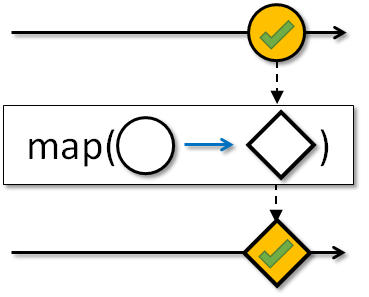
- Scheduler:
mapdoes not operate by default on a particularScheduler.
- Type Parameters:
R- the result value type- Parameters:
mapper- a function to apply to the item emitted by the Maybe- Returns:
- a Maybe that emits the item from the source Maybe, transformed by the specified function
- See Also:
- ReactiveX operators documentation: Map
-
materialize
@CheckReturnValue @SchedulerSupport(value="none") public final Single<Notification<T>> materialize()
Maps the signal types of this Maybe into aNotificationof the same kind and emits it as a single success value to downstream.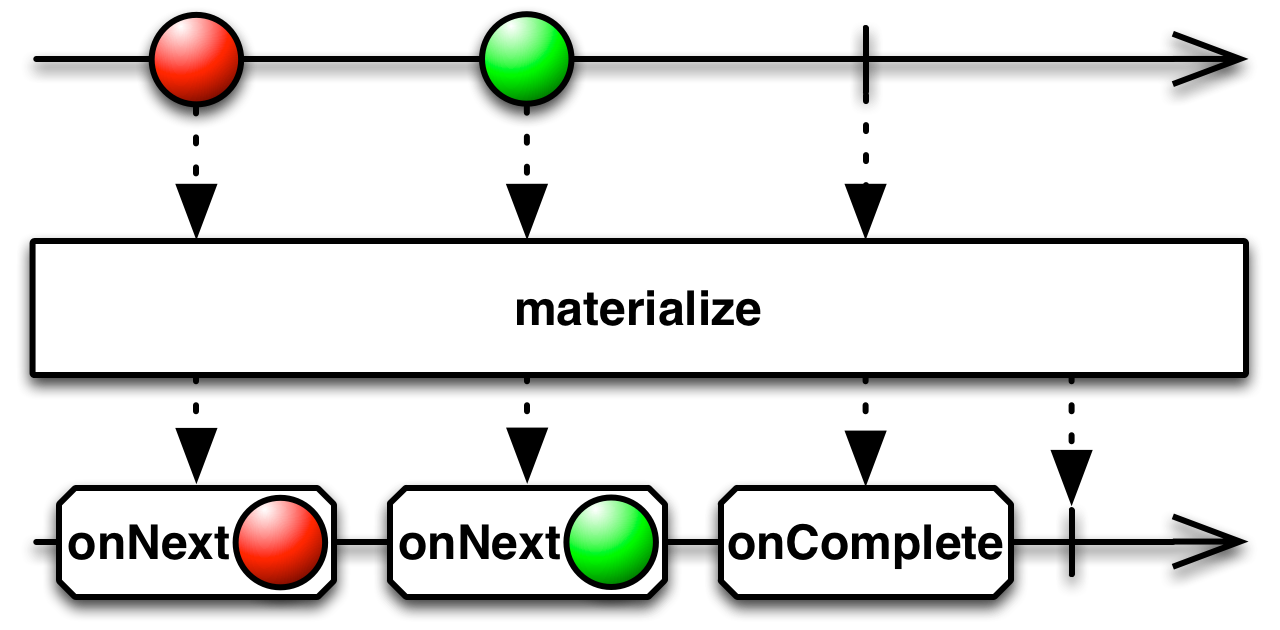
- Scheduler:
materializedoes not operate by default on a particularScheduler.
- Returns:
- the new Single instance
- Since:
- 2.2.4 - experimental
- See Also:
Single.dematerialize(Function)
-
mergeWith
@BackpressureSupport(value=FULL) @CheckReturnValue @NonNull @SchedulerSupport(value="none") public final Flowable<T> mergeWith(MaybeSource<? extends T> other)
Flattens this and another Maybe into a single Flowable, without any transformation.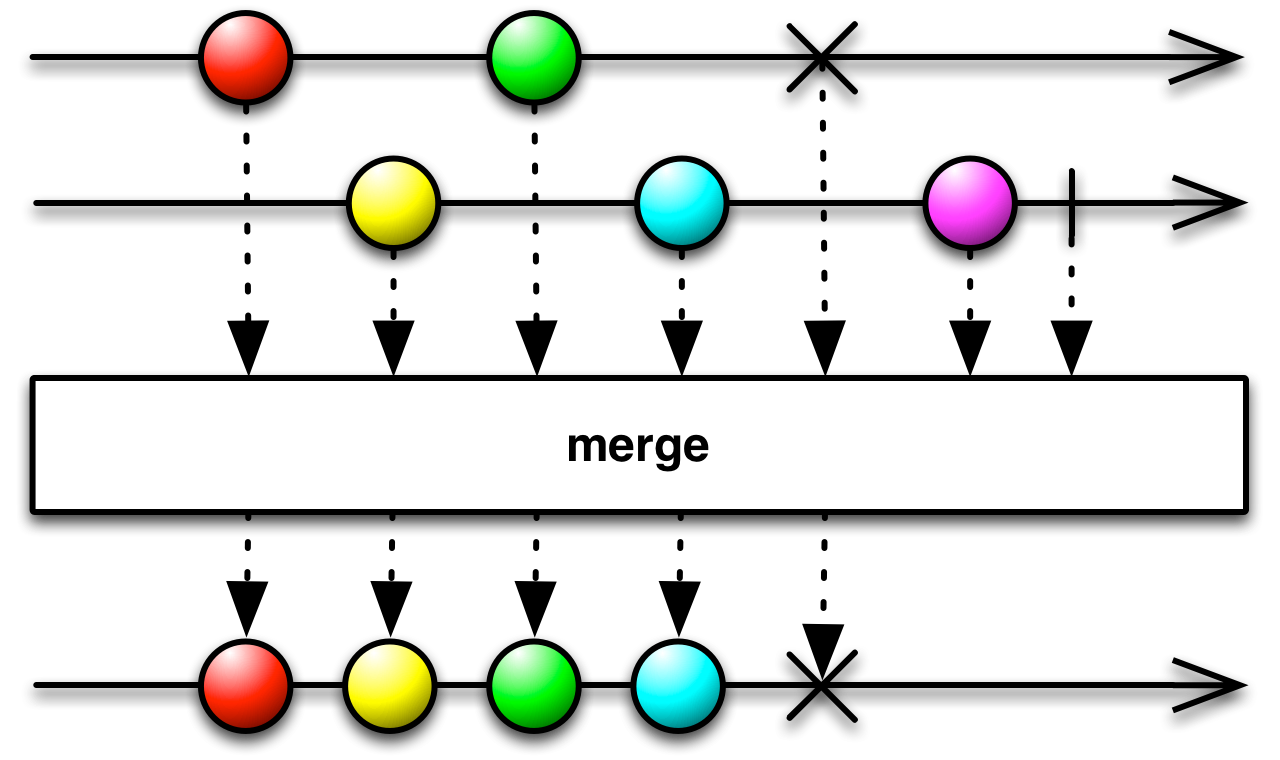
You can combine items emitted by multiple Maybes so that they appear as a single Flowable, by using the
mergeWithmethod.- Backpressure:
- The operator honors backpressure from downstream.
- Scheduler:
mergeWithdoes not operate by default on a particularScheduler.
- Parameters:
other- a MaybeSource to be merged- Returns:
- a new Flowable instance
- See Also:
- ReactiveX operators documentation: Merge
-
observeOn
@CheckReturnValue @NonNull @SchedulerSupport(value="custom") public final Maybe<T> observeOn(Scheduler scheduler)
Wraps a Maybe to emit its item (or notify of its error) on a specifiedScheduler, asynchronously.
- Scheduler:
- you specify which
Schedulerthis operator will use.
- Parameters:
scheduler- theSchedulerto notify subscribers on- Returns:
- the new Maybe instance that its subscribers are notified on the specified
Scheduler - See Also:
- ReactiveX operators documentation: ObserveOn,
RxJava Threading Examples,
subscribeOn(io.reactivex.Scheduler)
-
ofType
@CheckReturnValue @NonNull @SchedulerSupport(value="none") public final <U> Maybe<U> ofType(Class<U> clazz)
Filters the items emitted by a Maybe, only emitting its success value if that is an instance of the supplied Class.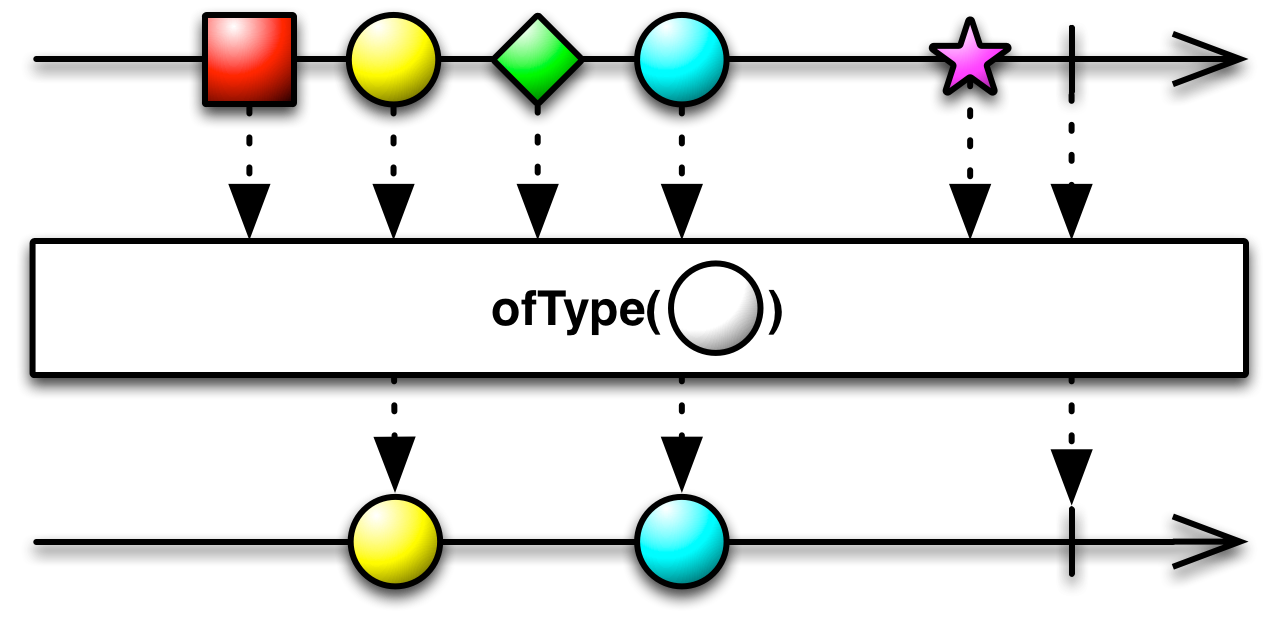
- Scheduler:
ofTypedoes not operate by default on a particularScheduler.
- Type Parameters:
U- the output type- Parameters:
clazz- the class type to filter the items emitted by the source Maybe- Returns:
- the new Maybe instance
- See Also:
- ReactiveX operators documentation: Filter
-
to
@CheckReturnValue @NonNull @SchedulerSupport(value="none") public final <R> R to(Function<? super Maybe<T>,R> convert)
Calls the specified converter function with the current Maybe instance during assembly time and returns its result.- Scheduler:
todoes not operate by default on a particularScheduler.
- Type Parameters:
R- the result type- Parameters:
convert- the function that is called with the current Maybe instance during assembly time that should return some value to be the result- Returns:
- the value returned by the convert function
-
toFlowable
@BackpressureSupport(value=FULL) @CheckReturnValue @SchedulerSupport(value="none") public final Flowable<T> toFlowable()
Converts this Maybe into a backpressure-aware Flowable instance composing cancellation through.- Backpressure:
- The returned Flowable honors the backpressure of the downstream.
- Scheduler:
toFlowabledoes not operate by default on a particularScheduler.
- Returns:
- the new Flowable instance
-
toObservable
@CheckReturnValue @SchedulerSupport(value="none") public final Observable<T> toObservable()
Converts this Maybe into an Observable instance composing disposal through.- Scheduler:
toObservabledoes not operate by default on a particularScheduler.
- Returns:
- the new Observable instance
-
toSingle
@CheckReturnValue @NonNull @SchedulerSupport(value="none") public final Single<T> toSingle(T defaultValue)
Converts this Maybe into a Single instance composing disposal through and turning an empty Maybe into a Single that emits the given value through onSuccess.- Scheduler:
toSingledoes not operate by default on a particularScheduler.
- Parameters:
defaultValue- the default item to signal in Single if this Maybe is empty- Returns:
- the new Single instance
-
toSingle
@CheckReturnValue @SchedulerSupport(value="none") public final Single<T> toSingle()
Converts this Maybe into a Single instance composing disposal through and turning an empty Maybe into a signal of NoSuchElementException.- Scheduler:
toSingledoes not operate by default on a particularScheduler.
- Returns:
- the new Single instance
-
onErrorComplete
@CheckReturnValue @SchedulerSupport(value="none") public final Maybe<T> onErrorComplete()
Returns a Maybe instance that if this Maybe emits an error, it will emit an onComplete and swallow the throwable.- Scheduler:
onErrorCompletedoes not operate by default on a particularScheduler.
- Returns:
- the new Maybe instance
-
onErrorComplete
@CheckReturnValue @NonNull @SchedulerSupport(value="none") public final Maybe<T> onErrorComplete(Predicate<? super Throwable> predicate)
Returns a Maybe instance that if this Maybe emits an error and the predicate returns true, it will emit an onComplete and swallow the throwable.- Scheduler:
onErrorCompletedoes not operate by default on a particularScheduler.
- Parameters:
predicate- the predicate to call when an Throwable is emitted which should return true if the Throwable should be swallowed and replaced with an onComplete.- Returns:
- the new Maybe instance
-
onErrorResumeNext
@CheckReturnValue @NonNull @SchedulerSupport(value="none") public final Maybe<T> onErrorResumeNext(MaybeSource<? extends T> next)
Instructs a Maybe to pass control to anotherMaybeSourcerather than invokingonErrorif it encounters an error.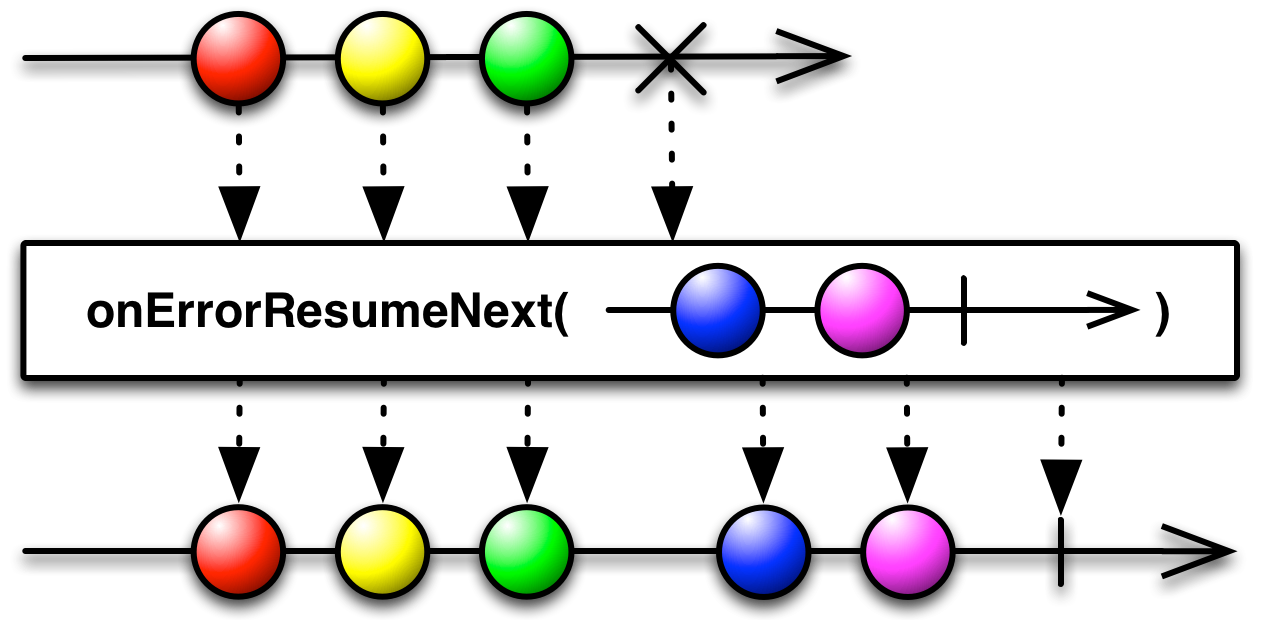
You can use this to prevent errors from propagating or to supply fallback data should errors be encountered.
- Scheduler:
onErrorResumeNextdoes not operate by default on a particularScheduler.
- Parameters:
next- the nextMaybeSourcethat will take over if the source Maybe encounters an error- Returns:
- the new Maybe instance
- See Also:
- ReactiveX operators documentation: Catch
-
onErrorResumeNext
@CheckReturnValue @NonNull @SchedulerSupport(value="none") public final Maybe<T> onErrorResumeNext(Function<? super Throwable,? extends MaybeSource<? extends T>> resumeFunction)
Instructs a Maybe to pass control to another Maybe rather than invokingonErrorif it encounters an error.
You can use this to prevent errors from propagating or to supply fallback data should errors be encountered.
- Scheduler:
onErrorResumeNextdoes not operate by default on a particularScheduler.
- Parameters:
resumeFunction- a function that returns a MaybeSource that will take over if the source Maybe encounters an error- Returns:
- the new Maybe instance
- See Also:
- ReactiveX operators documentation: Catch
-
onErrorReturn
@CheckReturnValue @NonNull @SchedulerSupport(value="none") public final Maybe<T> onErrorReturn(Function<? super Throwable,? extends T> valueSupplier)
Instructs a Maybe to emit an item (returned by a specified function) rather than invokingonErrorif it encounters an error.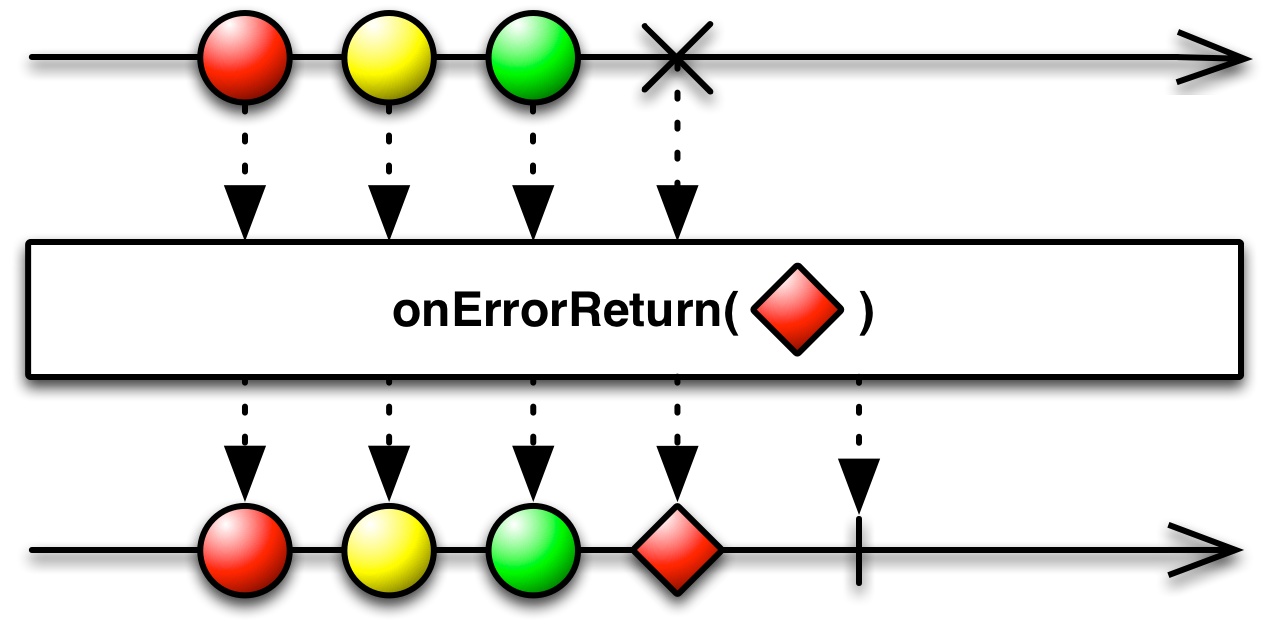
You can use this to prevent errors from propagating or to supply fallback data should errors be encountered.
- Scheduler:
onErrorReturndoes not operate by default on a particularScheduler.
- Parameters:
valueSupplier- a function that returns a single value that will be emitted as success value the current Maybe signals an onError event- Returns:
- the new Maybe instance
- See Also:
- ReactiveX operators documentation: Catch
-
onErrorReturnItem
@CheckReturnValue @NonNull @SchedulerSupport(value="none") public final Maybe<T> onErrorReturnItem(T item)
Instructs a Maybe to emit an item (returned by a specified function) rather than invokingonErrorif it encounters an error.
You can use this to prevent errors from propagating or to supply fallback data should errors be encountered.
- Scheduler:
onErrorReturnItemdoes not operate by default on a particularScheduler.
- Parameters:
item- the value that is emitted as onSuccess in case this Maybe signals an onError- Returns:
- the new Maybe instance
- See Also:
- ReactiveX operators documentation: Catch
-
onExceptionResumeNext
@CheckReturnValue @NonNull @SchedulerSupport(value="none") public final Maybe<T> onExceptionResumeNext(MaybeSource<? extends T> next)
Instructs a Maybe to pass control to another MaybeSource rather than invokingonErrorif it encounters anException.This differs from
onErrorResumeNext(io.reactivex.MaybeSource<? extends T>)in that this one does not handleThrowableorErrorbut lets those continue through.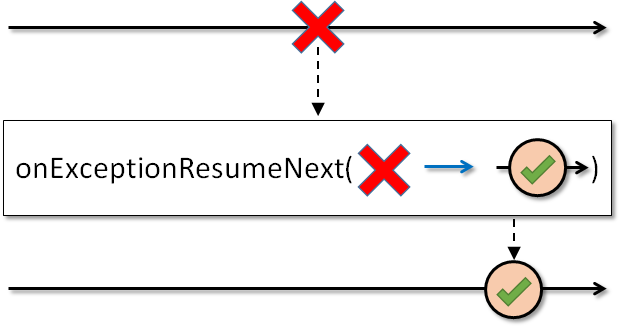
You can use this to prevent exceptions from propagating or to supply fallback data should exceptions be encountered.
- Scheduler:
onExceptionResumeNextdoes not operate by default on a particularScheduler.
- Parameters:
next- the next MaybeSource that will take over if the source Maybe encounters an exception- Returns:
- the new Maybe instance
- See Also:
- ReactiveX operators documentation: Catch
-
onTerminateDetach
@CheckReturnValue @SchedulerSupport(value="none") public final Maybe<T> onTerminateDetach()
Nulls out references to the upstream producer and downstream MaybeObserver if the sequence is terminated or downstream calls dispose().- Scheduler:
onTerminateDetachdoes not operate by default on a particularScheduler.
- Returns:
- a Maybe which nulls out references to the upstream producer and downstream MaybeObserver if the sequence is terminated or downstream calls dispose()
-
repeat
@BackpressureSupport(value=FULL) @CheckReturnValue @SchedulerSupport(value="none") public final Flowable<T> repeat()
Returns a Flowable that repeats the sequence of items emitted by the source Maybe indefinitely.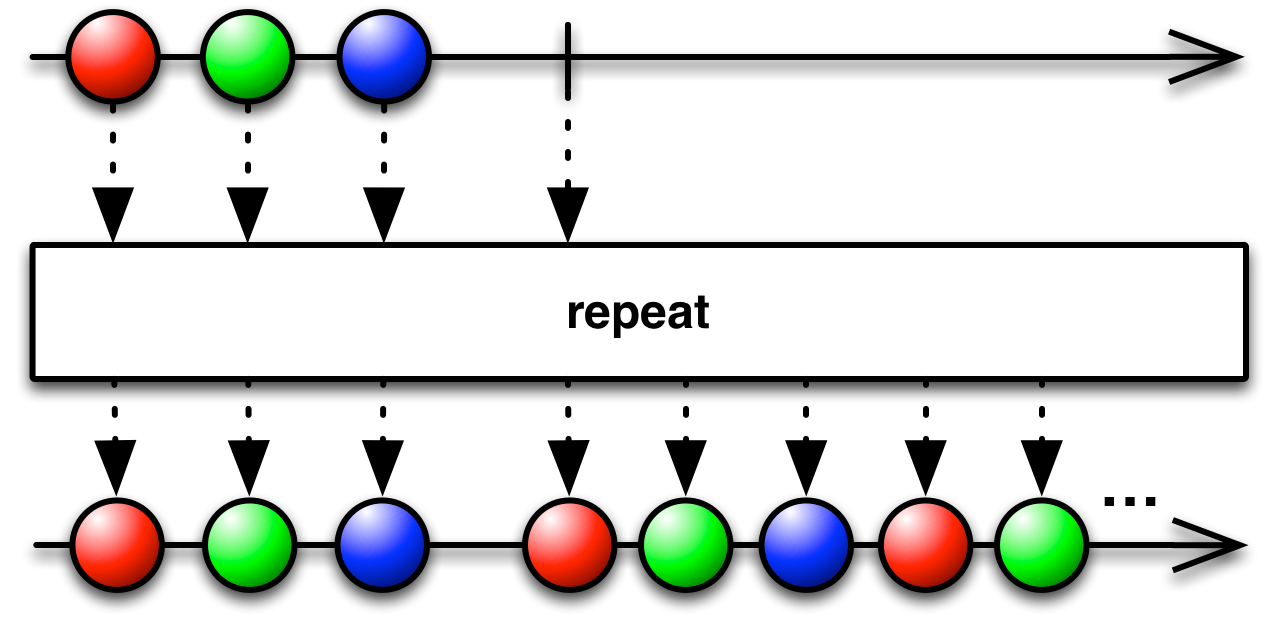
- Backpressure:
- The operator honors downstream backpressure.
- Scheduler:
repeatdoes not operate by default on a particularScheduler.
- Returns:
- a Flowable that emits the items emitted by the source Maybe repeatedly and in sequence
- See Also:
- ReactiveX operators documentation: Repeat
-
repeat
@BackpressureSupport(value=FULL) @CheckReturnValue @SchedulerSupport(value="none") public final Flowable<T> repeat(long times)
Returns a Flowable that repeats the sequence of items emitted by the source Maybe at mostcounttimes.
- Backpressure:
- This operator honors downstream backpressure.
- Scheduler:
repeatdoes not operate by default on a particularScheduler.
- Parameters:
times- the number of times the source Maybe items are repeated, a count of 0 will yield an empty sequence- Returns:
- a Flowable that repeats the sequence of items emitted by the source Maybe at most
counttimes - Throws:
IllegalArgumentException- ifcountis less than zero- See Also:
- ReactiveX operators documentation: Repeat
-
repeatUntil
@BackpressureSupport(value=FULL) @CheckReturnValue @SchedulerSupport(value="none") public final Flowable<T> repeatUntil(BooleanSupplier stop)
Returns a Flowable that repeats the sequence of items emitted by the source Maybe until the provided stop function returns true.
- Backpressure:
- This operator honors downstream backpressure.
- Scheduler:
repeatUntildoes not operate by default on a particularScheduler.
- Parameters:
stop- a boolean supplier that is called when the current Flowable completes and unless it returns false, the current Flowable is resubscribed- Returns:
- the new Flowable instance
- Throws:
NullPointerException- ifstopis null- See Also:
- ReactiveX operators documentation: Repeat
-
repeatWhen
@BackpressureSupport(value=FULL) @CheckReturnValue @SchedulerSupport(value="none") public final Flowable<T> repeatWhen(Function<? super Flowable<Object>,? extends Publisher<?>> handler)
Returns a Flowable that emits the same values as the source Publisher with the exception of anonComplete. AnonCompletenotification from the source will result in the emission of avoiditem to the Publisher provided as an argument to thenotificationHandlerfunction. If that Publisher callsonCompleteoronErrorthenrepeatWhenwill callonCompleteoronErroron the child subscription. Otherwise, this Publisher will resubscribe to the source Publisher.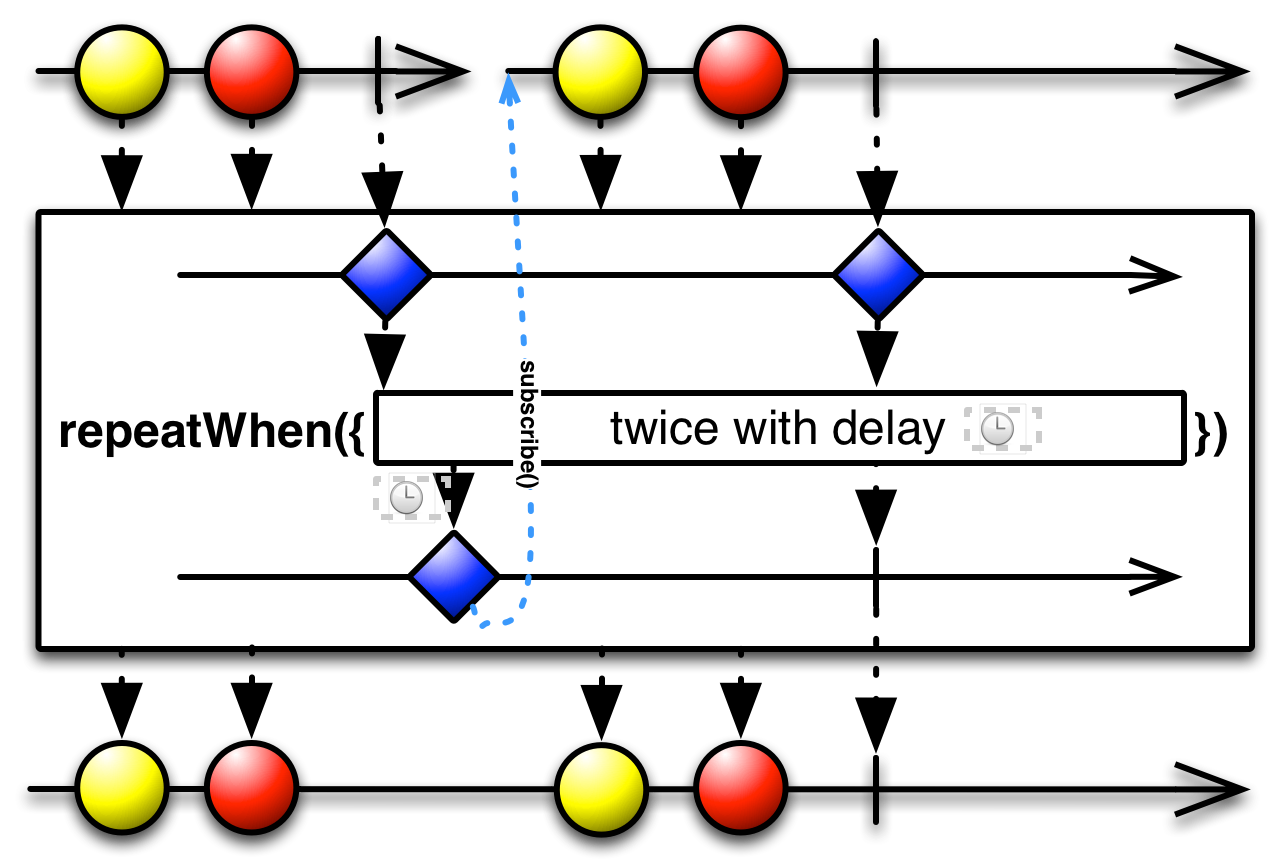
- Backpressure:
- The operator honors downstream backpressure and expects the source
Publisherto honor backpressure as well. If this expectation is violated, the operator may throw anIllegalStateException. - Scheduler:
repeatWhendoes not operate by default on a particularScheduler.
- Parameters:
handler- receives a Publisher of notifications with which a user can complete or error, aborting the repeat.- Returns:
- the source Publisher modified with repeat logic
- See Also:
- ReactiveX operators documentation: Repeat
-
retry
@CheckReturnValue @SchedulerSupport(value="none") public final Maybe<T> retry()
Returns a Maybe that mirrors the source Maybe, resubscribing to it if it callsonError(infinite retry count).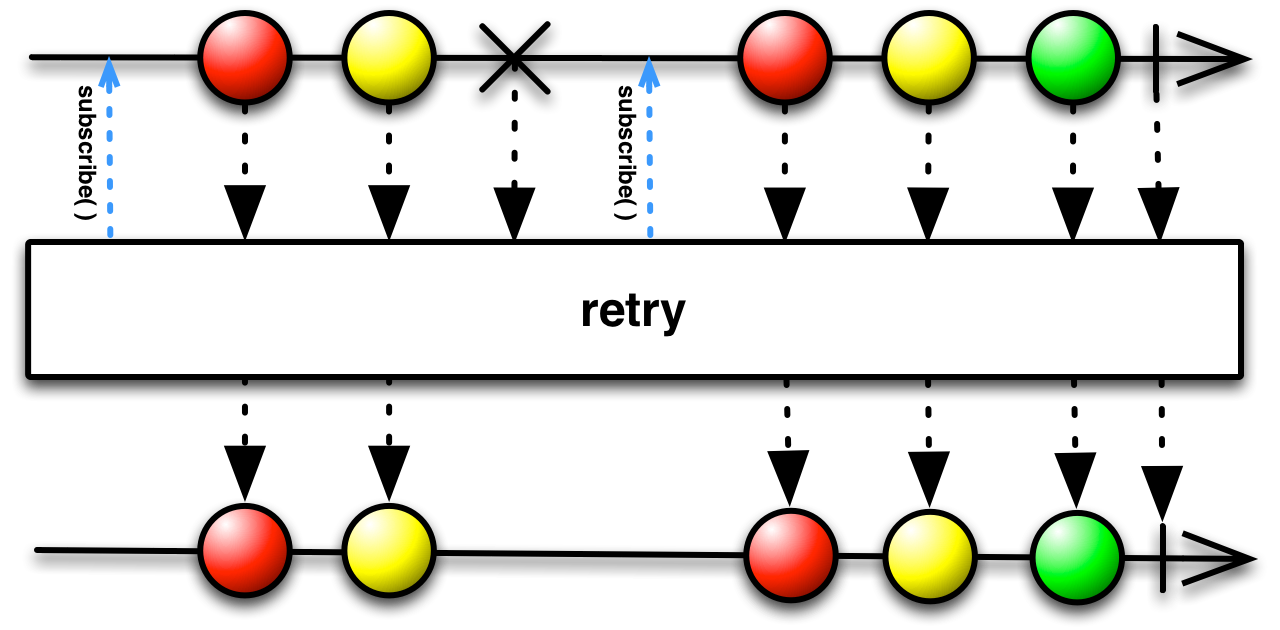
If the source Maybe calls
MaybeObserver.onError(java.lang.Throwable), this method will resubscribe to the source Maybe rather than propagating theonErrorcall.- Scheduler:
retrydoes not operate by default on a particularScheduler.
- Returns:
- the new Maybe instance
- See Also:
- ReactiveX operators documentation: Retry
-
retry
@CheckReturnValue @SchedulerSupport(value="none") public final Maybe<T> retry(BiPredicate<? super Integer,? super Throwable> predicate)
Returns a Maybe that mirrors the source Maybe, resubscribing to it if it callsonErrorand the predicate returns true for that specific exception and retry count.
- Scheduler:
retrydoes not operate by default on a particularScheduler.
- Parameters:
predicate- the predicate that determines if a resubscription may happen in case of a specific exception and retry count- Returns:
- the new Maybe instance
- See Also:
retry(), ReactiveX operators documentation: Retry
-
retry
@CheckReturnValue @SchedulerSupport(value="none") public final Maybe<T> retry(long count)
Returns a Maybe that mirrors the source Maybe, resubscribing to it if it callsonErrorup to a specified number of retries.
If the source Maybe calls
MaybeObserver.onError(java.lang.Throwable), this method will resubscribe to the source Maybe for a maximum ofcountresubscriptions rather than propagating theonErrorcall.- Scheduler:
retrydoes not operate by default on a particularScheduler.
- Parameters:
count- the number of times to resubscribe if the current Maybe fails- Returns:
- the new Maybe instance
- See Also:
- ReactiveX operators documentation: Retry
-
retry
@CheckReturnValue @SchedulerSupport(value="none") public final Maybe<T> retry(long times, Predicate<? super Throwable> predicate)
Retries at most times or until the predicate returns false, whichever happens first.- Scheduler:
retrydoes not operate by default on a particularScheduler.
- Parameters:
times- the number of times to resubscribe if the current Maybe failspredicate- the predicate called with the failure Throwable and should return true to trigger a retry.- Returns:
- the new Maybe instance
-
retry
@CheckReturnValue @SchedulerSupport(value="none") public final Maybe<T> retry(Predicate<? super Throwable> predicate)
Retries the current Maybe if it fails and the predicate returns true.- Scheduler:
retrydoes not operate by default on a particularScheduler.
- Parameters:
predicate- the predicate that receives the failure Throwable and should return true to trigger a retry.- Returns:
- the new Maybe instance
-
retryUntil
@CheckReturnValue @NonNull @SchedulerSupport(value="none") public final Maybe<T> retryUntil(BooleanSupplier stop)
Retries until the given stop function returns true.- Scheduler:
retryUntildoes not operate by default on a particularScheduler.
- Parameters:
stop- the function that should return true to stop retrying- Returns:
- the new Maybe instance
-
retryWhen
@CheckReturnValue @SchedulerSupport(value="none") public final Maybe<T> retryWhen(Function<? super Flowable<Throwable>,? extends Publisher<?>> handler)
Returns a Maybe that emits the same values as the source Maybe with the exception of anonError. AnonErrornotification from the source will result in the emission of aThrowableitem to the Publisher provided as an argument to thenotificationHandlerfunction. If that Publisher callsonCompleteoronErrorthenretrywill callonCompleteoronErroron the child subscription. Otherwise, this Publisher will resubscribe to the source Publisher.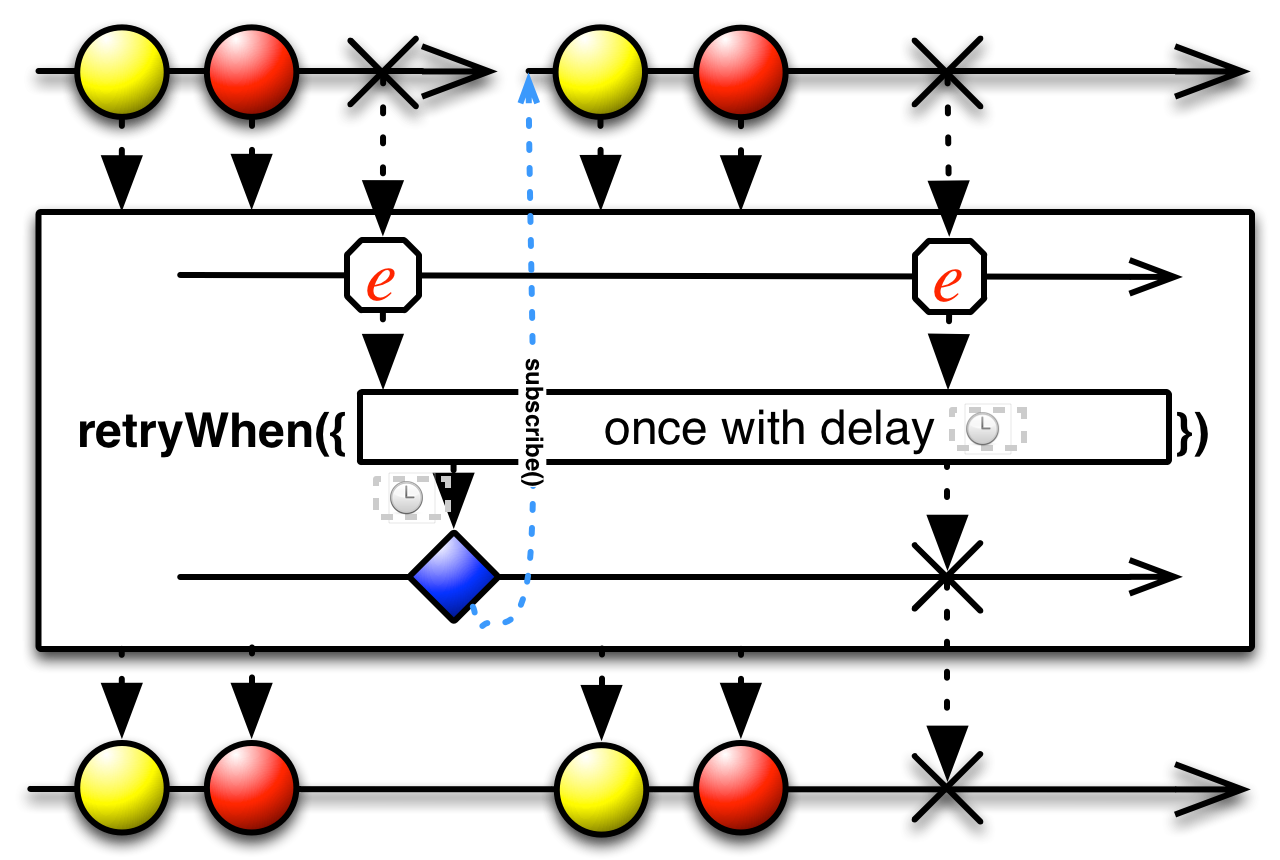
Example: This retries 3 times, each time incrementing the number of seconds it waits.
Output is:Maybe.create((MaybeEmitter<? super String> s) -> { System.out.println("subscribing"); s.onError(new RuntimeException("always fails")); }, BackpressureStrategy.BUFFER).retryWhen(attempts -> { return attempts.zipWith(Publisher.range(1, 3), (n, i) -> i).flatMap(i -> { System.out.println("delay retry by " + i + " second(s)"); return Flowable.timer(i, TimeUnit.SECONDS); }); }).blockingForEach(System.out::println);subscribing delay retry by 1 second(s) subscribing delay retry by 2 second(s) subscribing delay retry by 3 second(s) subscribingNote that the inner
Publisherreturned by the handler function should signal eitheronNext,onErrororonCompletein response to the receivedThrowableto indicate the operator should retry or terminate. If the upstream to the operator is asynchronous, signalling onNext followed by onComplete immediately may result in the sequence to be completed immediately. Similarly, if this innerPublishersignalsonErrororonCompletewhile the upstream is active, the sequence is terminated with the same signal immediately.The following example demonstrates how to retry an asynchronous source with a delay:
Maybe.timer(1, TimeUnit.SECONDS) .doOnSubscribe(s -> System.out.println("subscribing")) .map(v -> { throw new RuntimeException(); }) .retryWhen(errors -> { AtomicInteger counter = new AtomicInteger(); return errors .takeWhile(e -> counter.getAndIncrement() != 3) .flatMap(e -> { System.out.println("delay retry by " + counter.get() + " second(s)"); return Flowable.timer(counter.get(), TimeUnit.SECONDS); }); }) .blockingGet();- Scheduler:
retryWhendoes not operate by default on a particularScheduler.
- Parameters:
handler- receives a Publisher of notifications with which a user can complete or error, aborting the retry- Returns:
- the new Maybe instance
- See Also:
- ReactiveX operators documentation: Retry
-
subscribe
@SchedulerSupport(value="none") public final Disposable subscribe()
Subscribes to a Maybe and ignoresonSuccessandonCompleteemissions.If the Maybe emits an error, it is wrapped into an
OnErrorNotImplementedExceptionand routed to the RxJavaPlugins.onError handler.- Scheduler:
subscribedoes not operate by default on a particularScheduler.
- Returns:
- a
Disposablereference with which the caller can stop receiving items before the Maybe has finished sending them - See Also:
- ReactiveX operators documentation: Subscribe
-
subscribe
@CheckReturnValue @SchedulerSupport(value="none") public final Disposable subscribe(Consumer<? super T> onSuccess)
Subscribes to a Maybe and provides a callback to handle the items it emits.If the Maybe emits an error, it is wrapped into an
OnErrorNotImplementedExceptionand routed to the RxJavaPlugins.onError handler.- Scheduler:
subscribedoes not operate by default on a particularScheduler.
- Parameters:
onSuccess- theConsumer<T>you have designed to accept a success value from the Maybe- Returns:
- a
Disposablereference with which the caller can stop receiving items before the Maybe has finished sending them - Throws:
NullPointerException- ifonSuccessis null- See Also:
- ReactiveX operators documentation: Subscribe
-
subscribe
@CheckReturnValue @SchedulerSupport(value="none") public final Disposable subscribe(Consumer<? super T> onSuccess, Consumer<? super Throwable> onError)
Subscribes to a Maybe and provides callbacks to handle the items it emits and any error notification it issues.- Scheduler:
subscribedoes not operate by default on a particularScheduler.
- Parameters:
onSuccess- theConsumer<T>you have designed to accept a success value from the MaybeonError- theConsumer<Throwable>you have designed to accept any error notification from the Maybe- Returns:
- a
Disposablereference with which the caller can stop receiving items before the Maybe has finished sending them - Throws:
NullPointerException- ifonSuccessis null, or ifonErroris null- See Also:
- ReactiveX operators documentation: Subscribe
-
subscribe
@CheckReturnValue @NonNull @SchedulerSupport(value="none") public final Disposable subscribe(Consumer<? super T> onSuccess, Consumer<? super Throwable> onError, Action onComplete)
Subscribes to a Maybe and provides callbacks to handle the items it emits and any error or completion notification it issues.- Scheduler:
subscribedoes not operate by default on a particularScheduler.
- Parameters:
onSuccess- theConsumer<T>you have designed to accept a success value from the MaybeonError- theConsumer<Throwable>you have designed to accept any error notification from the MaybeonComplete- theActionyou have designed to accept a completion notification from the Maybe- Returns:
- a
Disposablereference with which the caller can stop receiving items before the Maybe has finished sending them - Throws:
NullPointerException- ifonSuccessis null, or ifonErroris null, or ifonCompleteis null- See Also:
- ReactiveX operators documentation: Subscribe
-
subscribe
@SchedulerSupport(value="none") public final void subscribe(MaybeObserver<? super T> observer)
Description copied from interface:MaybeSourceSubscribes the given MaybeObserver to this MaybeSource instance.- Specified by:
subscribein interfaceMaybeSource<T>- Parameters:
observer- the MaybeObserver, not null
-
subscribeActual
protected abstract void subscribeActual(MaybeObserver<? super T> observer)
Implement this method in subclasses to handle the incomingMaybeObservers.There is no need to call any of the plugin hooks on the current
Maybeinstance or theMaybeObserver; all hooks and basic safeguards have been applied bysubscribe(MaybeObserver)before this method gets called.- Parameters:
observer- the MaybeObserver to handle, not null
-
subscribeOn
@CheckReturnValue @NonNull @SchedulerSupport(value="custom") public final Maybe<T> subscribeOn(Scheduler scheduler)
Asynchronously subscribes subscribers to this Maybe on the specifiedScheduler.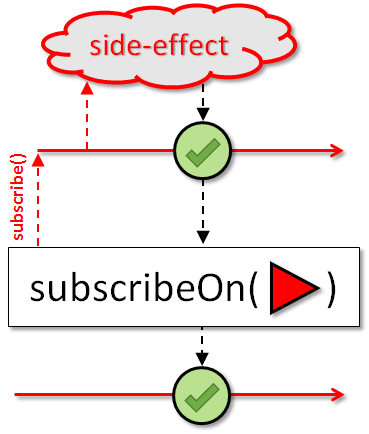
- Scheduler:
- you specify which
Schedulerthis operator will use.
- Parameters:
scheduler- theSchedulerto perform subscription actions on- Returns:
- the new Maybe instance that its subscriptions happen on the specified
Scheduler - See Also:
- ReactiveX operators documentation: SubscribeOn,
RxJava Threading Examples,
observeOn(io.reactivex.Scheduler)
-
subscribeWith
@CheckReturnValue @SchedulerSupport(value="none") public final <E extends MaybeObserver<? super T>> E subscribeWith(E observer)
Subscribes a given MaybeObserver (subclass) to this Maybe and returns the given MaybeObserver as is.Usage example:
Maybe<Integer> source = Maybe.just(1); CompositeDisposable composite = new CompositeDisposable(); DisposableMaybeObserver<Integer> ds = new DisposableMaybeObserver<>() { // ... }; composite.add(source.subscribeWith(ds));- Scheduler:
subscribeWithdoes not operate by default on a particularScheduler.
- Type Parameters:
E- the type of the MaybeObserver to use and return- Parameters:
observer- the MaybeObserver (subclass) to use and return, not null- Returns:
- the input
subscriber - Throws:
NullPointerException- ifsubscriberis null
-
switchIfEmpty
@CheckReturnValue @NonNull @SchedulerSupport(value="none") public final Maybe<T> switchIfEmpty(MaybeSource<? extends T> other)
Returns a Maybe that emits the items emitted by the source Maybe or the items of an alternate MaybeSource if the current Maybe is empty.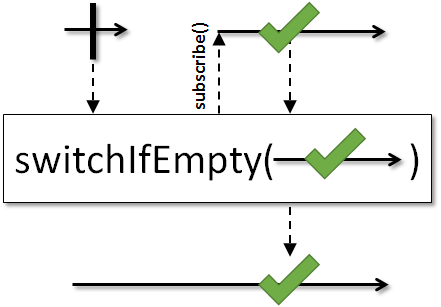
- Scheduler:
switchIfEmptydoes not operate by default on a particularScheduler.
- Parameters:
other- the alternate MaybeSource to subscribe to if the main does not emit any items- Returns:
- a Maybe that emits the items emitted by the source Maybe or the items of an alternate MaybeSource if the source Maybe is empty.
-
switchIfEmpty
@CheckReturnValue @NonNull @SchedulerSupport(value="none") public final Single<T> switchIfEmpty(SingleSource<? extends T> other)
Returns a Single that emits the items emitted by the source Maybe or the item of an alternate SingleSource if the current Maybe is empty.
- Scheduler:
switchIfEmptydoes not operate by default on a particularScheduler.
History: 2.1.4 - experimental
- Parameters:
other- the alternate SingleSource to subscribe to if the main does not emit any items- Returns:
- a Single that emits the items emitted by the source Maybe or the item of an alternate SingleSource if the source Maybe is empty.
- Since:
- 2.2
-
takeUntil
@CheckReturnValue @NonNull @SchedulerSupport(value="none") public final <U> Maybe<T> takeUntil(MaybeSource<U> other)
Returns a Maybe that emits the items emitted by the source Maybe until a second MaybeSource emits an item.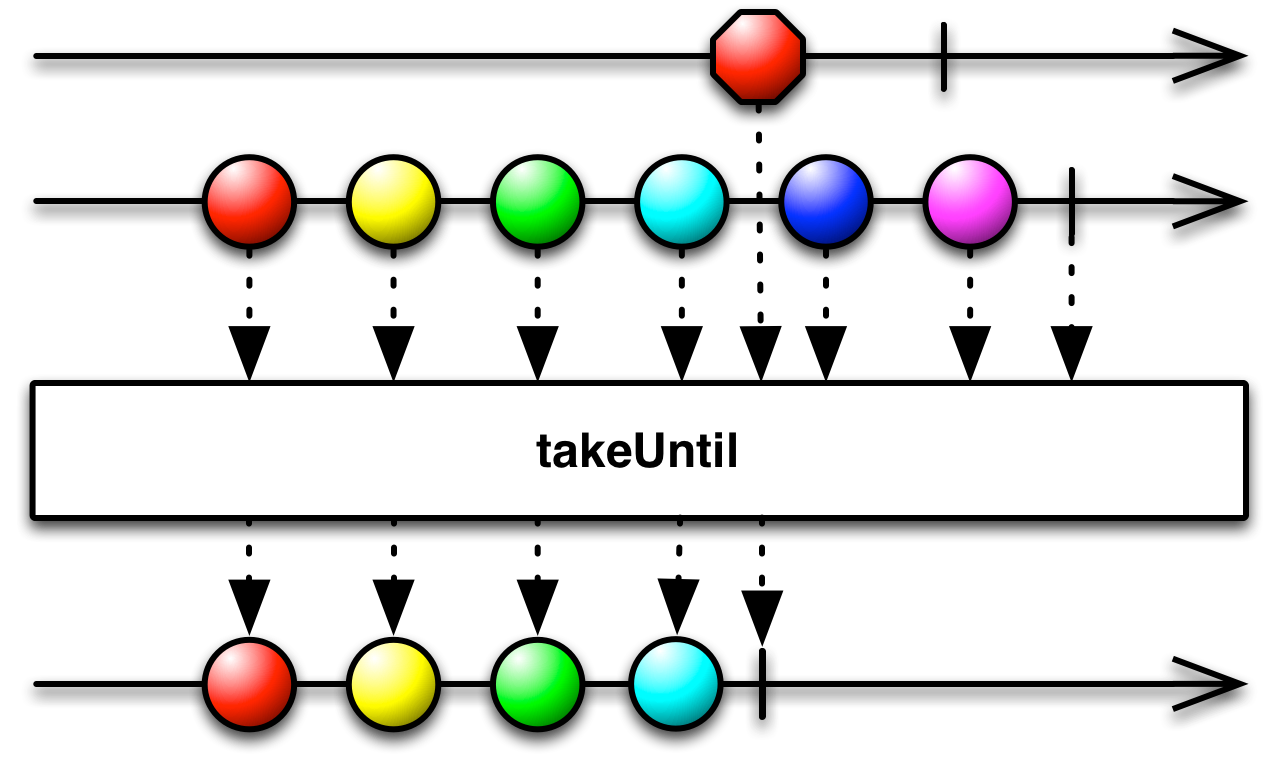
- Scheduler:
takeUntildoes not operate by default on a particularScheduler.
- Type Parameters:
U- the type of items emitted byother- Parameters:
other- the MaybeSource whose first emitted item will causetakeUntilto stop emitting items from the source Maybe- Returns:
- a Maybe that emits the items emitted by the source Maybe until such time as
otheremits its first item - See Also:
- ReactiveX operators documentation: TakeUntil
-
takeUntil
@BackpressureSupport(value=UNBOUNDED_IN) @CheckReturnValue @NonNull @SchedulerSupport(value="none") public final <U> Maybe<T> takeUntil(Publisher<U> other)
Returns a Maybe that emits the item emitted by the source Maybe until a second Publisher emits an item.
- Backpressure:
- The
Publisheris consumed in an unbounded fashion and is cancelled after the first item emitted. - Scheduler:
takeUntildoes not operate by default on a particularScheduler.
- Type Parameters:
U- the type of items emitted byother- Parameters:
other- the Publisher whose first emitted item will causetakeUntilto stop emitting items from the source Publisher- Returns:
- a Maybe that emits the items emitted by the source Maybe until such time as
otheremits its first item - See Also:
- ReactiveX operators documentation: TakeUntil
-
timeout
@CheckReturnValue @SchedulerSupport(value="io.reactivex:computation") public final Maybe<T> timeout(long timeout, TimeUnit timeUnit)
Returns a Maybe that mirrors the source Maybe but applies a timeout policy for each emitted item. If the next item isn't emitted within the specified timeout duration starting from its predecessor, the resulting Maybe terminates and notifies MaybeObservers of aTimeoutException.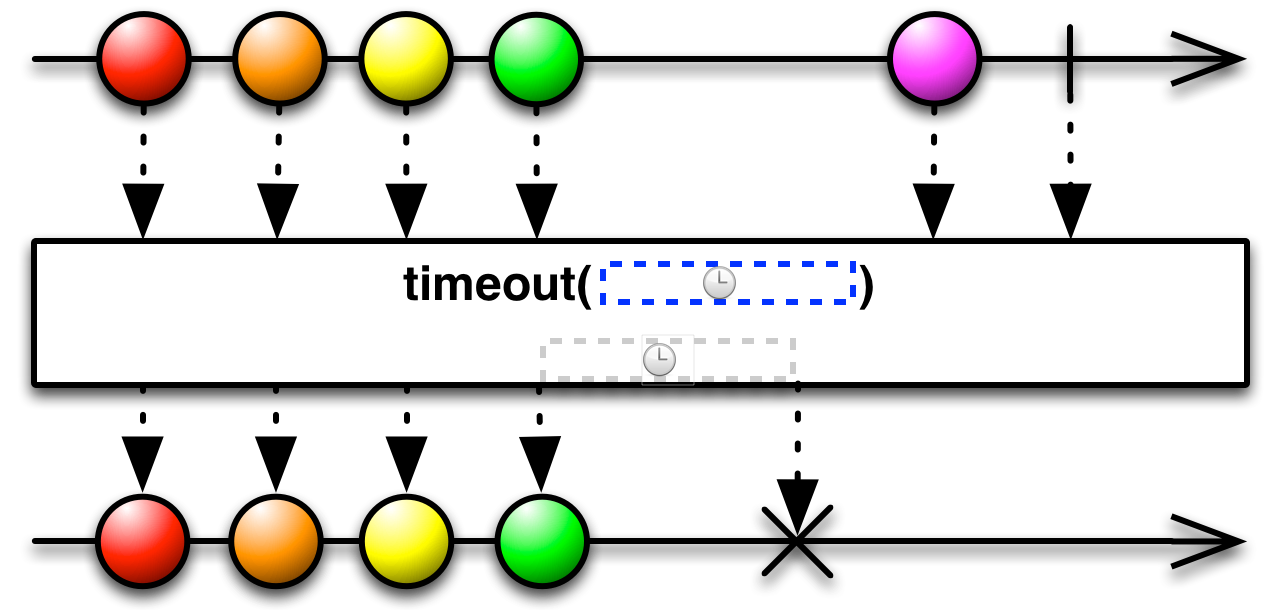
- Scheduler:
- This version of
timeoutoperates by default on thecomputationScheduler.
- Parameters:
timeout- maximum duration between emitted items before a timeout occurstimeUnit- the unit of time that applies to thetimeoutargument.- Returns:
- the new Maybe instance
- See Also:
- ReactiveX operators documentation: Timeout
-
timeout
@CheckReturnValue @NonNull @SchedulerSupport(value="io.reactivex:computation") public final Maybe<T> timeout(long timeout, TimeUnit timeUnit, MaybeSource<? extends T> fallback)
Returns a Maybe that mirrors the source Maybe but applies a timeout policy for each emitted item. If the next item isn't emitted within the specified timeout duration starting from its predecessor, the source MaybeSource is disposed and resulting Maybe begins instead to mirror a fallback MaybeSource.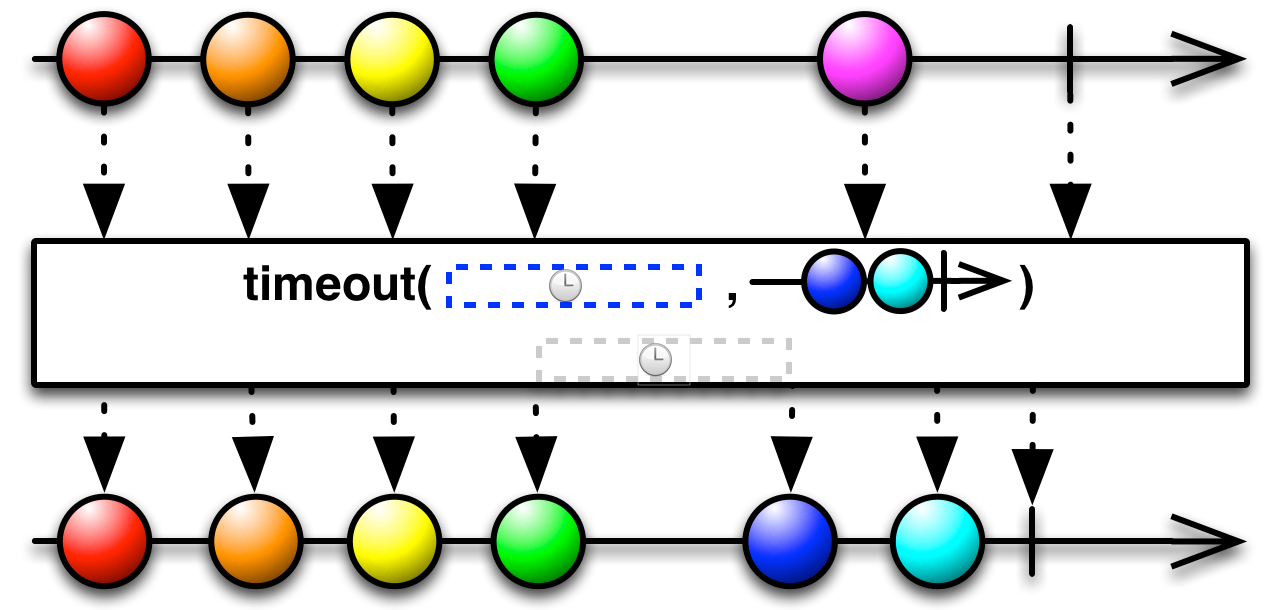
- Scheduler:
- This version of
timeoutoperates by default on thecomputationScheduler.
- Parameters:
timeout- maximum duration between items before a timeout occurstimeUnit- the unit of time that applies to thetimeoutargumentfallback- the fallback MaybeSource to use in case of a timeout- Returns:
- the new Maybe instance
- See Also:
- ReactiveX operators documentation: Timeout
-
timeout
@CheckReturnValue @NonNull @SchedulerSupport(value="custom") public final Maybe<T> timeout(long timeout, TimeUnit timeUnit, Scheduler scheduler, MaybeSource<? extends T> fallback)
Returns a Maybe that mirrors the source Maybe but applies a timeout policy for each emitted item using a specified Scheduler. If the next item isn't emitted within the specified timeout duration starting from its predecessor, the source MaybeSource is disposed and resulting Maybe begins instead to mirror a fallback MaybeSource.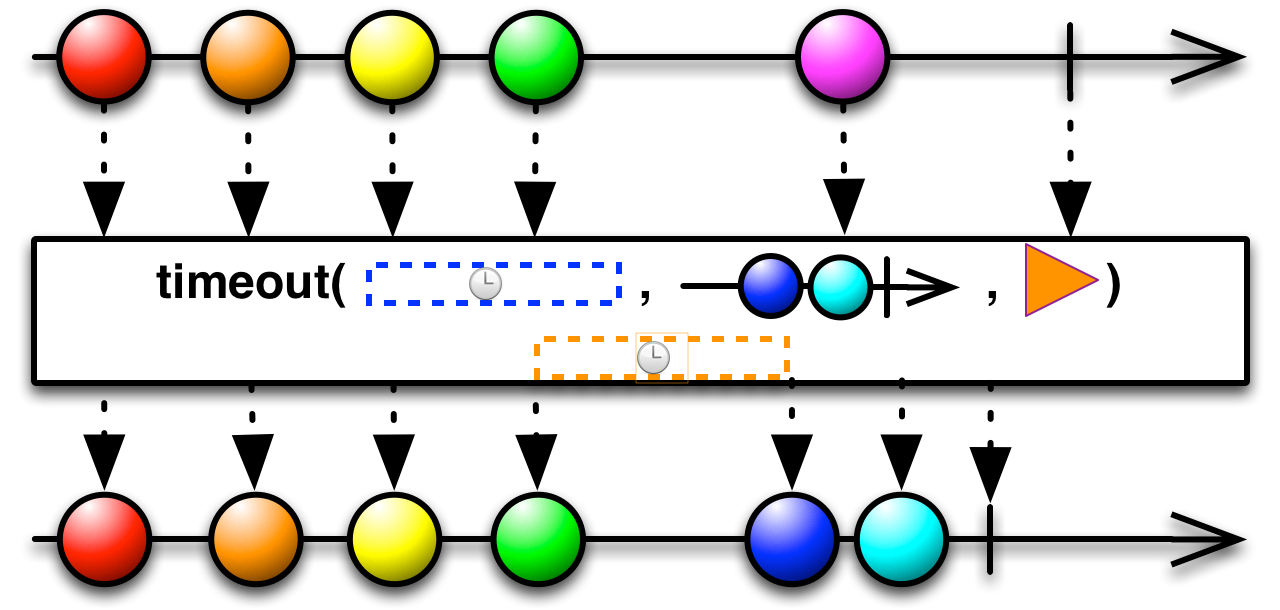
- Scheduler:
- You specify which
Schedulerthis operator will use.
- Parameters:
timeout- maximum duration between items before a timeout occurstimeUnit- the unit of time that applies to thetimeoutargumentfallback- the MaybeSource to use as the fallback in case of a timeoutscheduler- theSchedulerto run the timeout timers on- Returns:
- the new Maybe instance
- See Also:
- ReactiveX operators documentation: Timeout
-
timeout
@CheckReturnValue @SchedulerSupport(value="custom") public final Maybe<T> timeout(long timeout, TimeUnit timeUnit, Scheduler scheduler)
Returns a Maybe that mirrors the source Maybe but applies a timeout policy for each emitted item, where this policy is governed on a specified Scheduler. If the next item isn't emitted within the specified timeout duration starting from its predecessor, the resulting Maybe terminates and notifies MaybeObservers of aTimeoutException.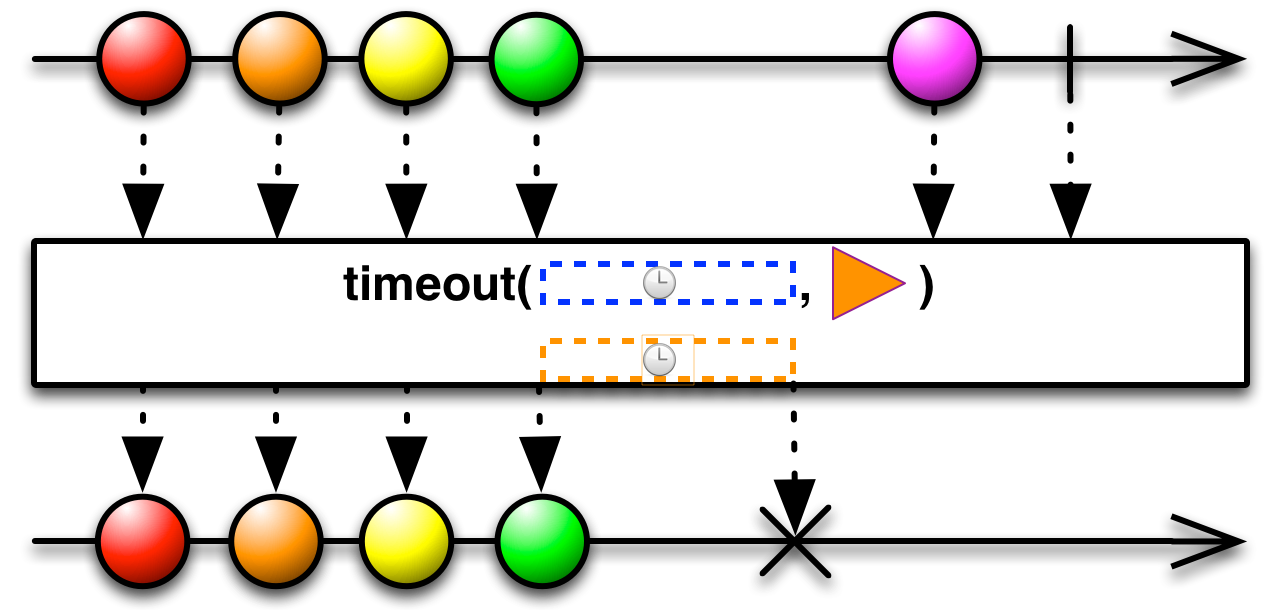
- Scheduler:
- You specify which
Schedulerthis operator will use.
- Parameters:
timeout- maximum duration between items before a timeout occurstimeUnit- the unit of time that applies to thetimeoutargumentscheduler- the Scheduler to run the timeout timers on- Returns:
- the new Maybe instance
- See Also:
- ReactiveX operators documentation: Timeout
-
timeout
@CheckReturnValue @NonNull @SchedulerSupport(value="none") public final <U> Maybe<T> timeout(MaybeSource<U> timeoutIndicator)
If the currentMaybedidn't signal an event before thetimeoutIndicatorMaybeSourcesignals, aTimeoutExceptionis signaled instead.- Scheduler:
timeoutdoes not operate by default on a particularScheduler.
- Type Parameters:
U- the value type of the- Parameters:
timeoutIndicator- theMaybeSourcethat indicates the timeout by signaling onSuccess or onComplete.- Returns:
- the new Maybe instance
-
timeout
@CheckReturnValue @NonNull @SchedulerSupport(value="none") public final <U> Maybe<T> timeout(MaybeSource<U> timeoutIndicator, MaybeSource<? extends T> fallback)
If the currentMaybedidn't signal an event before thetimeoutIndicatorMaybeSourcesignals, the currentMaybeis disposed and thefallbackMaybeSourcesubscribed to as a continuation.- Scheduler:
timeoutdoes not operate by default on a particularScheduler.
- Type Parameters:
U- the value type of the- Parameters:
timeoutIndicator- theMaybeSourcethat indicates the timeout by signalingonSuccessoronComplete.fallback- theMaybeSourcethat is subscribed to if the currentMaybetimes out- Returns:
- the new Maybe instance
-
timeout
@BackpressureSupport(value=UNBOUNDED_IN) @CheckReturnValue @NonNull @SchedulerSupport(value="none") public final <U> Maybe<T> timeout(Publisher<U> timeoutIndicator)
If the currentMaybesource didn't signal an event before thetimeoutIndicatorPublishersignals, aTimeoutExceptionis signaled instead.- Type Parameters:
U- the value type of the- Parameters:
timeoutIndicator- theMaybeSourcethat indicates the timeout by signalingonSuccessoronComplete.- Returns:
- the new Maybe instance
-
timeout
@BackpressureSupport(value=UNBOUNDED_IN) @CheckReturnValue @NonNull @SchedulerSupport(value="none") public final <U> Maybe<T> timeout(Publisher<U> timeoutIndicator, MaybeSource<? extends T> fallback)
If the currentMaybedidn't signal an event before thetimeoutIndicatorPublishersignals, the currentMaybeis disposed and thefallbackMaybeSourcesubscribed to as a continuation.- Type Parameters:
U- the value type of the- Parameters:
timeoutIndicator- theMaybeSourcethat indicates the timeout by signalingonSuccessoronCompletefallback- theMaybeSourcethat is subscribed to if the currentMaybetimes out- Returns:
- the new Maybe instance
-
unsubscribeOn
@CheckReturnValue @NonNull @SchedulerSupport(value="custom") public final Maybe<T> unsubscribeOn(Scheduler scheduler)
Returns a Maybe which makes sure when a MaybeObserver disposes the Disposable, that call is propagated up on the specified scheduler.- Scheduler:
unsubscribeOncalls dispose() of the upstream on theScheduleryou specify.
- Parameters:
scheduler- the target scheduler where to execute the disposal- Returns:
- the new Maybe instance
- Throws:
NullPointerException- if scheduler is null
-
zipWith
@CheckReturnValue @NonNull @SchedulerSupport(value="none") public final <U,R> Maybe<R> zipWith(MaybeSource<? extends U> other, BiFunction<? super T,? super U,? extends R> zipper)
Waits until this and the other MaybeSource signal a success value then applies the given BiFunction to those values and emits the BiFunction's resulting value to downstream.
If either this or the other MaybeSource is empty or signals an error, the resulting Maybe will terminate immediately and dispose the other source.
- Scheduler:
zipWithdoes not operate by default on a particularScheduler.
- Type Parameters:
U- the type of items emitted by theotherMaybeSourceR- the type of items emitted by the resulting Maybe- Parameters:
other- the other MaybeSourcezipper- a function that combines the pairs of items from the two MaybeSources to generate the items to be emitted by the resulting Maybe- Returns:
- the new Maybe instance
- See Also:
- ReactiveX operators documentation: Zip
-
test
@CheckReturnValue @SchedulerSupport(value="none") public final TestObserver<T> test()
Creates a TestObserver and subscribes it to this Maybe.- Scheduler:
testdoes not operate by default on a particularScheduler.
- Returns:
- the new TestObserver instance
-
test
@CheckReturnValue @SchedulerSupport(value="none") public final TestObserver<T> test(boolean cancelled)
Creates a TestObserver optionally in cancelled state, then subscribes it to this Maybe.- Scheduler:
testdoes not operate by default on a particularScheduler.
- Parameters:
cancelled- if true, the TestObserver will be cancelled before subscribing to this Maybe.- Returns:
- the new TestObserver instance
-
-